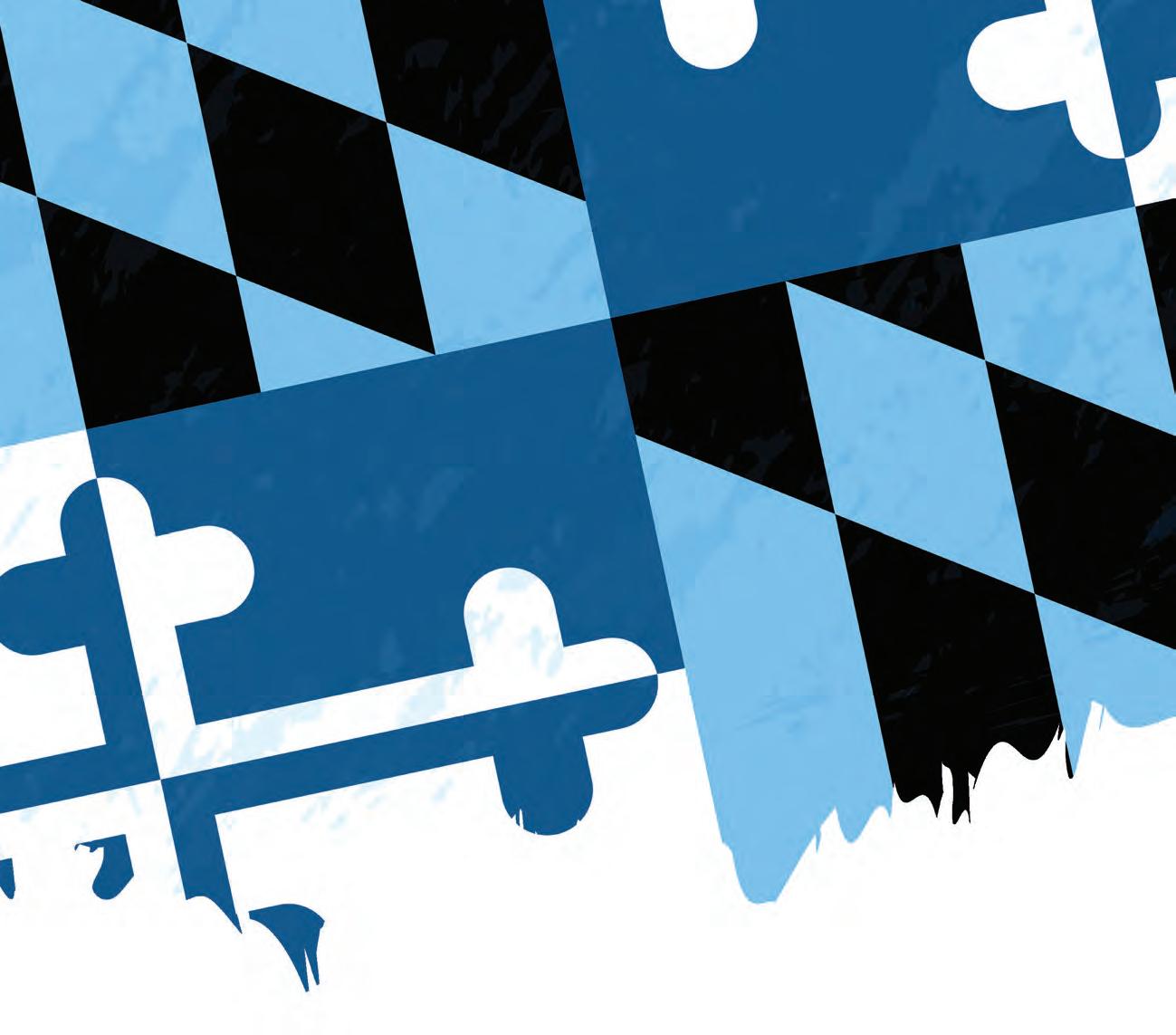
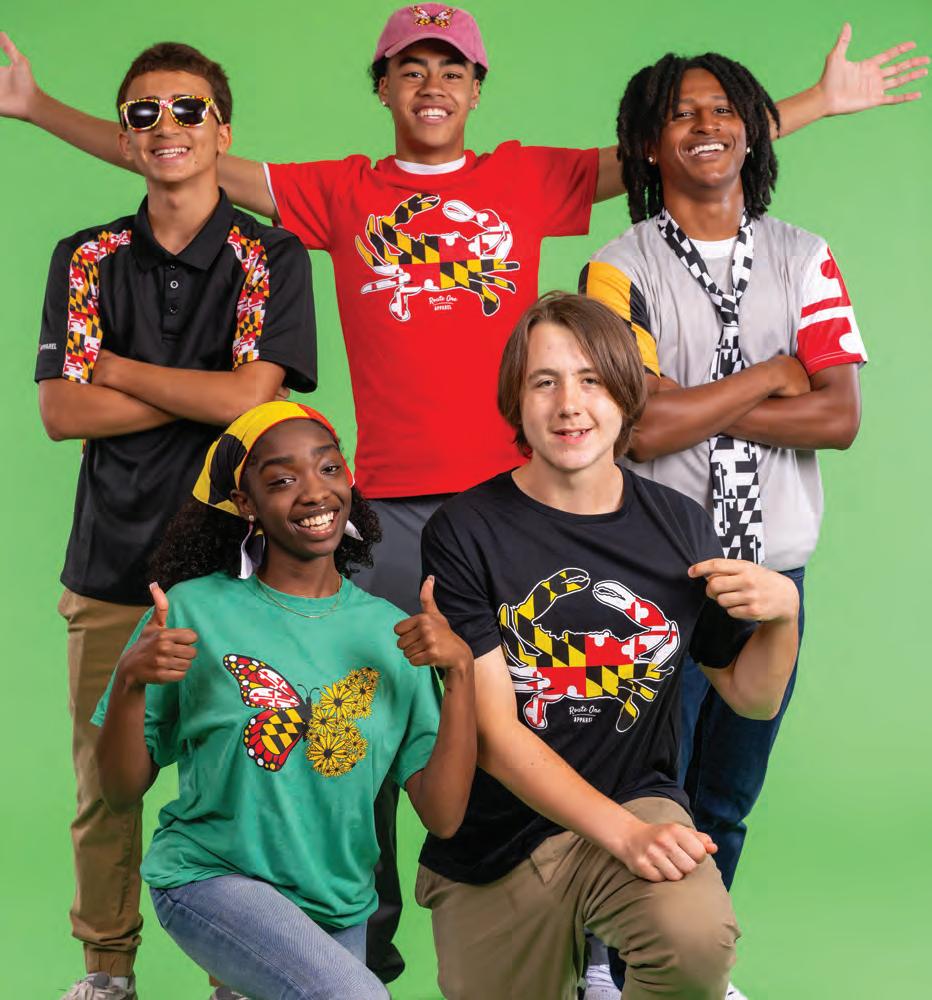





Choose from hundreds of degree programs that easily transfer to four-year schools or over 130 Continuing Education workforce certificates that help you to prepare and build practical skills for immediate employment — in a fraction of the time.
Plus, with 7 locations and over 70 fully online programs, CCBC easily fits your life.
BCPS, private school and homeschool high school students can get a head start on college coursework through the Early College Access Program at CCBC.
ccbcmd.edu/earlycollege
Earn your associate degree at CCBC and be dually admitted to one of our eight partner schools. Two institutions supporting your journey to success.
ccbcmd.edu/degreestosucceed
CCBC’s Honors College is set to enrich, elevate and enhance the academic experience.
ccbcmd.edu/honors
With over 130 programs to choose from, take your career to the next level.
ccbcmd.edu/work
Apply at ccbcmd.edu/opportunity

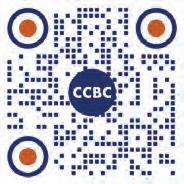
Caminos futuros de Maryland .......................91 Vida
Sharon Markley Schreiber | Executive Director
TBA | Chief Program Officer
Christopher Thorn | Chief Information and Operations Officer
Morgan Cox | Event & Marketing Manager
Carrie Pannone | State Program Sr. Manager
Taylor Hudson | College Pathways Manager with NGS Responsibilities, Kent
Leonard Webb | NGS Manager, Allegany County
Abigail Wittman | NGS Specialist, Caroline County
Ser un estudiante
........................
Plan de juego para tu visita al campus 85
Brilla en tus solicitudes universitarias ........... 83
Matrícula universitaria para el año académico 2025-26 81
¿Cómo pagar por la universidad? .................. 79
Competir en deportes más allá de la escuela secundaria 77
Habilidades esenciales ................................. 74
Deja tu marca/Crea tu currículum ................. 73
Preparación para entrevistas ........................ 71
Tu momento de brillar .................................. 70
Encuéntrame: Lupe Duarte ........................... 69
Alumnos en formación ................................. 67
Voncia Molock | NGS Specialist, Dorchester County
Tashe Williams | NGS Manager, Wicomico County
Rikia Cornish | Student Ambassador Program Intern
Zy’Aye Bell, Amaya Carroll, Lupe Durante, Khensani Golding, Korbin McKenzie, Odette Pierre, Kayla Ross, Taryn Waters | NGS Program Interns
Cómo comenzar 66
Suzanne E. Fischer-Huettner | Managing Director
Patrick Brannan | Managing Editor
Kate Malone | Special Products Editor
Darice Dixon | Business Development Manager
Stella Edwards | Special Publication Designer
Melanie Bingham | Print Production Director
Maximilian Franz | Contributing Photographer
Advertise:
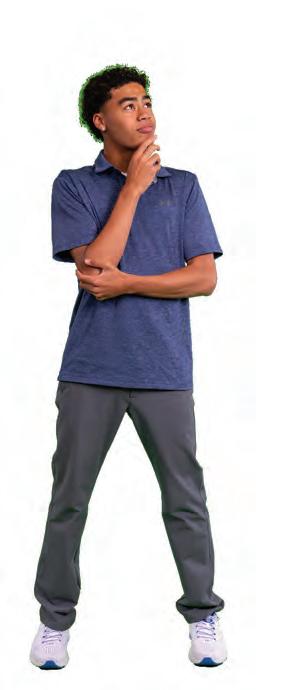
Next?
• Check out page 12 of this magazine to explore Career & Technical Education (CTE) options at your school.
• Check out ways to explore your interests on page 13.
• Try a career, interest or personality survey to discover careers that match YOU. Your school might use Naviance or other careerreadiness tools—ask your counselor!
• Talk to your counselor about other awesome resources your school offers.
Ready to explore what makes you unique and how it connects to your future career? Let’s uncover your interests, talents and dreams to find the path that’s right for you.
Ask yourself:
• What are my top three favorite subjects in school?
• What do I love doing when I’m not in class? (Think clubs, hobbies, sports, gaming, music, creating art—even solo stuff like reading, hiking or coding.)
• What are some things I’m naturally good at?
• What’s a challenge I’d like to improve on?
• What’s my ultimate dream job — even if it seems far off?
Think about this…
• Do you stand up for what you believe in?
• Are you someone who sets big goals—and goes after them?
• Do you enjoy helping others grow, succeed or learn?
If that sounds like you, leadership might be a big part of your future! Maryland needs future leaders like YOU—across every industry, every community.
Pick your top 3 from this list—no wrong answers here!
Arts, Media & Communication
Business Management & Finance
Construction & Development
Consumer Services, Hospitality & Tourism
Environmental, Agricultural & Natural Resources
Your future starts with YOU.
Maryland Mindset:

Did you know?
Career Pathways are smaller groups of jobs within each career field (also called “career clusters”). They help you dive deeper into the kind of work you might love – many of them are right here in Maryland!
Health & Biosciences
Human Resource Services
Information Technology
Manufacturing, Engineering & Technology
Transportation Technologies
Just like the Bay flows in many directions, so can your future. Explore every option — your path is yours to chart.
Grade 7: EDUCATE



• Introducing The MBRT Way









• Establishing that courses matter, choices matter
• Discovering career opportunities
Grade 8: EMPOWER
• Providing future options
• Providing a strategy for high school
• Demonstrating the power of connections
Grade 9: ENGAGE













• Leveraging personality and interest tools
• Meeting industry professionals through hands-on experiences
• Creating a vision for their future, beginning with high school planning
Grade 10: EXPLORE
• Building career skills and knowledge
• Investigating career and college pathways
• Developing a plan of action
Grade 11: EXECUTE
• Visiting colleges and employers








• Taking part in job shadowing opportunities
• Interviewing with industry professionals
Grade 12: ELEVATE












• Learning content and skills through real-world application
• Preparing for SAT/ACT and the college application process
• Completing applications for financial aid, scholarships, and college admissions
• Finding internships
• Creating a post-HS transition plan
Post-graduate: ENRICH
• Networking opportunities
• Providing ongoing support and connections
• Reinvesting in the school community
Maryland Mindset:

Start where you are, dream big and build as you go — just like Maryland’s leaders and innovators.
Let’s break down the real-world costs of living in Maryland— and how your future career income can support the lifestyle you want.
“This is what you earned before any money was taken out.”
It’s your total pay for the period based on hours worked or salary — before deductions.

“Where did some of my money go?”
These are taxes and other withholdings (like Social Security, Medicare, and possibly health insurance). Everyone pays them, and they’re taken before you get your paycheck.
“This is what actually hits your bank account.”
Also called “take-home pay,” it’s what’s left after all deductions are subtracted. This is the number you’ll use to budget and spend.
Net Monthly Pay of $1,880.40Total Monthly Expenses of $3800 = $1,919.60 over budget

Data Scientist*
Biomedical Engineer
$349,250$29,104.17$167.91
$315,840$26,320.00$151.85
$260,100$21,675.00$125.05
$143,490$11,957.50$68.98
$129,210$10,767.50 N/A
$112,590$9,382.50 N/A
$105,650$8,804.17$50.79Bachelor’s degree
Speech Language Pathologist$100,560$8,380.00$48.35Master’s degree
Veterinarian
$100,370$8,364.17$48.23
Financial/Investment Analyst$98,890$8,240.83$47.54Bachelor’s degree
Technical Writer
Aerospace Engineer
Farmer/Rancher
Accountant/Auditor
Environmental Scientist
$98,350$8,195.83$47.29Bachelor’s degree
$93,010$7,750.83$44.72Associate’s degree
$88,770$7,397.50$42.68High school diploma
$84,890$7,074.17$40.81Bachelor’s degree
$82,100$6,841.67$39.47Bachelor’s degree
Forensic Science Technician$78,220$6,518.33$37.60Bachelor’s degree
Police Officer
Teacher (Secondary)
Producer/Director
$77,440$6,453.33$37.23High school diploma
$77,030$6,419.17 N/A Bachelor’s degree
$75,900$6,325.00$36.49Bachelor’s degree
Physical Therapist Assistant*$65,510$5,459.17 N/A Associate’s degree
Carpenter
Real Estate Sales Agent
Dental Assistant
EMT (Emergency Med. Technician)
Fitness Trainer
Photographer
Waiter/Waitress
Retail Salesperson
$60,130$5,010.83$28.91High school diploma
$49,770$4,147.50$23.93High school diploma
$48,280$4,023.33$23.21Certificate
$47,390$3,949.17$22.78Certificate
$45,260$3,771.67$21.76Not listed
$44,890$3,740.83$21.58High school diploma
$35,140$2,928.33$16.89High school diploma
$34,310$2,859.17$16.50High school diploma
*One of Maryland’s fastest growing jobs!
Maryland's workforce is among the most educated and technically skilled in the United States, thanks in part to its robust higher education system. With 55 accredited two and four-year colleges and universities, including renowned institutions like Johns Hopkins University, Morgan State and the University of Maryland Baltimore County (UMBC), the state produces a highly qualified talent pool.
Key Workforce Highlights from Maryland's Higher Education Landscape
• High Educational Attainment: As of 2023, over 43.7% of Maryland residents aged 25 and older hold a bachelor's degree or higher, with 21.3% possessing a graduate or professional degree - that’s higher than the national average!
• Strong STEM Presence: Maryland ranks second nationally for its high percentage of professional and technical workers, and it has the second-highest concentration of doctoral scientists and engineers.
• Leading Institutions:
• Johns Hopkins University: Recognized for its life sciences and engineering programs, it is the leading recipient of NIH awards among U.S. colleges and universities.
• Morgan State University: Now the third-largest HBCU in the U.S., Morgan is experiencing recordbreaking growth fueled by high-demand programs, a focus on affordability, and a strong reputation for student success.
• UMBC: Known for innovation, it is the top producer of Black undergraduates who go on to complete a Ph.D. in natural sciences or engineering.
• Community College Contributions: Maryland's 16 community colleges offer specialized programs to meet workforce needs, such as Frederick Community College's Logistics and Production Technology for Biotechnology Systems and Maintenance, and Anne Arundel Community College's Digital Forensics Information Assurance and Cybersecurity program.
• Federal Workforce: In 2021, Maryland had the secondhighest concentration of federal workers and ranked first for federal jobs per capita, with 242 federal jobs per 10,000 residents.
* Maryland Averages based on BLS Occupational and wage data.
* Projection data for the year 2023.
* Veterinarian data from 2022 year.
For more occupations, visit https://www.bls.gov/oes/current/oes_stru.htm and click on “Occupational and Wage Data” and/or “Projection Data”
Your high school years are more than just a time to earn credits—they're the foundation for your future. Every class you take, every grade you earn and every choice you make, builds the path to your dreams. Whether you're aiming for college, a trade, or jumping straight into the workforce, your transcript tells your story. Make it a story of commitment, growth and ambition.
Legal Name Pat Smith
ID Number 625-559-5799
Birth Date 01/01/200 7
Class of 202 5
Graduation Date 05/27/202 5
Parent/Guardian Patrick and Patricia Smith
Will you show up for class or work? Consistent attendance shows responsibility and dedication.

Can you take on a challenge? Choosing advanced or honors courses demonstrates your willingness to push yourself.
Do you have the skills to be successful? A strong GPA and positive behavior reflect your readiness for future success.
SchoolNameCentennial HighSchool
Address 123 SecondStreet City Baltimore State MD Zip Code 21222 Fax 410-555-3131
Phone 410-555-2121
Principal Mary Jackson Counselor Jim Lawrence
*Industry Recognized Credential (IRC) Completed And/Or **Youth Apprenticeship Completed
June 21, 2025 Mary Jackson
Maryland Mindset:
Big moves start with small choices. The classes you pick today can open Bay-sized opportunities tomorrow.
Legal Name Kelly Jones ID Number 111-22-333
Birth Date 02/02/2005 7 Class of 202 5
Graduation Date 05/27/202 5
Parent/Guardian Kenny and Kim Jones

SchoolNameCentennial HighSchool
Principal Mary Jackson Counselor Jim Lawrence
Be
WHO WOULD YOU HIRE? Imagine you're the employer. Would you choose someone who shows up late, skips responsibilities and avoids challenges? Or someone who is punctual, takes initiative and strives for excellence? Your actions today are the resume you'll present tomorrow.
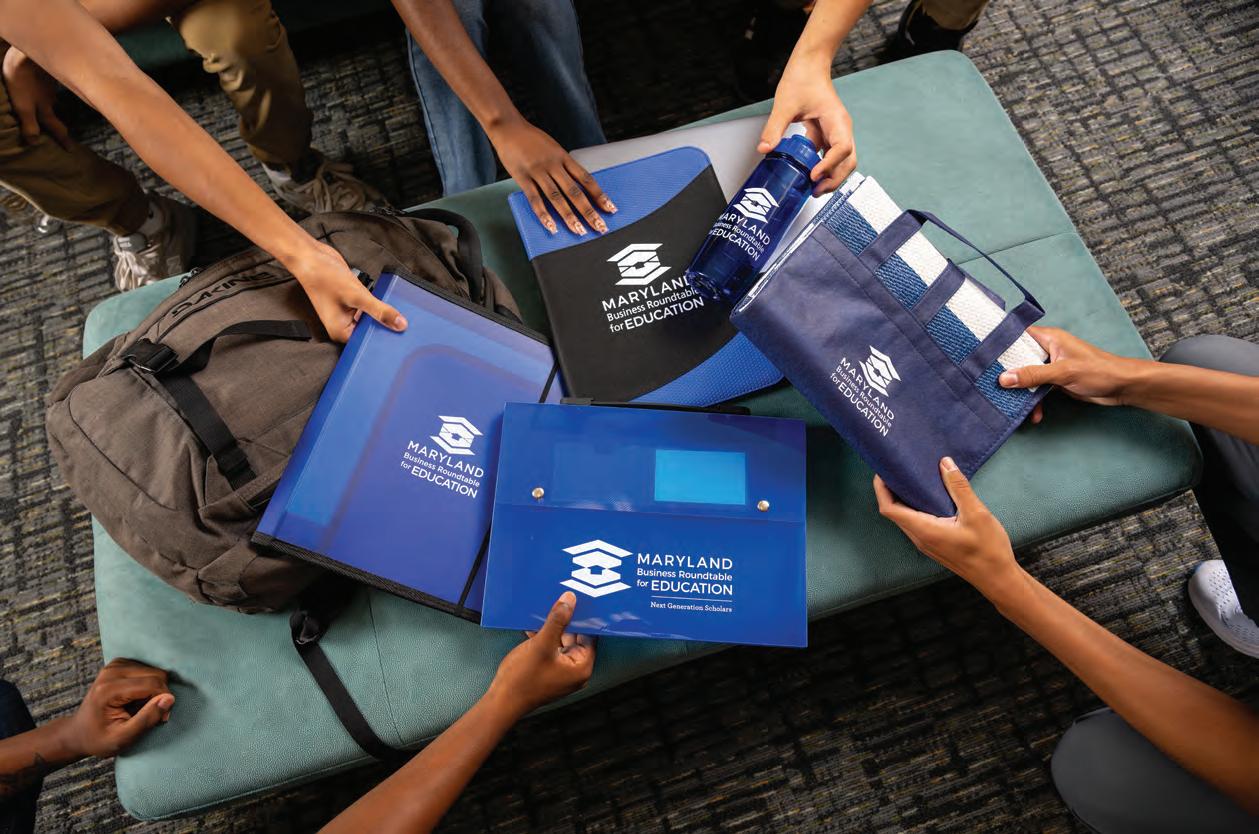

Your future? It’s built choice by choice, day by day — starting NOW.
Take this quick quiz to check in on where you are and where you’re headed. No pressure — just be real.
Put a f next to everything that sounds like YOU:
I’m striving to do well in school.
I show up to class on time, every day.
I go beyond what’s expected of me in class.
I plan to take high-level math and science classes.
I plan to learn (or am learning) a world language.
I am or plan to be active in extracurriculars (clubs, sports, arts, etc.).
I currently or plan to volunteer/give back in my community.
I think before I post — I’m careful about my digital footprint.
I understand my high school pathway options (CTE, dual enrollment, AP, etc.).
I have a clear idea of what I want to do after high school.
TOTAL CHECKS: _______
Now check your score to see where you stand
8–10 Checks: You’re Owning It!
You’re setting yourself up for long-term success. In fact, students who take challenging courses, show up on time and give back often earn $1 million MORE in their lifetime. That’s a whole Maryland mansion’s worth of success. Keep that energy going!
5–7 Checks: Almost There — Just One More Push!
You’re doing a lot right. Now’s the time to level up. Join a new club, ask a teacher about volunteer work or explore classes outside your comfort zone. Every step forward helps you stand out to colleges, jobs and scholarships.
0–4 Checks: Real Talk — It’s Go Time!
This is your moment to take control. You’ve got potential — now match it with action.
Set goals
Build habits
Ask for help
Talk to your school counselor
Because guess what? Maryland students don’t sit back — they show up.
Whether you’re planning to go to college, join the military or start a career right after graduation, your future starts now—and you’ve got options. Maryland believes in YOU and there are powerful pathways designed to help you reach your goals.
Choose Your Maryland Future Pathway (All of these lead to success—just pick what works for YOU!)
Interested in a 4-year college? ➡️
Advanced Placement (AP) or International Baccalaureate (IB) ➡️ Push yourself with college-level classes while still in high school.
Interested in a 2-year college and staying local? ➡️
Dual Enrollment or Early College ➡️ Earn college credits now through community colleges and partner schools.
Interested in going into a career after high school? ➡️
Career & Technical Education (CTE) ➡️ Gain hands-on experience and real-world skills in high-demand careers.
High School Graduation Requirements (Maryland Style!)
Aim for a 3.0 GPA
Scan the QR code or visit www.mbrt.org to check what your local district requires!
Why MD’s Future Pathways Matter
Each step you take now builds the future you want. Here’s what these pathways unlock:
Your Future = Limitless
No matter what path you choose, remember: Maryland has your back. You’ve got the tools, the talent and the support to make it happen. YOU are the future of Maryland. Let’s build it together.


At school, leadership comes in many forms, and it starts with taking the first step. Whether you're passionate about making a difference, speaking for others or organizing events, there's a place for you to lead.

• Student Ambassador Program (See pages 14–15)
Be a role model and help welcome, guide and inspire others.
• Future Business Leaders of America (FBLA)
Build leadership skills, explore business and entrepreneurship and find your voice.
• Honor Societies
Celebrate your achievements and give back through service and academic excellence.
• Student Government
Make real change. Represent your classmates and help shape your school’s future.
Sports are more than competition, they’re about discipline, commitment and growth. You’ll build confidence, strength and character. Make your mark. Form new connections. Find your next adventure.
• Football
• Track & Field
• Lacrosse
• Cheerleading
• Swimming and Diving
• Softball
• Soccer

• Volleyball
• Tennis
You have the freedom to explore your interests and maybe even discover a passion you didn’t know you had. Clubs are where ideas come to life, friendships are built and creativity takes off.
• Debate Team – Make your case, sharpen your voice.
• STEM Clubs (Robotics, MESA, and more) – Innovate, explore and create.
• World Languages Club – Connect through language and culture.
• Mock Trial – Step into the courtroom and learn the art of argument.
• Drama Club – Take the stage and tell stories that matter.
• Yearbook Committee – Capture the moments that define the year.
• Choir – Find harmony and make music with others.
• Junior ROTC
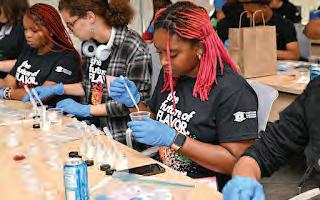
Real learning happens when you connect what you know to the world. Through service, you’ll build leadership skills, develop empathy and realize your power to create change.
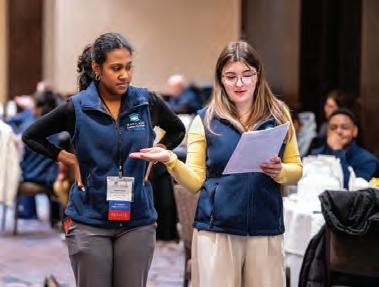
• Help another student as a tutor
• Coach a youth team in your favorite sport
• Organize a donation drive or fundraiser
• Take part in a school or community clean-up
• Volunteer at a shelter or food pantry
• Teach seniors how to use technology
Classes build your future. Campus life builds your story — Maryland’s got both.
Want a future that’s exciting, high-paying and built around what you love to do? Maryland’s Career & Technical Education (CTE) programs help you turn your passions into real-world careers—while still in high school.
CTE combines academic knowledge with hands-on learning so you’re ready for college, career or both. Whether you dream of designing buildings, saving lives, fixing engines, running a business or writing code, there’s a CTE program that helps you get there.
In Maryland, CTE is your launchpad to opportunity, and it’s already working for students across the state.
Maryland offers 222 CTE programs of study across all 24 school systems. In total, 48% of high school students participate in CTE.
133,071
• Earn industry-recognized credentials
• Gain college credit
• Get real-world work experience
• Improve your academic performance
• Build skills for high-demand, high-wage jobs
• Graduate with a head start on college or career
Perform better in math and reading
Are more likely to graduate and go to college
Have higher median annual earnings
Sources: https://careertech.org/state-profile/maryland/

43,806
CTE is separated into 10 different career clusters. Maryland’s Department of Education has organized its secondary CTE programs framed around the National Career Clusters Framework. Maryland’s CTE Career Clusters are the following:
Arts, Media and Communication
Business Management and Finance
Construction and Development
Consumer Services, Hospitality and Tourism
Environmental, Agricultural and Natural Resources
Health and Biosciences
Human Resource Services
Information Technology
Manufacturing, Engineering and Technology
Transportation Technologies
Sales Manager, Media Relations Specialist, Marketing Coordinator, Editorial Assistant, Producer
Budget Analyst, Financial Manager, Tax Specialist, Investment Advisor, Entrepreneur
Urban Planners, Civil Service Administrator, Community Development Worker, Architect
Flight Attendant, Receptionist, Event Planner, Travel Agent, Transport Officer
Natural Resource Management, Restoration Ecology, Conservation Scientist, Horticulturist
Nurse, Physician, Surgeon, Bioengineer, Researcher, Radiology Technician
Therapeutic Services, Diagnostic Services, Health
Informatics, Support Service, Biotechnology Research and Development
IT Security Specialist, Programmer, Systems Analyst, Data Scientist
Engineer, Supply Chain Manager, Logistics Manager, Quality Assurance
Pilot, Air Traffic, Postal Worker, Mechanic, Freight Manager
Maryland Mindset: Learn it. Do it. Maryland industries are hiring hands-on talent.
Are you ready to take the first steps toward an exciting and successful future? Whether you’re dreaming of launching your own business, becoming a skilled trades expert, designing the next big app or anything in between — internships, apprenticeships and job shadowing are your backstage pass to making it happen.
These real-world experiences don’t just help you learn about careers — they help you live them.

Let’s break it down so you can find the right fit for you!
• Get hands-on experience in a workplace — paid or unpaid.
• Great for exploring a field, boosting your resume and building connections.
• You’ll work under supervision, learn valuable skills and sometimes even earn school credit!
• Tip: Start early and gain confidence for college, career and beyond.
• Learn while you earn! Yes, you get paid to train for a career.
• Combines real job experience with classroom instruction.
• Includes a mentor who guides you step-by-step through everything you need to know.
Every opportunity opens a door. Whether it’s a connection, a new skill or a boost in confidence — your future is waiting and these experiences help unlock it.

“It’s not about how perfect you can be, it’s about your drive and dedication! It has been amazing to be a voice for students and create a safe space for personal, educational and professional growth. My internship has shown and taught me what a team looks like and how we all are important pieces to the puzzle!”
— Rikia C., MBRT Intern

• Ends with a recognized certification that can lead directly to a high-paying job.
• Spend a day (or more) following a professional and see what their job is really like.
• Ask questions, explore career path and see the behind-the-scenes action.
• Not paid — but the experience is priceless when it comes to planning your future.
Maryland Mindset:
Scan the QR code below to discover apprenticeship opportunities near you!
Maryland’s apprenticeship programs can launch careers in everything from construction to clean energy.
Leadership doesn’t start later—it starts now.
As a Student Ambassador, you’re not just preparing for your future—you’re helping shape Maryland’s future today.
Student Ambassadors from all 24 school districts come together to:
• Speak up on what matters
• Connect across communities
• Lead projects that inspire change
Why Join?
Your voice matters.
Our meetings are built to help you feel seen, heard and supported. Whether you’re leading the charge or learning to find your voice, you’re not alone here.
You’ll meet students just like you
From Julia P. Student Ambassador
“The program is fun and low-pressure. I’ve met people from all over Maryland and it’s helped me feel more confident. I really liked the mock interviews— they gave me a boost!”
From the mountains of Garrett to the beaches of Worcester, this is a space to grow with peers from across Maryland.
You’ll build real-world skills


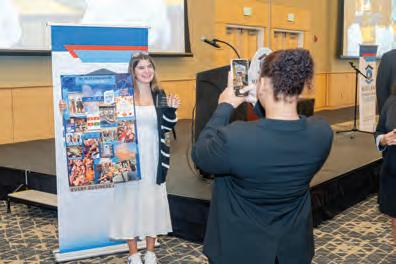


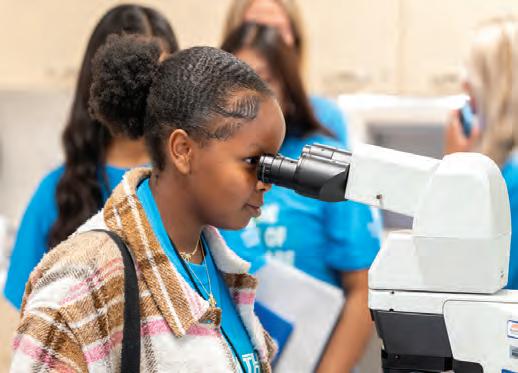



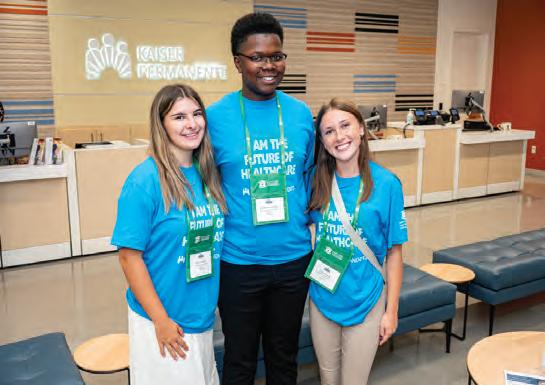

Leadership Opportunities
Industry Day:
• Explore different career paths
• Build connections with professionals to expand your network
Youth Congress Day:
• Strengthen your understanding of civic engagement
• Debate real policy issues with your fellow peers
NextGen NextLevel:
• Gain tools for college success:
• Network with peers and professionals
• Take away real-world advice from current college students
Maryland Mindset:

Ready to Lead? If you’re curious, passionate, or just looking for a place to grow—this is it. Learn more and apply today!
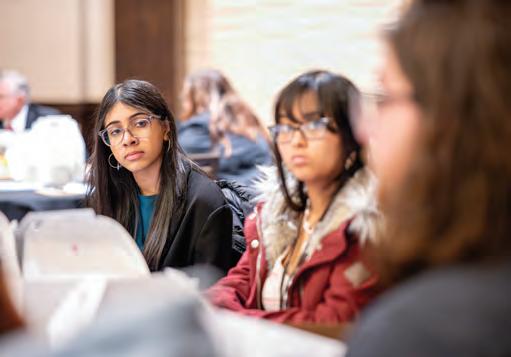
Like Harriet Tubman and Thurgood Marshall, leadership here means lifting others as you climb.

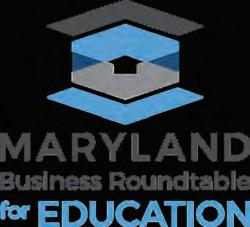
Christine D. Aspell, Chair - Office Managing Partner, KPMG
Suzanne Fischer-Huettner, Vice Chair - Managing Director, Bridge Tower Media/The Daily Record
Michael Cloyd, Treasurer - SVP, CFO & Treasurer, BGE
Joe Durham, Market President, Fulton Bank
Joan Flynn, Chief External Relations Officer, Loyola University Maryland
Vernon Hurte, Ph.D., Vice President of Student Affairs, Towson University
Sandra Kurtinitis, Ph.D., President, Community College of Baltimore County
Todd Marks, Founder, CEO, & President, Mindgrub
Morgan O’Donnell, SVP, CFO & Treasurer, Pepco Holdings
Jay Patel, Sector Vice President, Engineering and Sciences, Northrop Grumman Mission Systems
Jay Perman, MD, Chancellor, University System of Maryland
Yolanda Wilson, Ed.D., President, College of Southern Maryland
College is a huge step that many students choose to take, and it can be an impactful experience. You should carefully consider which school to attend – including visiting the campus when possible. Whether you're planning your very first campus tour or thinking ahead about what kind of degree will lead to your dream job, use this page as your roadmap. Use it to plan your visits, envision your future and understand the different types of college degrees that can get you there. Why visit? Because websites and brochures only show so much. Stepping onto a campus helps you feel the vibe and see if it truly fits you.
Try to visit when school is in session!
That way you can see students going about their day. It also helps to truly get the feel of the campus.
Be sure to imagine this as your new home!
Is this going to be a good fit? Did you get excited and feel safe and comfortable walking around or near campus?
Can you picture staying in the area after school? You’ll start to make valuable professional connections during college that may help you land a local opportunity after graduation.
Maryland has it all—urban universities, coastal colleges and rural campuses in the mountains. Visit different regions, explore local cultures and find your fit!
• Western MD – Outdoor adventure, close-knit campuses
• Central MD – Bustling cities and major research universities
• Eastern Shore – Coastal charm and tight community vibes
• Southern MD – Historic sites, quiet surroundings and hidden gems
Talk to real students and professors
Ask about campus life, safety, support and opportunities
Ask for help!
Keep in mind that if you need any help with any of these topics, don’t hesitate to contact Admissions.
Can’t make it in person? Some colleges have virtual tours or sessions!
Consider
What did you like and dislike?
Can you picture yourself living and learning here for 4 years?
Compare
Use a spreadsheet or journal to compare schools with your pictures and notes from the tour.
Rank what’s most important to you (academics, campus life, cost, etc.).
Connect
Stay connected through virtual events or social media.
Send a thank-you email to admissions or any specific people you met.
Tour the quad. Meet the people. Picture your future — Maryland campuses are ready to welcome you.
Build Your College List
Consider factors like location, majors, campus size and tuition when making your college list. Apply to five to eight schools for a balanced selection.
Create Common App Account
The Common App opens in August. Register, complete the FERPA Release and sync with Naviance to transfer your documents easily.
Gather Documents:
Transcripts
Get the Transcript Release form from your guidance counselor, complete it once in your senior year. Submit the College Application Transcript Request Form via the Common App at least two weeks before deadlines.
Letters of Recommendation
Ask teachers for recommendations through Naviance, aiming for 2-3 letters. If you can, ask teachers who instruct courses related to your intended major or ones that you’ve really connected with. If you want to make it easy for them to write you a personalized letter, send them your resume and remind them of your intended major/future goals.

Your SAT and ACT scores are important for college admissions and scholarships. Know each college's criteria. Highlight any academic awards and feature challenging courses or classes related to your major.
Colleges want active students! Highlight your activities to show your passion and commitment. Ideally, focus on a few experiences that you’ve been involved with for a longer period and related to your future goals (think quality, not quantity).
Your essay is a chance to show your voice, writing skills, personality and important life experiences. What do you want the admissions committee to know or understand about you? This can help you stand out; you’re more than just a transcript or test score! Be sure you proofread before submission.
Every college has its own timeline, so it’s important to keep track of key dates. Early Action (EA) deadlines are usually in November and let you apply early without committing. Early Decision (ED) is also in November but is binding — it is best to do this if the school is really your top choice. Regular Decision deadlines typically fall in January or February.
Before you hit submit, take time to review everything carefully. Proofread your entire application and essays — even small errors can stand out! Make sure your transcripts, test scores and recommendation letters have been requested and sent.
Staying on top of the process helps everything feel more manageable. Create a checklist or simple spreadsheet to track where you’ve applied and what’s still left to do. Staying organized will help you meet every deadline.
Each application you complete is a big step toward your future — take a moment to celebrate your progress! Keep that momentum going as you tackle the rest. You’re building an exciting path ahead!
Make your application stand out like our state flag in the crowd — bold, bright and true to you.

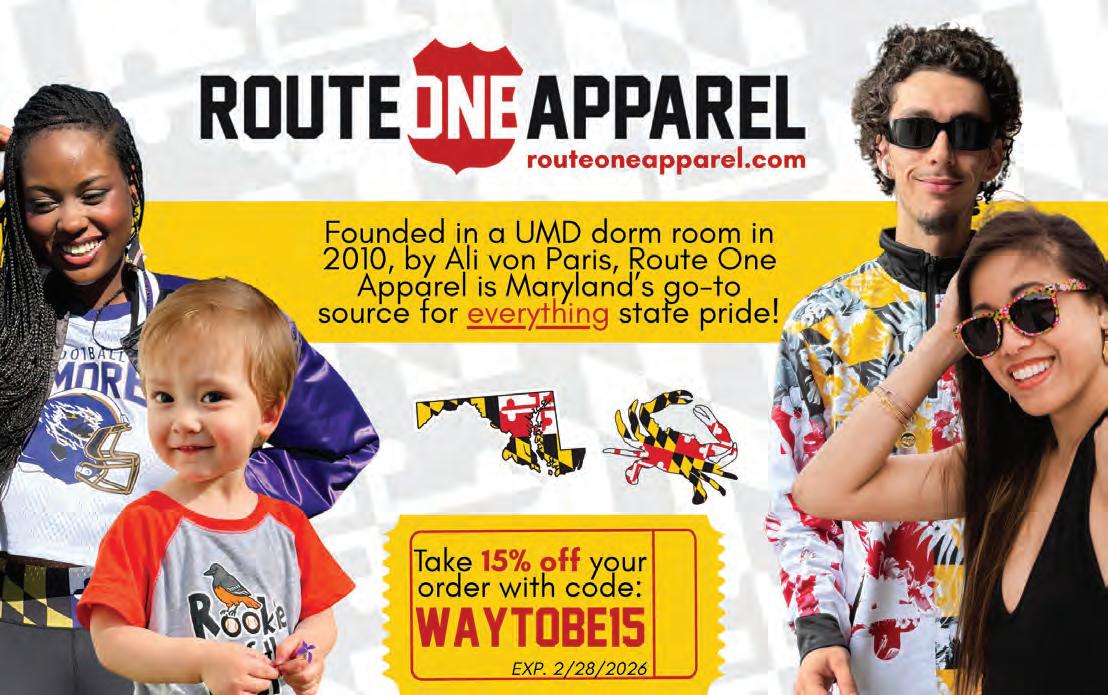
Inspire the next generation of Maryland students by volunteering with the Maryland Business Roundtable for Education (MBRT). As a Speakers Bureau volunteer, you'll visit classrooms—virtually or in-person—to share real-world insights and show how education pays off in college, career, and life.
✔ Connect with students in your local community (or across the state)
✔ Choose dates that fit your schedule
✔ Use our easy volunteer platform to sign up and get started
✔ Empower students with the Way to Be message
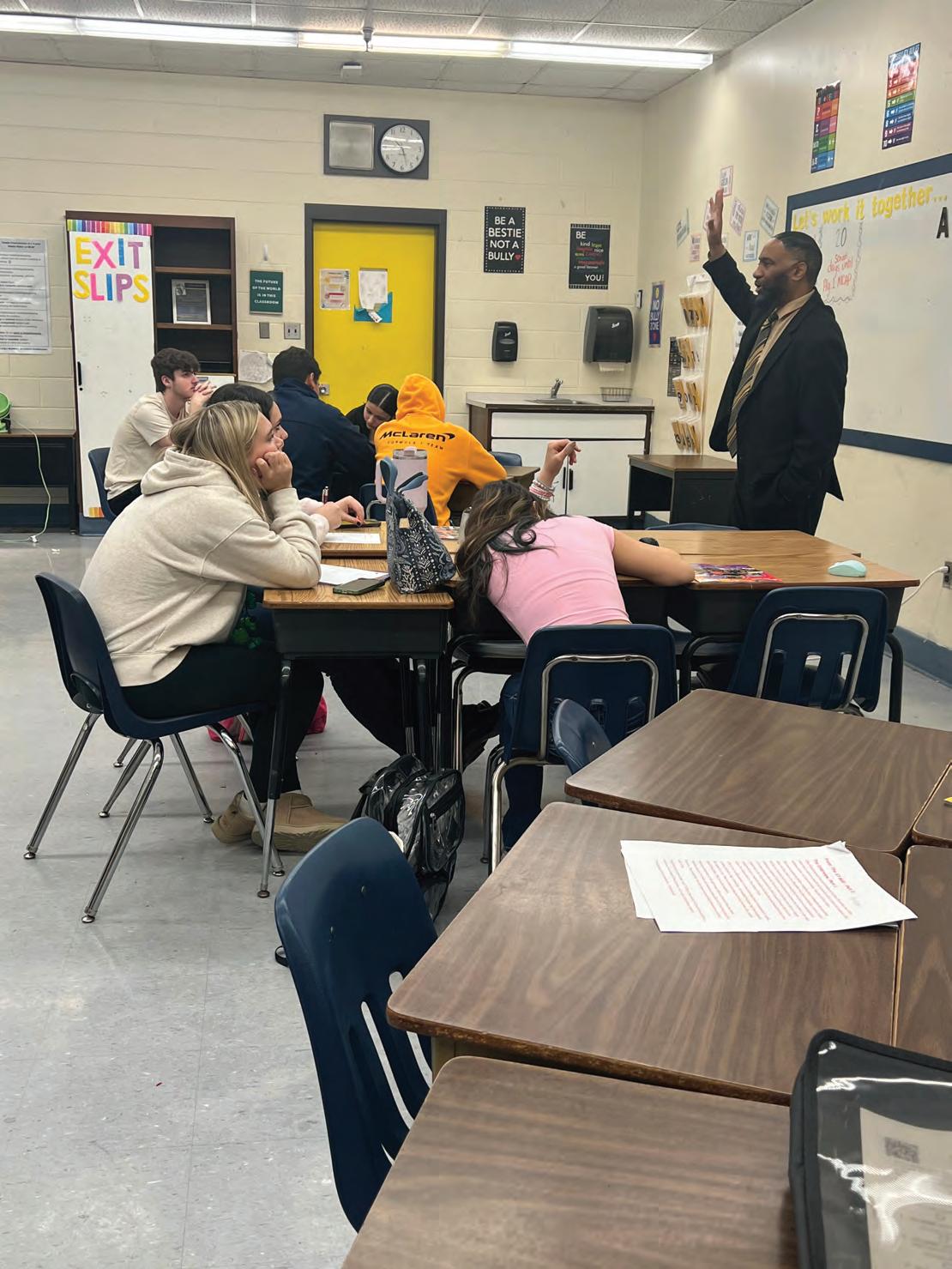

THE FOLLOWING IS BASED ON FULL-TIME UNDERGRADUATE STUDENTS (AT LEAST 12 CREDITS) – Maryland Resident – Fall 2025 & Spring 2026
HOUSING IS BASED ON DOUBLE-OCCUPANCY (Mid-Range) and Room Charges ONLY (Not Room & Board)

Bowie State University
Bowiehttp://www.bowiestate.edu4,309$9,529.00$7,478.00
Coppin State UniversityBaltimorehttp://www.coppin.edu/1,548 $7,421.00$6,928.00
Frostburg State UniversityFrostburghttp://www.frostburg.edu/2,548$10,464.00$6,532.00
Morgan State UniversityBaltimorehttp://www.morgan.edu/8,376$8,346.00$12,840.00
Salisbury University Salisburyhttp://www.salisbury.edu/5,830$11,306.00$7,976.00
St. Mary’s College of MDSt. Mary’s Cityhttp://www.smcm.edu/1,593$15,692.00$10,086.00
Towson University Towsonhttp://www.towson.edu/14,415$12,186.00$8,672.00
University of BaltimoreBaltimore http://www.ubalt.edu/index.cfm 663$10,600.00 N/A
University of MD – Baltimore CountyCatonsvillehttp://www.umbc.edu/ 9,421$13,689.00$9,065.00
University of MD – College ParkCollege Parkhttp://www.umd.edu/ 29,225$12,290.00$10,074.00
University of MD – Eastern ShorePrincess Annehttps://www.umes.edu/home/2,256 $9,365.00$5,928.00
University of MD – Global CampusAdelphihttp://www.umuc.edu/12,636$3,960.00 N/A
Leonardtown, Prince
Dundalk, Essex, Randallstown, Tradepoint Atlantic, Transportation Training Center, Owings

Rockville, Silver
*Enrollment data provided by Maryland Higher Education Commission (MHEC) - Credit Headcount Fall 2024. ** Tuition & Fees and Housing prices from institutions’ direct website or contacts.
Allegany College of Maryland offers housing on Cumberland Campus at $6,800, four bedroom
range, double occupancy.
• Statistics from some Maryland institutions show positive trends in Financial Aid awarded to students:
• As of 2025, $8.8 million is disbursed to Wor Wic Community College Students each year.
• At Salisbury University, 92% of incoming students receive financial aid, with over $75 million awarded.
• At the University of Maryland, the average amount of aid received by all undergraduate students in 2024 was $16,438.
• At Loyola University, 99% of students receive some type of financial aid.
• Other Financial Aid statistics show:
• The U.S. Department of Education awards an estimated $46 billion in scholarship money annually.
• Around 30% of Maryland undergraduate students receive Pell grants.
• A total of 117 Class of 2024 graduates from MBRT programs received $4.3 million in state grants—averaging over $36,750 per student—to attend Maryland colleges and universities.
Sources: https://www.worwic.edu/pay-for-college | https://www.salisbury.edu/admissions/financial-aid/ https://www.usmd.edu/IRIS/?view=UMCP | https://www.loyola.edu/department/financial-aid/ https://educationdata.org/scholarship-statistics | https://nces.ed.gov/ipeds/trendgenerator/app/answer/8/35?ty=2023&f=6%3D24
Maryland Mindset: Scholarships and grants are out there — like hunting for the best crab spot, do the research and dig in.
My Future. My Maryland. It starts with smart financial planning. Use this checklist to navigate the steps toward funding your college education.
Direct Costs
• Tuition & Fees
• Room & Board
• Meal Plans
Step 2: Know Your Financial Aid Options
Indirect Costs
• Books/Supplies
• Transportation
• Personal Expenses
• Health Insurance
Aid TypeWhat It Is Pay Back?
Grants
Free money based on financial need offered as federal or state aid, or collegiate funding No
Scholarships Free money for achievements or talents often provided by schools and private organizations No
Work-Study
Loans
Get a part-time job through your school to earn as you learn No
Borrowed money to pay back later through federal government and private agencies. Yes
Subsidized loans save you money—no interest while you’re in school! Unsubsidized loans are easier to get, but start charging interest right away. Know the difference before you borrow!
Pro tip – Attend a local financial aid night for personalized assistance!
Complete the FAFSA: Opens October 1 annually. Apply at fafsa.gov.
Submit the MHEC One-App: For Maryland state aid, including undocumented students. Apply via MDCAPS.
Maryland Mindset:
Invest in yourself — Maryland’s got the tools to help you pay smart and stress less.


Did you know? The Maryland Higher Education Commission (MHEC) administers more than $130 million each year to 50,000+ Maryland students who are attending a Maryland college or university.
• Guaranteed Access Grant: Covers 100% of financial need up to $18,000 (2025 – 2026 academic year).
• Educational Assistance Grant: Up to $3,000 annually.
• Maryland Community College Promise Scholarship: Up to $5,000 for eligible community college students. Covers any remaining tuition after all federal/state aid has been applied.
• Campus-Based Educational Assistance Grant: Up to $3,000 annually to eligible students who file after the state deadline.
• Workforce Shortage Student Assistance Grant: For students entering high-demand fields like teaching and nursing.
Visit the Maryland Higher Education Commission’s website to learn more.
• FAFSA & MHEC One-App: Submit by March 1 for priority consideration.
• Delegate & Senatorial Scholarships: Deadlines vary. Contact your local representatives.
• Academic Performance: Meet GPA requirements for aid renewal.
• Enrollment Status: Remain enrolled in eligible programs.
• Timely Applications: Reapply for aid each year. erms & Conditions: Abide by any terms you agreed to
Free Money for College Starts Here
WHERE TO LOOK
• High school counseling office
• College financial aid office
• Scholarship websites: Fastweb.com, BigFuture, Naviance, Scholarships.com
• Community groups & churches
• Employers (yours or your caregiver)
• MHEC One-App: mhec. maryland.gov
WHAT YOU’LL NEED
Personal essay
Recommendation letters
Résumé or list of activities
Transcript or GPA
Tip: Start a digital folder to reuse materials across applications.


7th-10th grade students, prequalify now! Pre-qualifying secures your eligibility for the Guaranteed Access Grant before you apply for college. Find your local MBRT staff member for more information.
WHO IS ELIGIBLE
There are scholarships for:
• First-gen college students
• Specific majors or career goals
• Leaders & volunteers
• Artists, athletes & performers
• Students with disabilities
• Military families
• Unique traits (yes, even left-handed students!)
Many students grow up dreaming of playing sports in college and professionally. But of the nearly eight million students competing in high school athletics in the United States, only 530,000 of them will compete at NCAA schools. And of that group, only a fraction will reach their goal of becoming a professional or Olympic athlete.
On the other hand, the experiences and life lessons student-athletes receive help as they complete their college courses and pursue their careers. Education is a vital part of the college athletics experience. Only about two percent of high school athletes are awarded athletic scholarships to compete in college. NCAA Division I and II schools provide almost $4 billion in athletics scholarships annually to more than 196,000 student-athletes*. Division III schools do not offer athletics scholarships; however, many students receive academic and need-based aid.
• More than 350 colleges and universities in its membership
• Nearly 197,000 student-athletes
• Nearly 300 colleges and universities in their memberships
• Around 137,000 student-athletes
• Nearly 205,000 student-athletes
• 425 colleges and universities in this division
(Source: Estimated probability of competing in college athletics | NCAA.org - The Official Site of the NCAA)
The chart above shows the probability of competing in athletics beyond high school – both in college and professionally. The percentages are based on estimated data.
* https://www.ncaa.org/sports/2014/10/6/scholarships.aspx
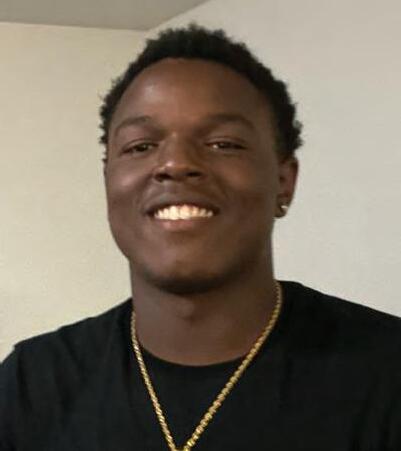
As a student-athlete, balancing academics and football takes serious discipline. At Colonel Richardson High School and now at Stevenson University, I’ve learned that staying organized is key. I rely on planners and digital tools to manage everything from classes and assignments to practice and game days. Having a routine helps, especially when the schedule gets intense. What keeps me grounded is my passion—for both football and cybersecurity. I’m constantly reminded by my family, coaches and mentors that the work I put in off the field is just as important as what I do on it. This long-term mindset keeps me focused and driven.
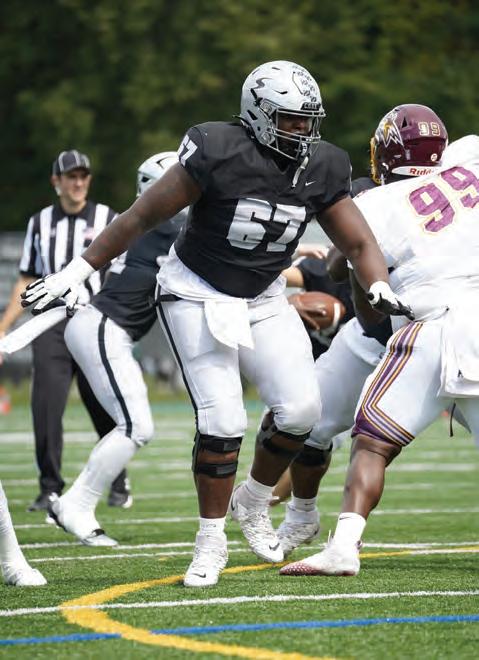
College Football Player, Stevenson University
High School/Graduation Year:
Colonel Richardson High School, 2023
Caroline County
College/Graduation Year:
Stevenson University, 2028
Degree: B.S. in Cybersecurity
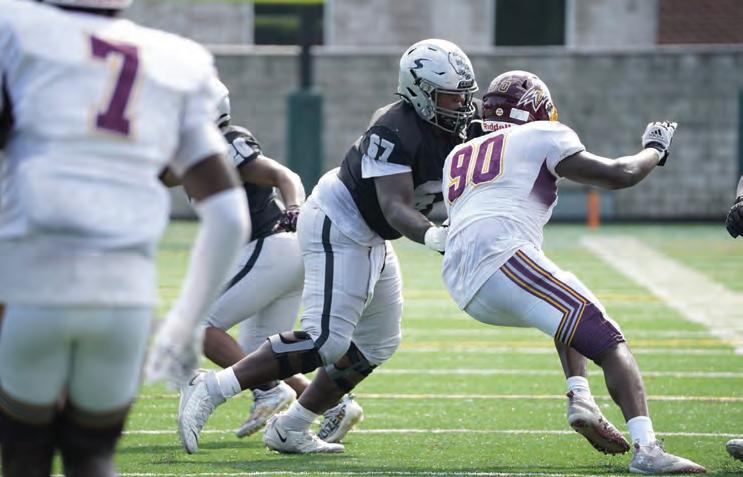
Lessons from the Game
Start practicing time management now. College gives you more freedom, but also more responsibility. Use your voice—advocate for yourself in class and on your team. Don’t be afraid to ask for help. If you’re a high school athlete in Maryland dreaming about playing at the next level, stay focused, stay humble and put in the extra work. Play for more than just the spotlight—play for your growth. And remember: your mental and physical health matter. It’s not just about game day—it’s about showing up for yourself every day.
Football has taught me more than how to play—it’s shaped who I am. I’ve learned how to lead under pressure, bounce back from setbacks and be accountable to my teammates. Whether I’m recovering from a tough game or working through a demanding week of classes, I’ve learned to stay resilient. Teamwork is everything—understanding how to trust others and work together toward a common goal will serve me long after college. Being part of a team has helped build my confidence and prepared me to take on future challenges head-on. My Future. My Maryland.
I’m majoring in cybersecurity, and I see a direct connection between the mindset I’ve built on the field and the career I’m preparing for. Football sharpened my ability to think clearly under pressure—skills that will serve me in cybersecurity defense, whether I’m protecting a government system or working in the corporate world. I’m also drawn to leadership. As a student-athlete, I’ve had to be accountable, stay focused and communicate effectively—qualities I’ll carry with me wherever I go.
Take your game beyond high school — Maryland’s got the pathways to get you there.
•
•
• Consider taking business electives
• Plan to attend college
• Graduate
• Go to college

•
• Join an accounting club on campus
• Get an accounting-related internship
• Gain experience in the industry you choose
• Study for the CPA exam and ace it



Sports Manage the finances for your favorite team, like the Ravens!
Animals
Help your local shelter make money and rescue more animals
Healthcare Serve others by working for a hospital or doctor’s office
Education
Teach other people accounting skills
Arts Work for a rock band, radio station, museum, or book publisher
Video Games
Become an accountant for a game company like Mojang

Crime Fighting Help solve financial crimes working for lawyers or the FBI
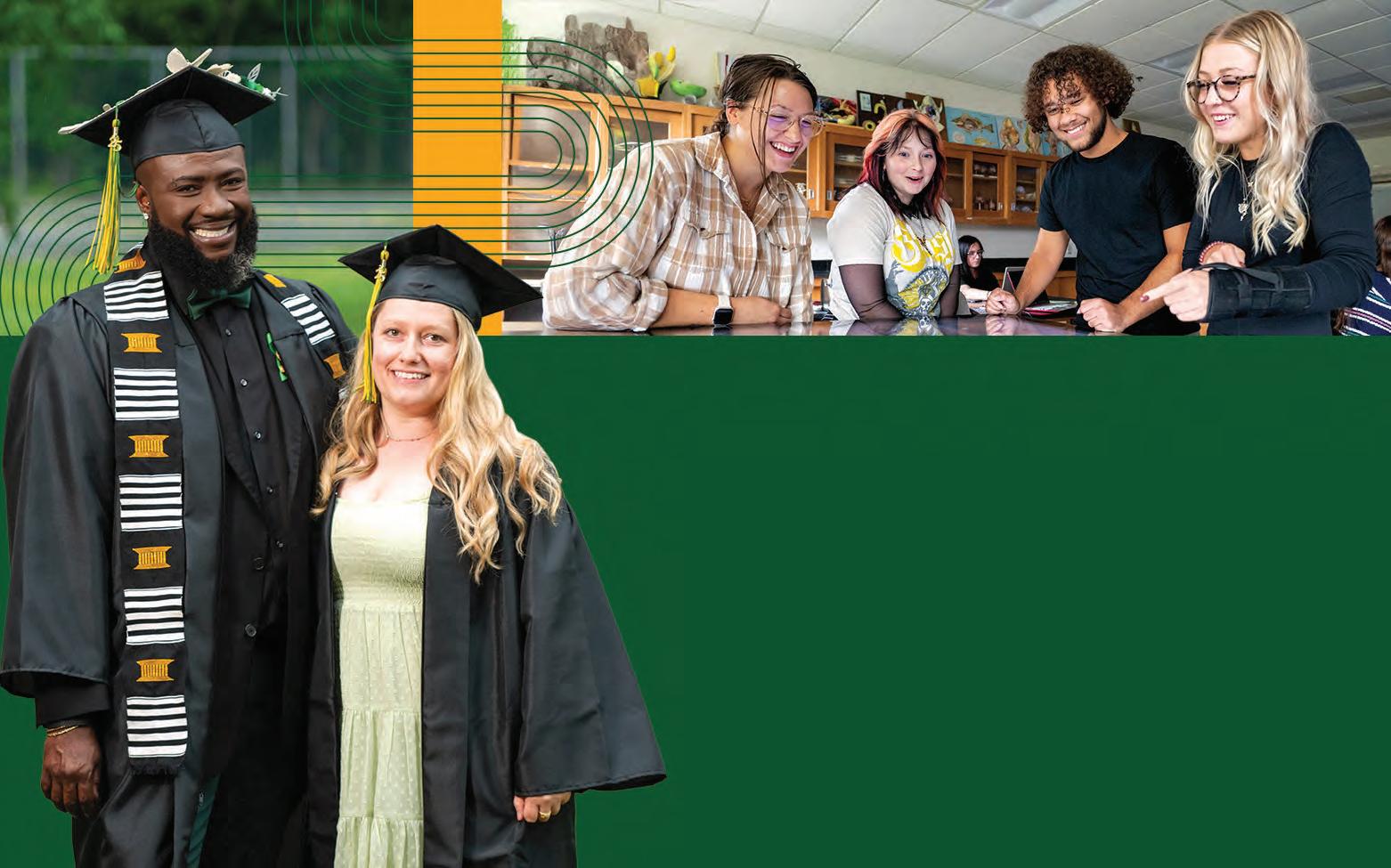
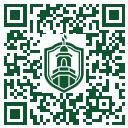
Your future starts now.
Success isn’t just about knowing the answers—it’s about how you think, communicate, adapt and lead. These personal strengths— called essential skills—are what employers across Maryland look for in rising stars like YOU.
Future-Ready Fact: “93% of employers say soft skills play a critical role in their decision about whom they want to hire,” Ian Siegel, co-founder and CEO of ZipRecruiter, said in the company's recent report The Job Market Outlook for Grads.”
These are the skills that will set you apart in school, work, and life:
Be flexible. Stay calm. Step up.
Change is constant—how you handle it matters. Employers need people who can roll with the punches and still perform.
“I used to panic when plans changed. Now I ask, ‘What’s Plan B?’ and keep going.” — 10th Grade Student, Baltimore
Teamwork makes everything work. From classroom projects to job sites, being a strong team player shows you’re reliable and ready to contribute.
Future Tip: — Practice collaboration by joining a club or helping out on a group project.
Say it clearly. Listen with purpose. Whether it’s writing an email, giving a speech, or having a tough conversation—good communication helps you stand out.
Try This: Practice your “elevator pitch”—a 30-second intro of who you are and what you’re passionate about.
Don’t just take it in— figure it out. Problem-solvers ask questions, connect dots and challenge assumptions. That’s what future-ready thinkers do.
Power Move: Instead of asking, “What’s the answer?” ask, “Why does this work?”
Find solutions. Take action. Grow from mistakes. Every challenge is a chance to show leadership and creativity. Don’t wait— solve it.
Quick Tip: Break big problems into smaller steps. Celebrate small wins.

Show the world what YOU bring to the table
In Maryland, we rise by being ready — whether you’re applying for your first job, internship or college program, your resume is your brand. It tells your story, your hustle and your future goals. Use this worksheet to start building a resume that gets noticed.
STEP-BY-STEP STARTER:
1. Choose a FREE resume builder: Google Docs, Naviance, Canva Resume Templates, etc.
2. Pick a clean format (1 page, bold headings, easy to read)
3. Fill out the worksheet below — no experience? Focus on school, classes & activities!
4. Highlight your skills, training and unique stories
5. Ask a teacher, mentor, or family member to proofread
FILL IN YOUR BRAND INFO
CONTACT INFO / OBJECTIVE
Name: _________________________________________________________________________________
Phone: _________________________________
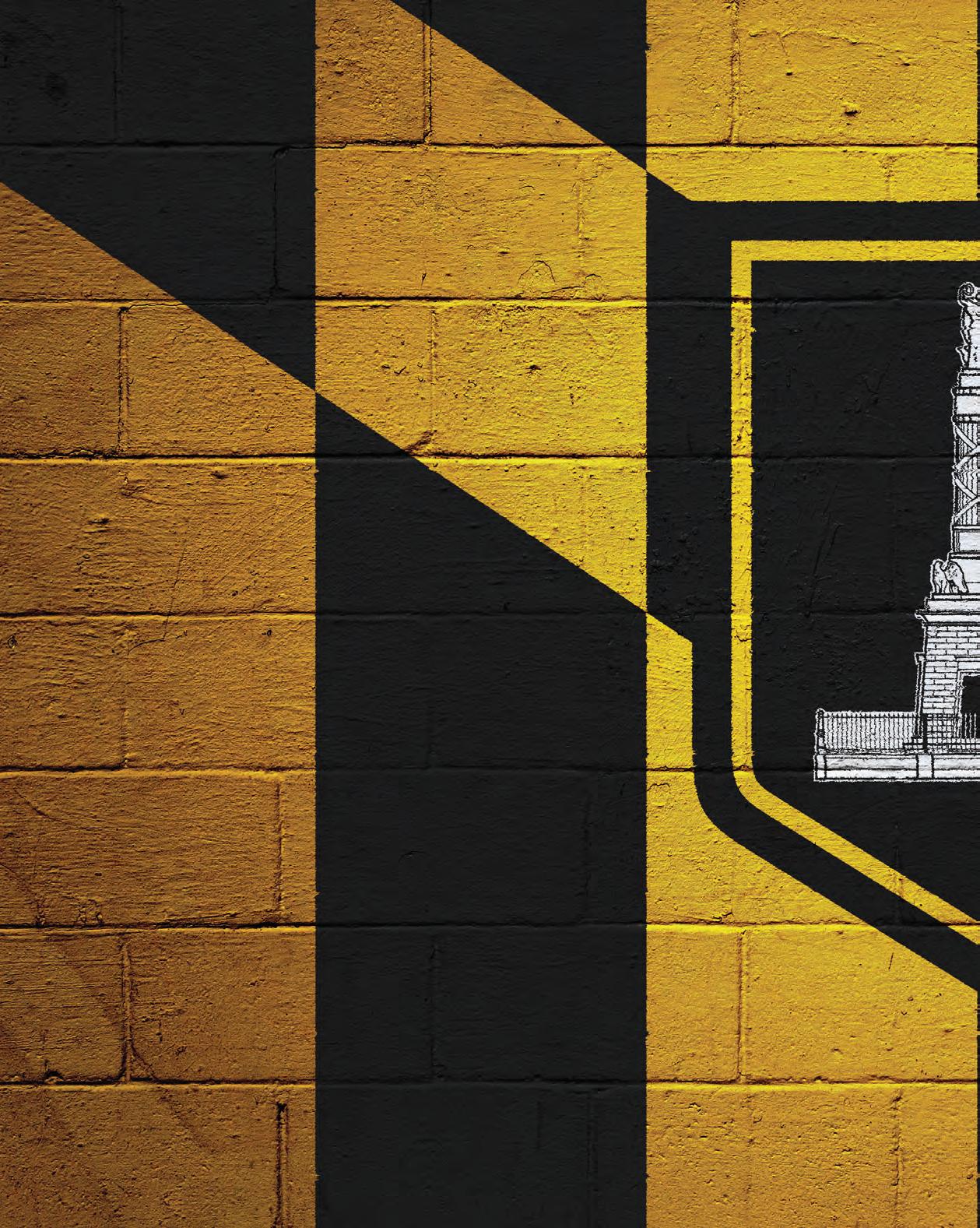
Professional Email:
Career Goal or Resume Objective:
Example: “To secure a part-time job that helps me grow my skills in technology and customer service.”
WORK EXPERIENCE / SKILLS
Company & Job Title (1):
Dates (Start – End): _____________________________________________________________________________________________________________
Duties (3-5 bullet points):
•
• • Skills & Special Training:
Company & Job Title (2):
Dates (Start – End): _____________________________________________________________________________________________________________
Duties (3-5 bullet points):
•
•
• Skills/Special Training:
EDUCATION
School Name: _________________________________________________________ Graduation Date (actual or expected): ______________________
Relevant Courses (AP, Honors, College):
GPA (if 2.5+): ________________ Certificates/Licenses:
EXTRA-CURRICULAR & INVOLVEMENT
(List group/role/years involved. Check all that apply.)
• Sports: ______________________________________________
• Academic Groups: ____________________________________
• Foreign Language Clubs: _______________________________
• Music/Talent Groups: _________________________________
• Career Training Programs: _____________________________
• Community Service: __________________________________
• Faith-Based Involvement: ______________________________
• Hobbies (related to job): _______________________________ AWARDS / HONORS / ACHIEVEMENTS
(List up to 3 strong examples that show you stand out!)
• •
• Maryland Mindset:
Your resume is more than words — it’s your impact, your potential and your future. Start strong, stay real and show up ready.
Your resume is more than a piece of paper — it’s a personal billboard that tells schools, jobs and internship programs exactly who you are and what you bring. Whether you’re applying to college, your first job or a leadership program, this is how you influence your future.
9 Be honest — all info should be true and complete
9 Keep your layout consistent, neat and easy to scan
9
Proofread! Spelling and grammar mistakes
Is your email professional?
Avoid nicknames or jokes. Try: firstname.lastname@gmail.com

Played sports, joined a club, or won an award?
Mention your leadership roles and what you learned.
Helped at your church, school, or local center? Include it! Explain your role and what skills you picked up.
Employers love to see real-life qualities like: Responsibility, time management, teamwork, leadership, creativity, multitasking
INTERESTS
Add interests that match the job or career field.
Want to work at a vet clinic? Mention your passion for animals.
444 Main Street Ellicott City, MD 21042 (410)-555-6789 jane.eyre@gmail.com
Education
CentralHighSchool
Perfect Attendance during first semester
CTE Nursing Program
Expectedgraduation: May 2025
Employment
Ellicott City Community Pool, Lifeguard
16 hours of work every weekend
Trained in CPR and First Aid
Maintained pool cleanliness and safety
Activities
Pending 2026
EDUCATION +
GPA
Only include GPA if it’s 2.5 or higher.
Highlight CTE, Honors, AP, or College-Level Courses relevant to the job or program.
WORK EXPERIENCE
Summer 2024
Don’t have much experience yet? No stress. Focus on your skills, volunteer roles, and achievements.
J.V. Soccer, Team Captain 2022-2023
8 hours of practice and two games every week
Led team to 14-2 record
Highest goal percentage on team
Won Spirit Award at end-of-year banquet
Helping Hand Nursing Center, Volunteer 2021-2022
4 hours of volunteer work twice a month
Talked to residents, designedactivities and assisted nurses
Recruited two more volunteers
Skills
Bilingual: Spanish and English
Basic computer skills, including Microsoft Word and PowerPoint
Organizational skills learned through balancing school, sports and family obligations
Dedication and hard work proven through athletic success.
Interests
Reading
Photography
Spending time with family
Maryland Mindset:
DATES MATTER
Always include start and stop dates. Shows consistency and commitment
From Annapolis to Hagerstown, teens across the state are building bold futures. You don’t have to wait to get started — your brand is already in progress.
Interview Prep Worksheet – Show Up. Speak Up. Stand Out.
From Ocean City to Baltimore, Maryland students are stepping up. Interviews are your chance to prove you're one of them. Preparation = Power. Want to impress the room? Start here.
“Fail to Plan = Plan to Fail”- Use these 4 power moves to prepare like a pro: RESEARCH – What’s the company/organization all about?
ANSWERS – Think through common questions and tailor your answers to the job.
EXAMPLES – Use real-life stories to prove your skills.
PRACTICE – Rehearse with a friend, family member or record yourself!
INTERVIEW PREP: FILL IT IN & OWN YOUR STORY
1. Introduce Yourself: Who are you, and what’s one or two highlights that show you’re ready for this role?
2. What are your future goals? (College, career, new skills or working right after graduation?)
3. Why should they hire you? (What makes you interested in this role, and what do you bring to the table?)
4. What are your strengths? (Real strengths — with a story or achievement to back it up.)

6. Share a teamwork or leadership example: (Think about group projects, clubs, sports or volunteer work.)
5. What’s one weakness you’re working on? (Be honest — show growth, not perfection.)

7. How did you handle a tough situation? (Problem-solving is a skill — show you’ve got it.)
8. What hobbies relate to the job? (This is where swimming, coding, writing or music could help you shine.)
9. Questions YOU want to ask: (Be curious. It shows you’re serious.)
Maryland Mindset: Don’t wait for the door to open — knock. Then step in ready.
Whether you’re repping Baltimore, Prince George’s or the Eastern Shore, it’s time to own your moment. Here’s how to bring your A-game to any interview, internship or college meeting.
Your presence is your power. Make them feel it before you even speak.
• Dress the part. Clean, sharp and confident. Show you mean business.
• Be a notetaker. Bring a pen & notebook to show you’re paying attention.

• Start strong. Shake hands firmly (if in person) or make eye contact via webcam. First impressions stick!
This is your moment — sell your story like a pro.
• Do your homework. Research the company or school. What do they stand for? Where do you fit in?
• Bring your resume. Even if they already have it — bring one to hand over.
• Prep your answers. Think ahead! Practice answering common interview questions with confidence.
Need help? Sample questions on page 30.

Keep the energy going after the interview.
• Say thanks. Always thank the interviewer before you leave. Gratitude = professionalism.
• Follow up fast. Send a thank-you email or note within 24 hours. Mention something you talked about to keep it personal.
Stay ready. Let them know you’re excited and available to move forward!

Maryland Mindset:
From Thurgood Marshall to Jada Pinkett Smith, Marylanders are known for turning up and standing out. Use your voice. Own your power. And never underestimate the impact of being prepared.
By Lupe Duarte, MBRT Intern & NGS Scholar
When I got accepted into the University of Maryland, my mom said, “I told you, I told you you’d get in,” as if she had always known. But behind her calm voice, I could feel something deeper — fear, pride, maybe even sadness. That moment wasn’t loud or dramatic, but it stayed with me. It was the first time I really paused and understood what this meant, for both of us.
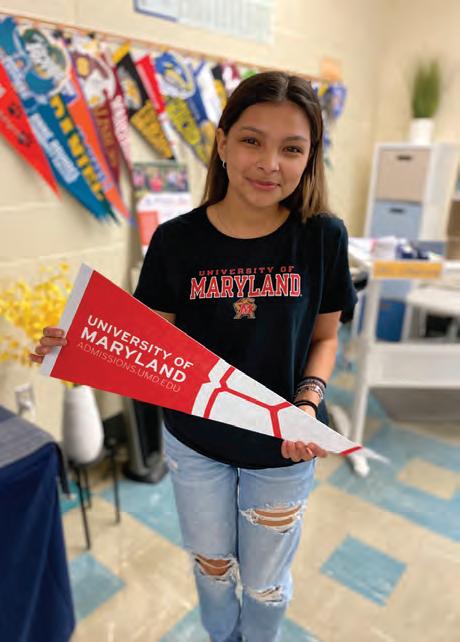

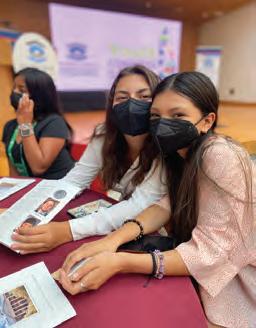
I wasn’t sure I was going to get in because no one
around me had done it before. College always felt like something so far away it didn’t seem real, like I was trying to open a door without even knowing if I had the right key.
My mom wasn’t very involved in the shopping or the preparations for the move. I felt like she was avoiding the reality that I was leaving. Maybe she wasn’t ready. At home, as the oldest daughter, I’ve always been the person everyone turns to for everything: translating calls, helping with paperwork, managing appointments. Leaving meant stepping away from all that, and I felt like I was leaving behind who I had always been, even though I also knew I was taking a step toward who I was meant to be.
Move-in day went by in the blink of an eye. When my family left and the room fell silent, I sat on the edge of
the bed and cried, really cried. The weight of everything finally hit me: the distance from home, the responsibility, the unknown. The silence didn’t bring me peace. It was heavy.
My mom always said, “Sometimes you have to take a step back and let them fly.” I didn’t understand it until I left, but that’s exactly what she was doing.
Being first-generation means carrying more than your own dreams. It means holding the sacrifices, hopes, and silent fears of the people who brought you here. It means being the first to speak up when others can’t. There is so much pride in that, but it also means building something new.
There aren’t many people who look like us in the classrooms. But that’s why we’re here. Education isn’t just about degrees; it’s about power, awareness, and transformation. It’s how we break cycles. It’s how we change the story.
Yes, this path is hard. And yes, sometimes it feels lonely.
But I don’t walk it alone. I carry my mother’s strength, my family’s resilience, and my own belief in myself. Every step I take, every class I pass, every door I open, is for all of us.
If you come from a story like mine, remember this: your presence in these spaces is already a form of resistance. Your education is not just for you; it’s for those who came before and those who will come after. Your voice matters. Your dreams matter. You belong here.
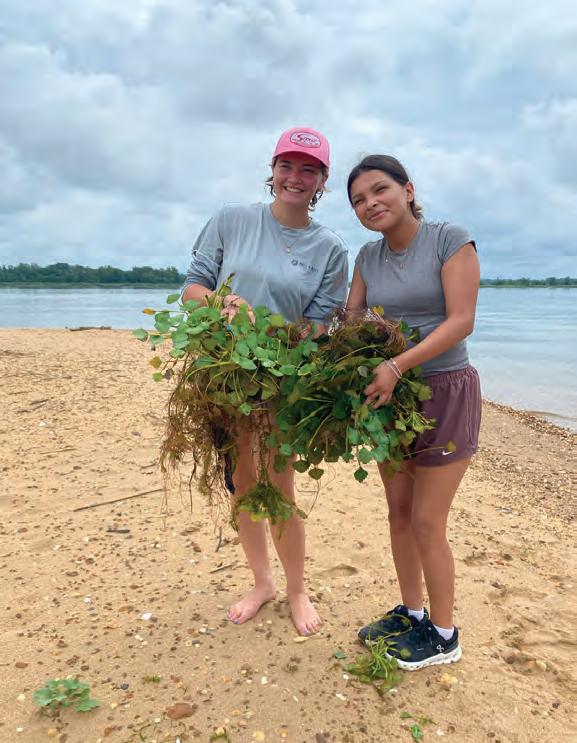
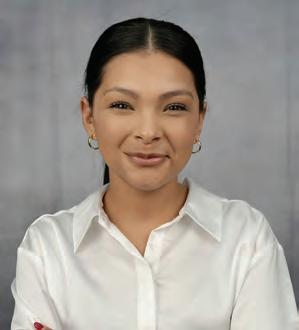
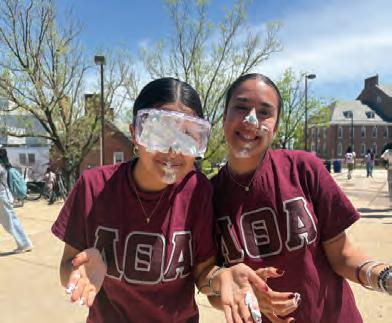

Explore how military service can shape your future. As a hub of national defense, medical innovation, cybersecurity and aerospace technology, Maryland plays a leading role in protecting and advancing our country. From Fort Meade to Aberdeen Proving Ground, students from every region of Maryland have stepped up to serve—and so can you.
Thousands of Americans choose to serve, and that choice has opened doors to education, global travel, personal growth and rewarding careers in a wide range of fields. Could your path to success include a uniform? Let’s find out.
You must be a U.S. citizen to join or be a lawful permanent resident with a valid green card. You may enlist at 17 with parent consent or 18 or older without and have a High School diploma or GED.
Joining the military offers an opportunity to contribute to vital missions such as developing innovative defense gear, aiding healthcare systems, safeguarding food and medicine, and tracking climate change patterns.
The military can help you not only establish a career, but further your education. The military offers many educational benefits from financial aid to loan repayment programs. Deployment is a BIG factor in this type of career, various branches send people to different areas from Germany to Japan!
• Fort Meade: Cybersecurity & Intelligence
• Aberdeen Proving Ground: Research & Development
• Naval Academy (Annapolis): Leadership & Education
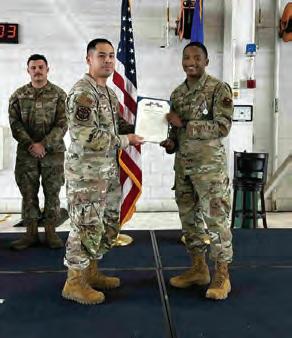
There are several different branches in the military.
Air Force
(https://www.airforce.com/find-a-recruiter) Army
(https://www.goarmy.com/locate-arecruiter.html)
Coast Guard
(https://www.gocoastguard.com/Careers)
Marines
(https://www.marines.com)
Navy
(https://www.navy.com/local)
Space Force
(https://www.spaceforce.com/how-to-join/ enlisted-guardians)
Step 1: Take the Armed Services Vocational Aptitude Battery (ASVAB) to determine your qualifications.
Step 2: Pass the Physical Examination.
Step 3: Meet with a Counselor and determine a career.
Step 4: Take the Oath of Enlistment.
Step 5: Receive orders for basic training and start on your path towards your new chapter in life.

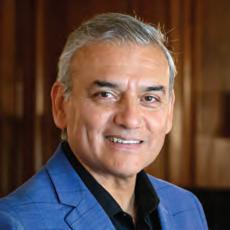
Marco A. Vice President, p.36

Vernesha M. Medical Doctor p.37

Travis and Yussy M. Owners p.38
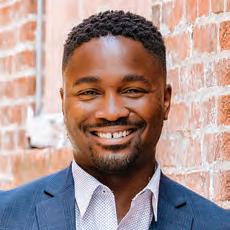
Sam S. Co-Founder and Partner p.40
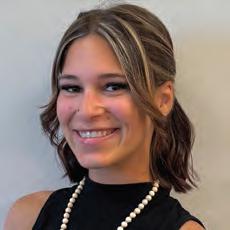
Alexcia R. Fourth Grade Teacher p.41
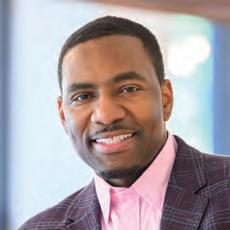
William E. Director, Governmental and External Affairs p.42
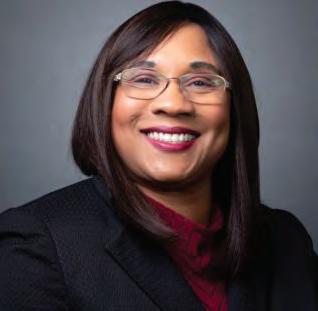
Patricia F. Chief Financial Officer p.43
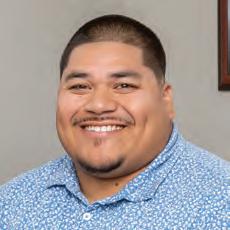
Jesus C. Senior Marketing Associate p.44
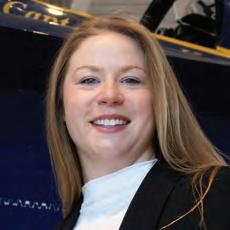
Bobbie D. Mechanical Engineer p.45
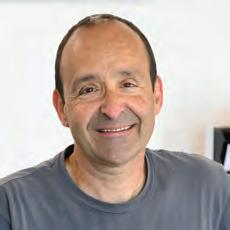
Cyrus E.-M. Founder and President p.46

Julie C. Founder/ Executive Director p.47
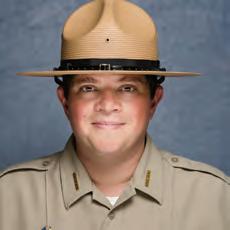
Cliff P. Park Ranger Manager I p.48
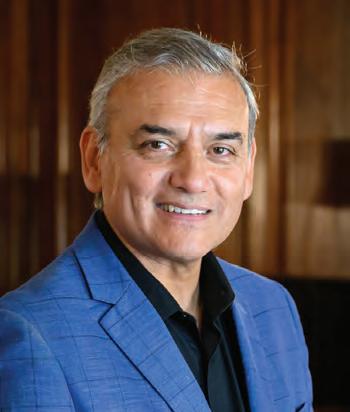
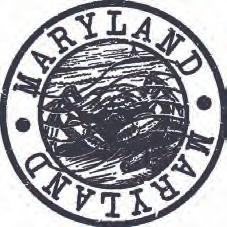
How has living and working in Maryland shaped your personal or professional journey?
Living and working in Maryland has been an amazing experience. I moved from Northern NJ and worked in NYC, moved to MD in 2005 to work on major mega infrastructure projects. The first mega project was the I-95 Express Toll Lanes in the White Marsh area. Since then, I have been fortunate to work on almost all the MEGA infrastructure projects in Maryland.
President, WSP

What challenges did you face in high school? How did overcoming them help you grow stronger or more confident?
In high school, I did not have anyone to guide me or mentor me. When I went into college, I had to do it all by myself. Having mentors is very important, and that is something we as professionals need to be available to do and show students the available opportunities.
What opportunities helped you to get where you are today? It is important to be mentored and get involved in internships. I did not have those opportunities and I had to learn as I went along the way.
If you could give students one piece of advice to help them own their future, what would it be?
To find a mentor, find an internship and get involved in professional associations’ student chapters. Volunteering. Volunteering will open doors and help you meet people who can be influential in future opportunities and career. PERSISTENCE PREVAILS!!!
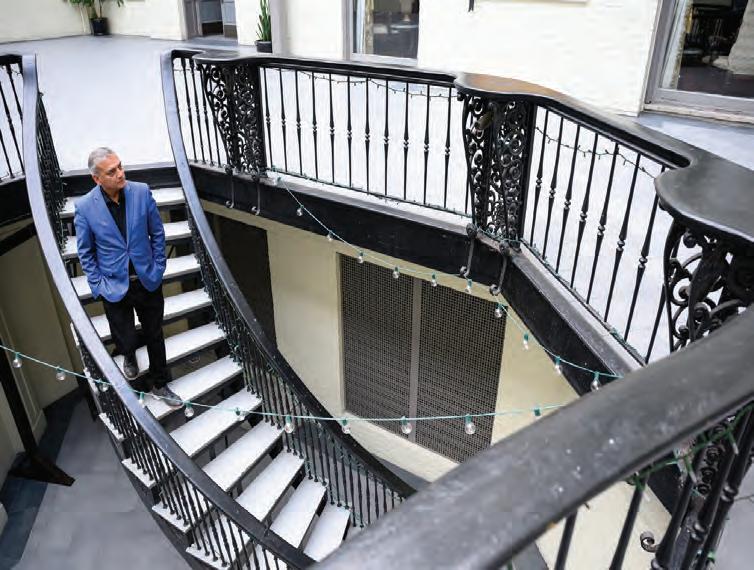
What is a typical workday like for you?

My job is not typical. As an engineer, I work as a Program Manager on infrastructure projects which includes meetings, coordinating tasks, coordinating sub-consultants and writing proposals. I also dedicate time to volunteer work, including leading the Maryland Hispanic Chamber of Commerce, serving on seven boards and coordinating the Engineers Week program for the Engineering Society of Baltimore.
What skills, habits or mindset helped you succeed? How can students start building those now?
People Skills, good listening and learn, learn, learn.


What was your favorite subject in school? What did you enjoy about it?
Science! I was fascinated. I knew I wanted to become a physician since age 9. I particularly liked chemistry and biology!
How has living and working in Maryland shaped your personal or professional journey?
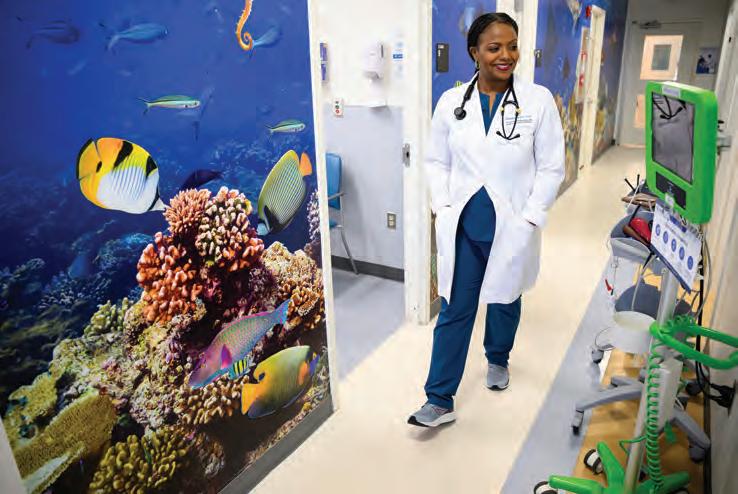
My husband’s military assignment brought us to Maryland, but it has truly become like home. I work for a wonderful organization whose primary focus is health prevention and helping patients live longer and healthier! We are, of course, fortunate enough to live close to DC and have exposure to great museums, food, music and culture, which is a bonus! I love that I live in the same community as many of my patients. I see them at the gym or church!
What challenges did you face in high school? How did overcoming them help you grow stronger or more confident?
I lived on the west side of the inner city of Chicago, stricken with poverty and gang violence. Fortunately, my academic acumen allowed me to attend a magnet high school on the north side of the city. I had to commute 45 minutes each way on the city buses to get there. I transitioned from a small private school of 200 students to a high school of 4,000 diverse students. I kept myself busy by staying involved in extracurricular activities like the pom-pom dance squad, gospel choir, the Black student union, Pre-Med Club, sign-language club and working after school at Champs Sports. I was thankful to have a strong family support system. Staying busy kept me out of trouble!
What opportunities helped you to get where you are today?
Our high school had a Pre-Med Club that gave us access to medical professionals who would come and speak to us about their path in medicine. In college, I worked as a student health aide in the dorms, a nurse’s aide in the Student Infirmary and volunteered in neighborhood hospitals. I took advantage of any opportunity to be around medical professionals.
If you could give students one piece of advice to help them own their future, what would it be?
Whatever you do in life, do not stop learning. The world evolves and technology changes. Remain curious and never stop asking questions.
What is a typical workday like for you?
Four days a week, I am in the clinic seeing about 19 patients a day in the outpatient setting. As a Family Medicine Physician, I see children and adults. One exam room can be a newborn baby there for a well-baby exam and the next exam room could be a 90-year-old patient with dementia. Although my traditional office hours are 8-5pm, my days can be filled further answering patient messages, prescribing refill requests, reviewing specialists’ notes or reading a new article about a new medical treatment.
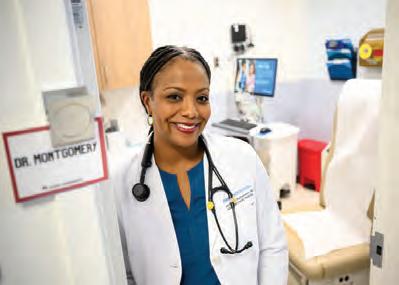
What are the most important skills you use at work?
Active listening, critical thinking, good communication and time management.
What skills, habits or mindsets have helped you succeed? How can students start building those now?
There is an abundance of information to learn in medicine. It is truly a career that involves lifelong learning. Take efficient notes, review new material and do homework the same day it is assigned. Break large assignments into smaller tasks. Remain curious! Remember the importance of taking care of yourself physically, mentally and spiritually.

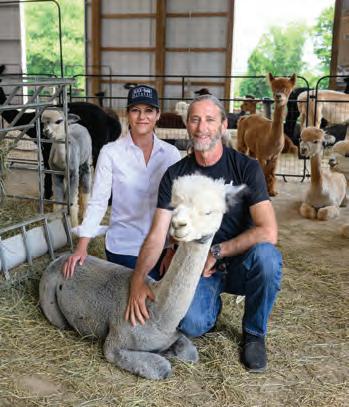
What were your favorite subjects in school? What did you enjoy about them?
Travis (T): History and geography for fascination of earth, history and location.
Yussy (Y): Art, creating multimedia pieces and creative freedom of expression.
How has living and working in Maryland shaped your personal or professional journey?
Living and working in Maryland after starting our business in Texas has taught us to fine-tune our professional goals, as business is very competitive. Understand your core values and stay true to your mission.
What challenges did you face in high school? How did overcoming them help you grow stronger or more confident?
T: Trying to fit in, finding your way and gaining confidence to be yourself. Staying true to my core values helped me find myself.
Y: Maintaining focus during high school. I overcame them by starting college early. Everyone has a different path!
What opportunities helped you to get where you are today?
T: Sports was a large influence in my competitive nature and social awareness, teamwork, communication skills and reliability.
Y: Interior design internships and mentors were instrumental in beginning my career in interior design; in alpacas and agriculture, other farms have been incredibly supportive in helping us grow and learn more about our industry.
If you could give students one piece of advice to help them own their future, what would it be?
T: Trust your instincts and intuition!
Y: Let the word ‘no” motivate you further. Be disruptive!
What is a typical workday like for you?
Our day-to-day varies! It typically starts with feeding alpacas, always observing their behaviors to ensure everyone is happy and healthy. Then, manure pickup and cleaning, hosting and educating
visitors through our agri-tourism, networking, purchasing, merchandizing, running retail operations and business meetings to keep our team on track and focusing on growth and improvement every day.
What are the most important skills you use at work?
T: Math, communication and awareness of surroundings.
Y: Creativity, communication and motivation.
What skills, habits or mindset helped you succeed? How can students start building those now?
T: Be informed! Be skeptical of the information you hear about and learn it for yourself.
Y: Consistency. Showing up every day for your business and staff, remaining positive and uplifting to motivate your team.
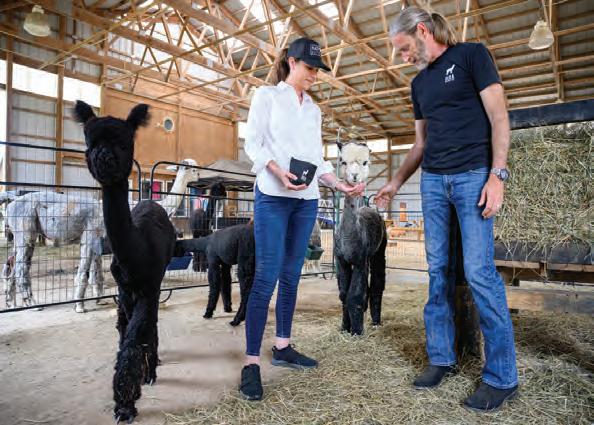
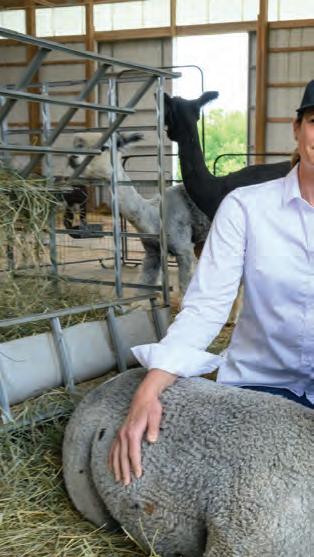
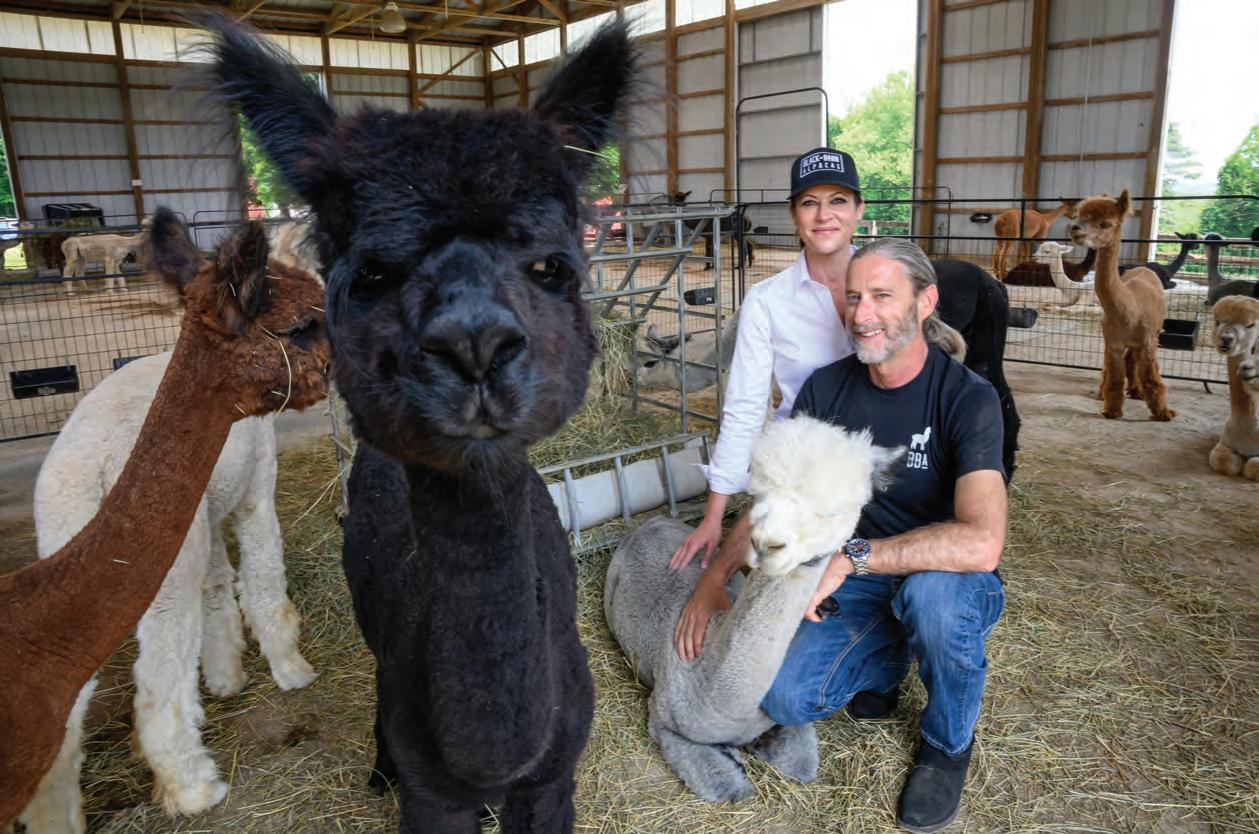

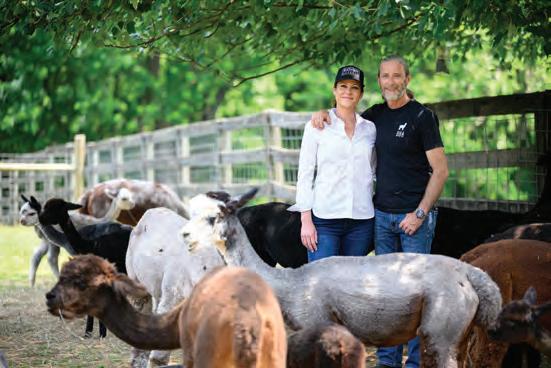
What’s Up With Alpacas? Learn About Black Barn’s Breeding Program! At Black Barn Alpacas, we raise happy, healthy black and gray alpacas through kind, smart breeding. Our goal is champion alpacas with soft fleece, using sustainable farming practices that care for the animals and the planet. Fun Fact: Alpacas hum to communicate with each other—especially when they’re happy or curious!
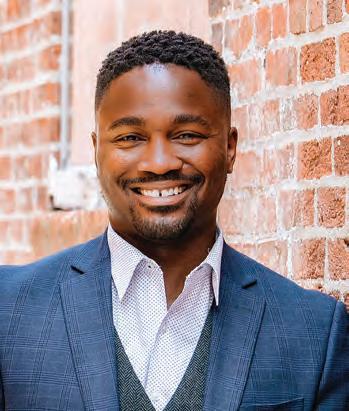

What was your favorite subject in school? What did you enjoy about it?
History. I loved learning about different cultures and their interactions with each other throughout history. It was a good reminder of just how big and diverse the world is, a perspective that was important for me, given that I grew up in one of the least populated Maryland countiesTalbot County.
How has living and working in Maryland shaped your personal or professional journey?
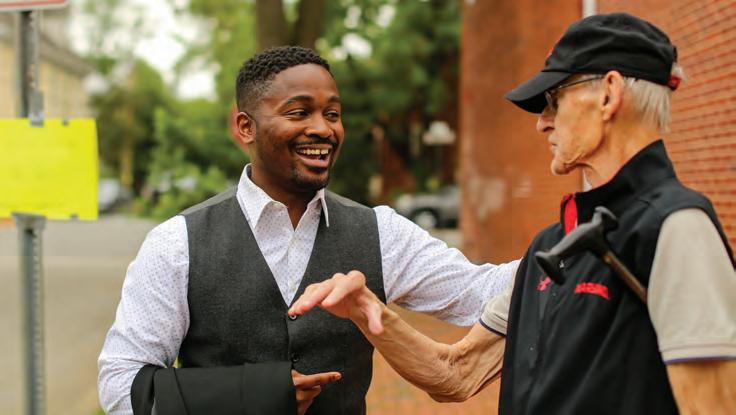

Maryland has diversity in everything. There is something for everybody in this state, so it is easy to find one’s “fit”. Maryland has many opportunities to leverage to find success. The state is large enough that there are plenty of corporate ladders to climb for aspiring CEOs. But the politics of the state is refreshingly approachable, so those who have political aspirations will find it easy to throw their hat in the ring and get involved.
What challenges did you face in high school? How did overcoming them help you grow stronger or more confident?
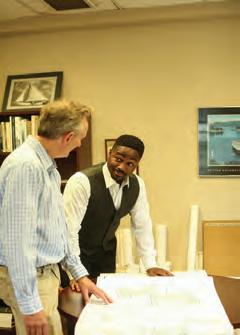
I was not the best standardized test taker in school, so my SAT score was much lower than I was hoping for and lower than most of my friends. I thought I was inferior academically and this weighed me down psychologically. My scores were good enough; however, to get me into the college that was my first choice and I thrived when I enrolled. So much so that I was an A/B student in college and graduated with a higher GPA than most of the same friends I graduated high school with, who had higher SAT scores. Little did I know at the time that standardized tests like the SAT and ACT alone are poor indicators of how one will do in college. What is more important is grit, determination and focus. When classes got challenging (like physics!), I did not fold and drop the class like 50% of my classmates. I rose to take the challenge head-on without complaint and studied hard. My first exam results in the class were a 32%. I aced my final and finished the class with a B-minus overall. Having done what I thought was impossible at the time, I am confident whenever I find myself in a challenging situation.
What opportunities helped you to get where you are today?
I am so grateful to my career counselor in high school who said to me, “You’d do very well at Elon University.” I had never heard of the school until she mentioned it, so I checked it out and my family and I went to visit. She was indeed right and I thrived there. So much so that I attribute much of what I have accomplished to my time at Elon University. Without that well-timed and well-placed recommendation from someone I trusted, my life would likely look quite different. Listen to the people who are closest to you–they likely know things about you that you have not noticed.
If you could give students one piece of advice to help them own their future, what would it be?
Life is not a linear progression. There will be difficulties, adversities and setbacks. Once you understand this and learn to “ride the wave” while remaining grateful, humble, yet determined, you will find that life is an exciting journey. Enjoy the ride.
What is a typical workday like for you?
My work involves helping businesses and organizations solve complex problems. My days consist of researching problems and corresponding solutions, engaging with clients to ensure they are able to implement solutions and then promoting client successes as case studies on social media sites and the press.
What skills, habits or mindset helped you succeed? How can students start building those now?
Curiosity has been a skill, habit and mindset that has propelled me thus far. Curiosity compels me to research and learn new things. Through the act of learning, I then want to implement, so the follow-up action I take comes in the form of experimentation or giving what I studied a try. New skills or ideas emerge from this, which may then lead to a newfound hobby or entrepreneurial venture. Curiosity has caused me to start three business ventures and I am now launching a nonprofit. I have also picked up several new hobbies that I have enjoyed immensely. Never be stagnant–always try new things.
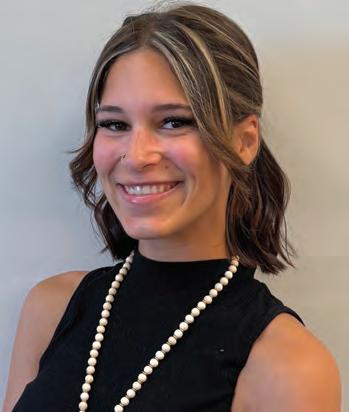

What was your favorite subject in school? What did you enjoy about it?
I loved science because every class felt like stepping into a new mystery that needed solving. The collaborative aspect, where my classmates and I would investigate, hypothesize and piece together clues, made the process of understanding how the world works even more exciting. It wasn’t just about learning facts; it was about the shared thrill of discovery at your fingertips and the excitement in uncovering the answers.
How has living and working in Maryland shaped your personal or professional journey?
Washington County Public Schools
Washington County
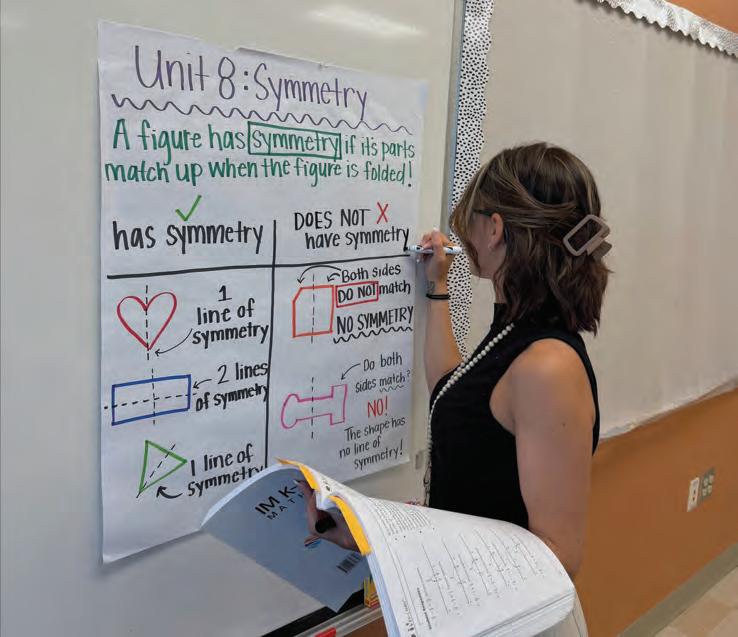
Living and working in Maryland has greatly shaped my professional journey because of the amazing teachers I had here. From elementary school through college, certain educators truly stuck with me, sparking my curiosity and showing me the incredible impact a dedicated teacher can have. Their passion and genuine care for students were so inspiring that I decided one day, “I want to do what they do.” It was an amazing feeling growing up with such guidance and belonging from teachers in school. I knew I wanted to become the kind of teacher students would look back on and say, “I loved their class.” Maryland’s educators truly set me on this path. What challenges did you face in high school? How did overcoming them help you grow stronger or more confident?
High school was a period of real uncertainty and indecisiveness for me; I just didn’t know what I wanted to do after graduation, and it felt like everyone else had their future figured out. It wasn’t until my senior year that I finally decided to explore education, joining a program at school even though it was too late to earn credit. That decision was a turning point, as stepping into the classroom and working with teachers and students made something just click. This initial experience sparked a passion that I continued to pursue through college, and each time I was teaching, I felt myself truly glowing, knowing I was where I was meant to be. Overcoming that early indecision and taking a chance on something new, even when it felt late, ultimately helped me discover a profound sense of purpose and significantly boosted my confidence in my chosen direction. What opportunities helped you to get where you are today?
I had the pleasure of working alongside several amazing teachers through internships. These experiences allowed me to learn so much about the “behind the scenes” of teaching in several grade levels. These opportunities also allowed me to identify where I felt I belonged as an educator. I had the chance to work with students’ grades K-5 before deciding where I felt I could make the biggest impact. When I began applying for jobs, I reached out to so many educators I worked with to speak on my behalf. I felt like I had a team
within teaching and it branched beyond one school or one grade level. Each member of that team played a key role in who I am as an educator today. What is a typical workday like for you?
My school day starts with a 5:30 AM alarm, heading in for a 7:00 AM start. We immediately dive into ELA skills, dissecting stories and crafting arguments. Around mid-morning, I love watching students play at recess and beating them at races. Afterward, we might conduct a mysterious science lesson or travel back in time to learn history, bringing lessons to life. When I send students to Encore, it’s my focus time to complete any needed work around the classroom. After a quick lunch break, the day concludes with math, tackling problems and building our skills. What skills, habits, or mindset helped you succeed? How can students start building those now?
The most important skill that has helped me succeed is adaptability. In teaching, no two days are truly the same; there are always unexpected twists. Instead of giving up because of an “off day” or challenges, I’ve learned to view them as chances to be creative and find new solutions. This mindset allows me to embrace flexibility, seeing unexpected turns not as roadblocks but as different paths for me to try. Students can start building this now by embracing a “growth mindset”. By understanding that we learn from mistakes, and seeing challenges as opportunities to grow, rather than limitations and setbacks. Don’t be afraid to try new approaches when something isn’t working and remember that every “off day” is just a chance to learn and have a better tomorrow.
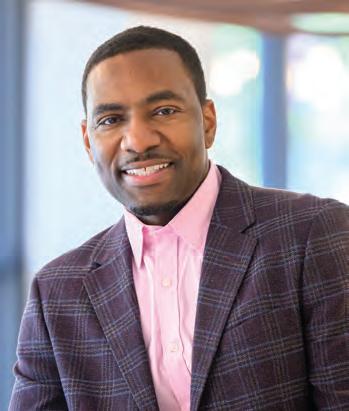

What were your favorite subjects in school? What did you enjoy about them?
Calculus and computer science because I could solve complex problems.
How has living and working in Maryland shaped your personal or professional journey?
I have been living and working in Maryland my entire career. It has been a blessing to be able to work, live and serve in such a diverse and growing community that is committed to empowering our youth.
What challenges did you face in high school? How did overcoming them help you grow stronger or more confident?

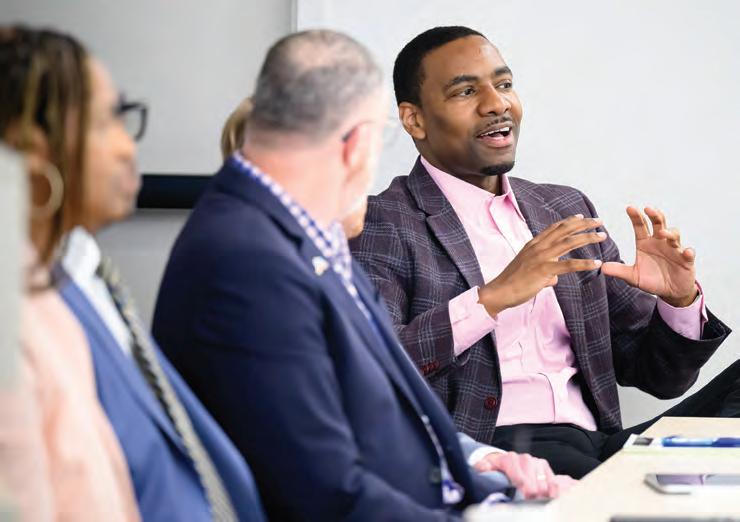
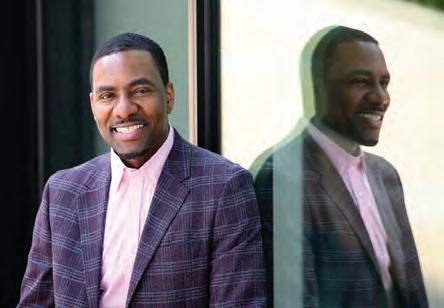
My biggest challenge was being able to focus on longterm success and not short-term satisfaction. I was able to do this by ensuring I created a five-year plan and by continuing to ask myself: Does this help you get closer to those goals? Creating self-discipline will help you stay on track, even on days when you may lack the motivation to do so.
What opportunities helped you to get where you are today?
Having mentors who always wanted more from me than they wanted for themselves helped me immensely and access to funding through scholarships is due to the financial burdens that my family faced.
If you could give students one piece of advice to help them own their future, what would it be?
I will use basketball as my analogy for this question. You will miss 100% of the shots you do not take. So, you might as well shoot. More importantly, you will only regret and remember the shots that you do not take, not the risk you did take or the shots you missed, because even when you miss, it brings you closer to your goal.
What is a typical workday like for you?
I love my job. Every day, I strive to help my community, my customers and those who live in the DMV region use energy more efficiently and cleaner each day. I work with local and state elected officials to create meaningful legislation that will help the State of Maryland reduce its carbon footprint, become more sustainable and create a clean energy economy.
What are the most important skills you use at work?
Three Skills that I love, that require no talent or special abilities but will make the world of difference on how you separate yourself from your peers: your Effort, your Attitude and Being on Time.
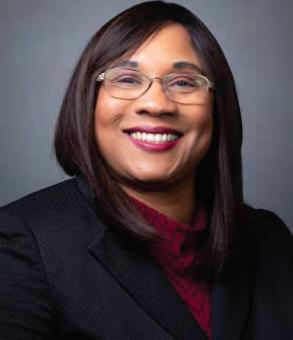

What were your favorite subjects in school? What did you enjoy most about them?
Business and Algebra. I loved solving equations and was a member of the Exploratory Business Careers Club (EBCC). EBCC helped us to explore careers in business. I learned about business dress, resume writing and I acquired real work experience as an intern at IBM during my junior and senior years of high school.
How has living and working in Maryland shaped your personal or professional journey?
Maryland Public Television
Baltimore County/City

Living in Maryland offered numerous opportunities after I graduated from college. The cost of living was lower in Maryland compared to New York. I decided to live here because the professional landscape offered the opportunity to pursue multiple professional career paths in the financial sector to include private industry, banking, government and entrepreneurship, to name a few. I could also pursue my vocational aspirations by volunteering in the local community and hospitals while fulfilling my passion to help people. What opportunities helped you to get where you are today?
I was an average student in high school. I came from a workingclass family and the highest priority was not post-secondary education. I did not graduate from high school with access to a prepaid trust or college fund. Community college was not the popular route for securing a college education and it was frowned upon. I was able to secure a small scholarship that paid for 1.5 years of community college. When the scholarship was exhausted, I had to go to work. My drive and passion were always to complete a four-year degree to pursue my dreams and secure my future. I walked away from my first job to follow my education goals. I took the leap and moved to Maryland to earn an undergraduate degree in accounting at Morgan State University.
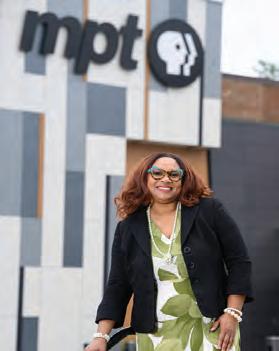
If you could give students one piece of advice to help them own their future, what would it be?
The sum of my life experiences has helped me to get to where I am today. I benefited greatly from my high school internship at IBM, volunteering on the weekend in our
local hospital and nursing home, being connected in my faith community, and leveraging those relationships to find learning opportunities during the summer and spring breaks. I also took advantage of free training in the libraries and found opportunities in the community to volunteer as the community association president, coordinate community clean-up activities and feed the homeless, to name a few. Volunteering always kept me connected and humble.
What are the most important skills you use at work?
My day begins with setting intentions and writing daily goals in my journal, often during early morning reflection. I collaborate with department vice presidents and fiscal liaisons on forecasts, budgets, spending, and revenue-generating activities. During the legislative session, I represent MPT at General Assembly budget hearings. I also actively coach and encourage my team to pursue professional and personal growth opportunities.
What skills, habits or mindsets have helped you succeed? How can students start building those now?
• I regularly read and listen to audiobooks to sharpen my skills.
• Effective time management is key to making the most of each day
• Identify your strengths and actively seek ways to develop them.
• I view every outcome—positive or negative—as a learning opportunity.
• I value life’s small joys; gratitude and rest are essential for growth.
• Everything you need is already within you—like a seed, you just need the right environment to thrive.
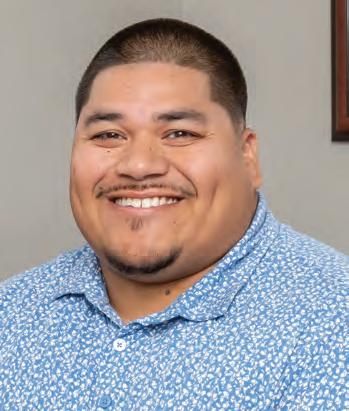

What were your favorite subjects in school? What did you enjoy about them?
Math and technology were my favorite classes in school. I liked how they challenged me to think through problems and come up with solutions. I have always enjoyed that kind of problem-solving.
How has living and working in Maryland shaped your personal or professional journey?
From city life to rural farmland and home on the Eastern Shore, Maryland has introduced me to diverse people, cultures and ways of life. This diversity has shaped me, teaching me to be adaptable and respectful of others’ perspectives. Maryland has helped me grow personally and professionally and I am proud to be part of such a dynamic state.
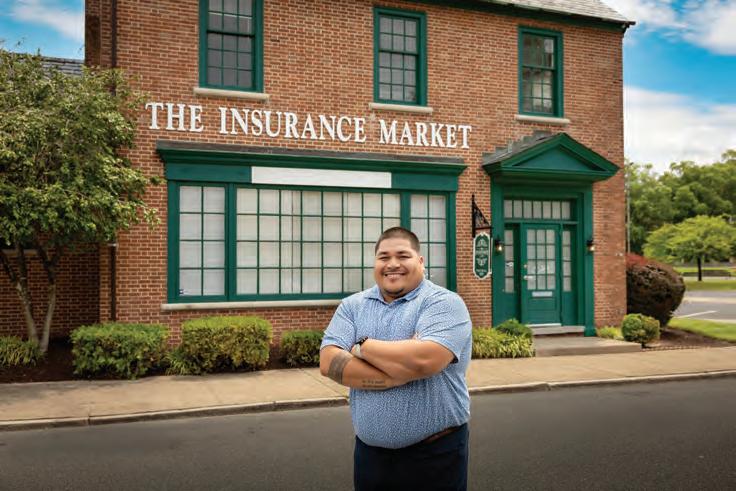
work whenever I can. More than anything, he motivates me to be the kind of person my own two children can look up to one day, just like I look up to him.
What challenges did you face in high school? How did overcoming them help you grow stronger or more confident?

Going into high school, I had a clear goal: to be the first in my family to go to college and graduate. That goal came with a lot of pressure, but I also knew I had people supporting me. I took things one day at a time, stayed focused and did my best to keep moving forward. That journey helped me build real confidence. I proved to myself that I would not give up, no matter how tough. I still carry that mindset today, always pushing myself to grow in both my personal life and my career.
What opportunities helped you to get where you are today?
My biggest mentor has always been my grandfather, Edward Cruz. He grew up with very little but never let that stop him. He worked for over 40 years as an engineer at NASA, stayed committed to his family and always found ways to help others. From him, I learned the value of being selfless, respectful and strong. His example inspires me to stay active in my community and give back through my
If you could give students one piece of advice to help them own their future, what would it be?
Be true to yourself and tap into the inner drive that pushes you to become the person you have always dreamed of being.
What is a typical workday like for you?
The best part of my job is that no two days are the same. One day, I might be working on coverage for a local farm owner, the next I could be handling insurance for an HVAC business, and a few days later, I could be focusing on a golf course by the water. I collaborate closely with my sales team and our partnered carrier underwriters to create customized insurance policies and risk solutions that ensure our clients’ businesses are fully protected.
What are the most important skills you use at work—and how can students start building those now?
Problem-solving, collaboration and adaptability are essential in my role. Customizing insurance policies for different businesses means thinking creatively to meet unique needs, working closely with teammates and adjusting quickly to new challenges. These skills—along with resilience—have been key to my success. I’ve also learned that mistakes are part of the journey, as long as you learn from them and keep growing. Students can build these skills now by tackling projects that require critical thinking, staying committed through setbacks and stepping outside their comfort zones through new activities or volunteer work.through different subjects, activities, or volunteering.
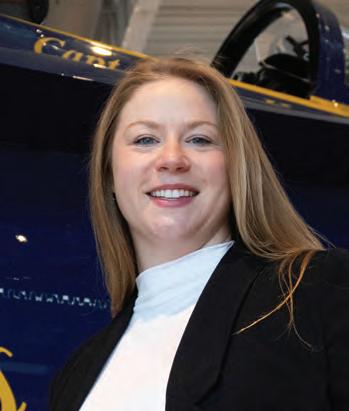

What were your favorite subjects in school?
What did you enjoy about them?
All sciences, especially Biology. I enjoyed how what I learned in the classroom helped me better understand the workings of the world around me.
How has living and working in Maryland shaped your personal or professional journey?
Greatly! The Patuxent River Naval Air Base, located in Southern Maryland, created a program called the Pathways Program to employ engineers from the Southern Maryland area to increase the retention of younger engineers. By attending the College of Southern Maryland, I learned about this program where the US Navy would pay for my last 2 years of college, provide me with a Co-op working as an engineering intern during school breaks, and a guaranteed engineering job after graduation if I successfully earned a degree in mechanical engineering. I may not be a mechanical engineer had I not grown up in Maryland, specifically Southern Maryland and had this opportunity from NAWCAD PAX River.
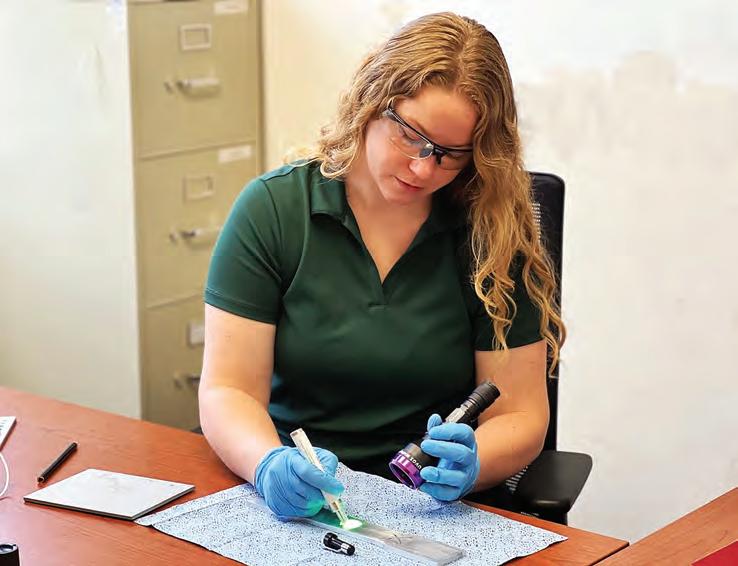
What challenges did you face in high school? How did overcoming them help you grow stronger or more confident?
I struggled with feeling confident in my math abilities throughout high school and early college. I overcame this by understanding that I might have to work a little bit harder than some of my peers and deciding not to compare myself to my peers. I decided to “run my own race”, which meant that I worked to understand how I best learned and applied those methods to myself, even if that looked different than my peers.
What opportunities helped you to get where you are today?
The Patuxent River Pathways Program from the Patuxent River Naval Air Base provided me with three things:
1. College classes taught by practicing engineers from PAX River Naval Air Base, so I learned engineering principles through real world examples I still apply today.
2. The opportunity to work as an engineering intern on my breaks from school with the same engineering group I work with today, so I hit the ground running when I became a full-time engineer.
3. An entire team of individuals who were dedicated to helping me succeed, from Engineering counselors to professors who gave me advice, to the individuals who ensured the paperwork was in order every semester.
If you could give students one piece of advice to help them own their future, what would it be?
Run your own race. Don’t compare yourself or your abilities to your peers. As long as you show up and
try your best, you are doing a great job and you will be successful. You have abilities and experiences no one else has; lean into those.
What is a typical workday like for you?
I come into my lab, go to my desk and check my email. If there is a request for an on-aircraft inspection, I will gather information on material and geometry, decide on the appropriate inspection method and go to the hangar to perform the inspection. I attend meetings throughout the day with prime contractors, subcontractors, program leaders and sustainment depots to solve inspection issues across the aircraft life cycle. If there are parts or panels in the lab to be inspected, I may perform those inspections with more advanced inspection equipment located in my lab. At every point in my day, I communicate with others to coordinate, mentor, ask questions and pass along information.
What skills, habits or mindset helped you succeed? How can students start building those now?
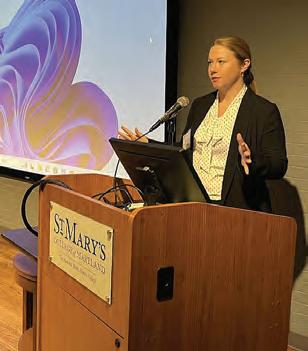
Active listening - A lot of issues stem from miscommunication. Learn to sit back and listen, hear both sides of the discussion. Practice pinpointing where the communication breakdown is and how you can clarify that specific issue. If you can do that, you will save yourself and your future employer a lot of time and energy. Prioritization - decide what is most important for you to work on today, because there will always be multiple items that need to be done and you are just one person. Start practicing that now with your coursework.
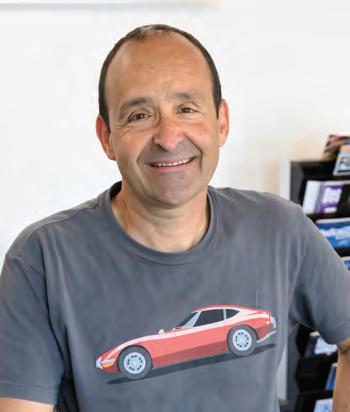

What were your favorite subjects in school? What did you enjoy about it?
Math and physics. They were both fun and interesting.
How has living and working in Maryland shaped your personal or professional journey?
I have never lived anywhere for more than a few years in a row. Maryland is home. It’s a beautiful state with kind people and a large concentration of technology and research. The state also has a great public school system and a large number of great colleges.
Founder and President
Rapid Prototyping & Manufacturing Technologies, LLC (RPM Tech)
Harford County
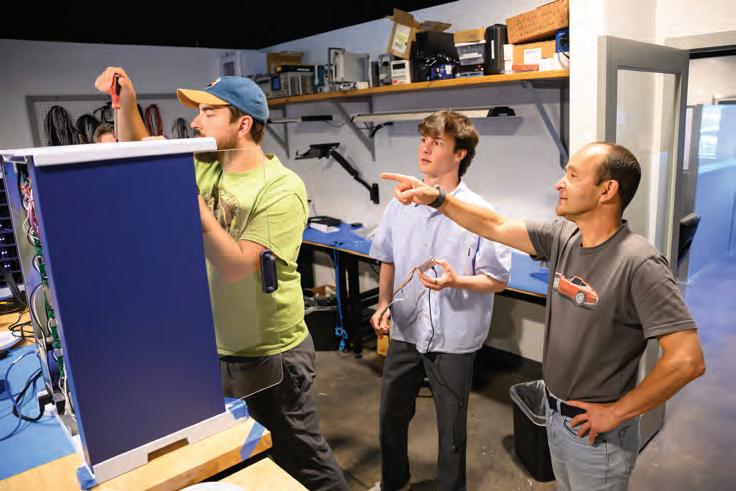
What challenges did you face in high school? How did overcoming them help you grow stronger or more confident?
Being short. I overcame them with curiosity and interest in technology and math, along with the support of friends.
What opportunities helped you to get where you are today?
Very few until my first job, when I was mentored by a handful of brilliant and giving individuals.

If you could give students one piece of advice to help them own their future, what would it be?
Be a sponge for the rest of your life - learn from everyone and everything, even if it does not seem relevant or complex, and network, network, network. Stay in touch with everyone… you never know.
What is a typical workday like for you?
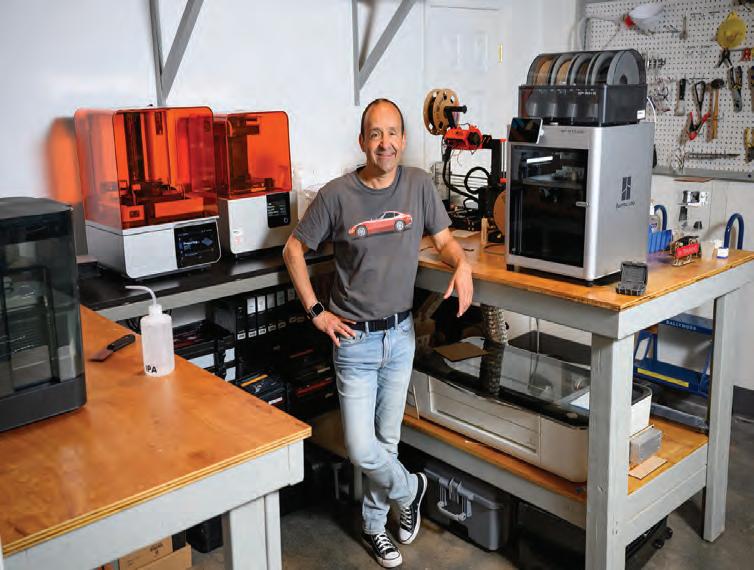
I innovate and solve problems - some simple and others highly complex. I engineer solutions, create designs and prototype them. When I am done with a design, I transition it to production.
What are the most important skills you use at work?
Solving problems, listening, analyzing and questioning all data and information.
What skills, habits or mindset helped you succeed? How can students start building those now?
Be open-minded, willing to listen to a differing opinion, try things that are hard, don’t be afraid of failure and do not give up. Always review data, think twice before making decisions, ask questions and be confident to disagree with more experienced individuals when you sense they are wrong.


How has living and working in Maryland shaped your personal or professional journey?
I have lived in Maryland all my life. I was born in Annapolis and grew up in Glen Burnie. I moved to the Eastern Shore at 20. I have the full experience of Maryland living. Raising my family on the Eastern Shore was a different experience from the one where I grew up. I had the experience of many resources in Glen Burnie and fewer on the Eastern Shore. This made me realize the need to have more resources available in rural areas.
What challenges did you face in high school? How did overcoming them help you grow stronger or more confident?
A challenge I had in high school was one I didn’t overcome until later in life. My parents were divorced when I was 16 and it affected my studies. I had a desire to go to college, but I was told we couldn’t afford it. This was a dream I put on hold until I was in my 40s. My advice would be to look into your opportunities and not just take someone else’s word for it. If you want to do something bad enough, you will find a way.
What opportunities helped you to get where you are today?
While earning my degree, I did an internship at a mental health facility where I was able to obtain a lot of experience in many different positions. Eventually, I obtained a job there as a Victim Advocate. This experience helped me to pinpoint the area I wanted to focus on for my career. Later, I was invited to be in a mentoring and training program that allowed me to learn what I needed to open a Residential Program for survivors of human trafficking.
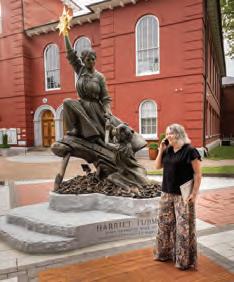
Harriett’s House Inc.
Dorchester County
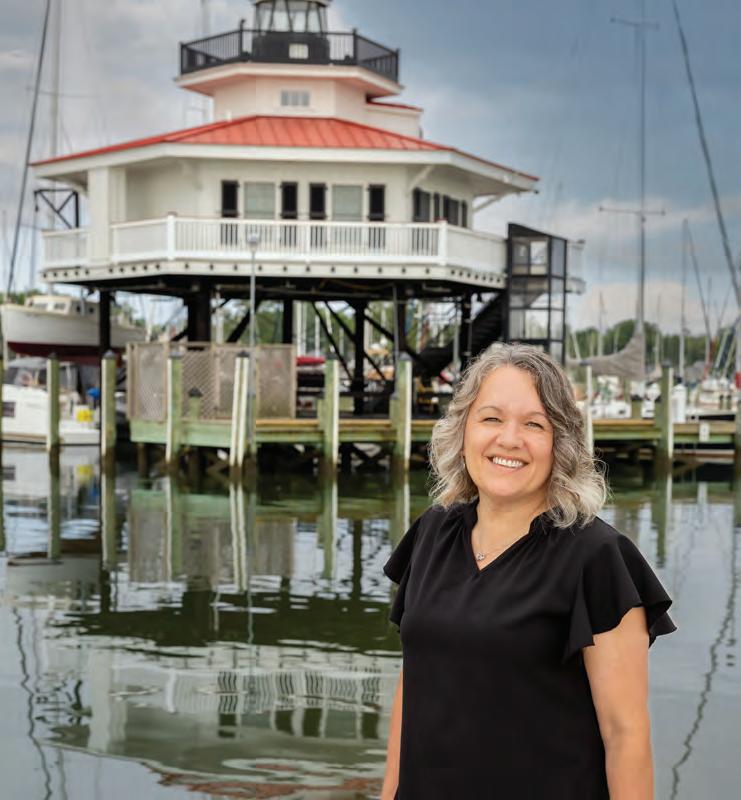
What is a typical workday like for you?
If you could give students one piece of advice to help them own their future, what would it be?
Explore different opportunities. Follow your passions and discover where your heart is leading you. Don’t allow someone else to tell you what you should do with your life. Interests will change as you grow. Allow yourself to be open to possibilities.
My day changes from day to day. Some days, I am working with the women in our program to teach skills, mentor and build relationships. Other days, I am working with clients at our drop-in center or creating products for the retail department of the organization. Other days, I manage employees, work on our website, create our newsletter, go to speaking engagements or raise money. Many different aspects of my job keep it interesting.
What skills, habits or mindset helped you succeed? How can students start building those now?
Be true to yourself. Don’t try to fit someone else’s mold. Make a daily list of things you want to achieve and work to accomplish them. Be honest - integrity is crucial. Do everything with excellence, don’t cut corners or settle for less than your best. Your reputation and integrity are everything.
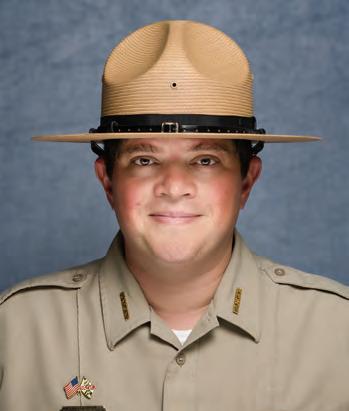

What was your favorite subject in school? What did you enjoy about it?
Environmental Science, our teacher had a handson approach with the class, including several field trips to explore what we were discussing. How has living in Maryland shaped your personal or professional journey?
Growing up in Maryland, my family often recreated in the outdoors. Hiking, camping and fishing in many of the state parks in Western Maryland. Without even realizing it, I believe it helped put me on the path that led to me becoming a Park Ranger. The abundant outdoor opportunities were always enticing to me as a child.
What opportunities helped you to get where you are today?

Maryland Park Services, Rocky Gap State Park Allegany County

During my internship at Rocky Gap State Park in college, my site supervisor played a crucial role in solidifying my career choice. Without their guidance and the valuable experiences I gained during that time, I’m not sure I would be where I am today.
If you could give students one piece of advice to help them own their future, what would it be?
If there is something you are passionate about or a field that interests you, seek out all opportunities to explore those fields or passions. Look for summer employment, or even volunteer opportunities. Always be willing to learn and don’t be afraid to fail.
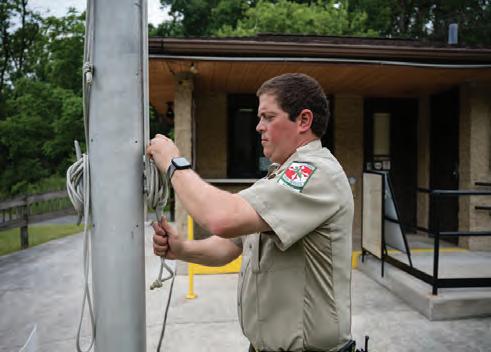
What is a typical workday like for you?
We often tell people that there are no typical days for a park ranger. However, there are a few tasks you can consistently expect, such as counting and verifying money at the beginning or end of your shift. Cleaning bathrooms or campsites is also necessary to support other staff. Additionally, you’ll assist by answering customer questions or helping them find the information they need. Depending on your shift, you may need to open or close gates to various areas as well. Flexibility is key, as unexpected situations will arise, requiring you to adapt and overcome challenges.
What are the most important skills you use at work?
Communication, both verbal and written. Interpersonal skills, the ability to talk and listen to people to hear what their needs truly are. Always be flexible; things are going to change and you need to be able to change with them.
What skills, habits or mindsets have helped you succeed? How can students start building those now?
Public speaking and technical writing. Take any classes you can that will improve your ability to write and speak. Avoid using slang terms and always be honest when communicating with people. Remember to breathe and always remember that you work outdoors in some of the most beautiful places Maryland has to offer. Rangers are paid in outstanding views and amazing sunsets.
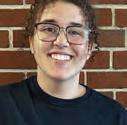

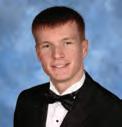



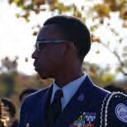

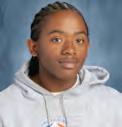
Ciara Ross
Fort Hill High School, Allegany County

Saniyah Grimes
Baltimore City College, Baltimore City
Brett Sheranko
Patuxent High School, Calvert County
Emily Hornberger
Rising Sun High School, Cecil County
Fredimanuel Seshie
Oakdale High School, Frederick County
Sakshi Tirodkar
Long Reach High School, Howard County
Mueez Peleowo
Oxon Hill High School, Prince George’s County
Ava Cotroneo
Leonardtown High School, St. Mary’s County
Haven Rodriguez
Wicomico High School, Wicomico County
Kayla Morrison
Meade High School, Anne Arundel County


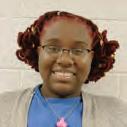





Tremen McBride
Owings Mills High School, Baltimore County
Kelly Harding
Colonel Richardson High School, Caroline County
Kennady Hawkins
Thomas Stone High School, Charles County
Madeline
Levering Smith
Northern Garrett High School, Garrett County
Daniel Harris III
Kent County High School, Kent County
Falodun
Queen Anne’s County High School, Queen Anne’s County
Gavyn Stebbins
Easton High School, Talbot County




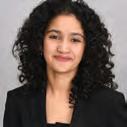


Julia Park
Stephen Decatur High School, Worcester County
Michael Eakins
Century High School, Carroll County
Tyler Sears
Cambridge-South Dorchester High School, Dorchester County
Matthew Rudzinski
Edgewood High School, Harford County
Ruhi Nair
Winston Churchill High School, Montgomery County
Kamryn Noble
Washington Academy & High School, Somerset County
Ilbe De La Paz Alvarez
Boonsboro High School, Washington County


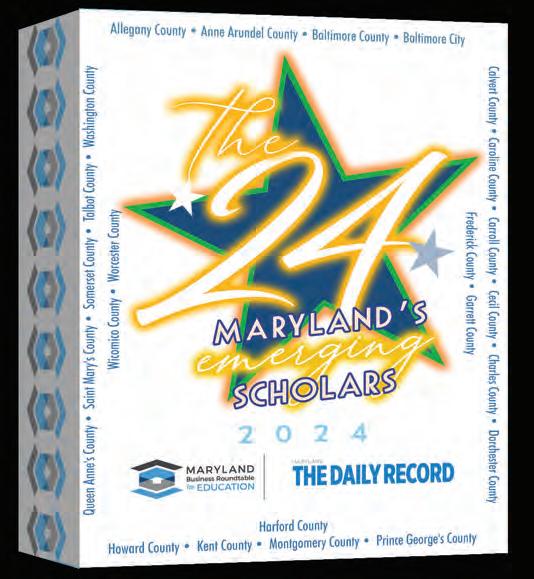
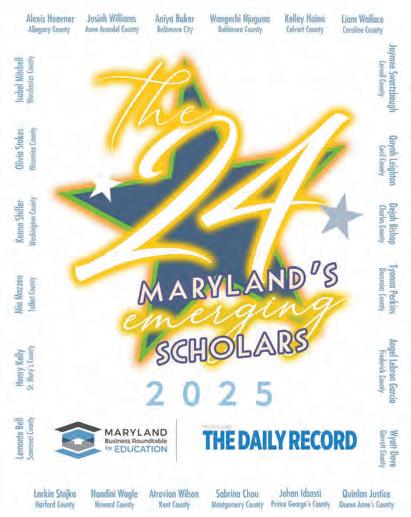



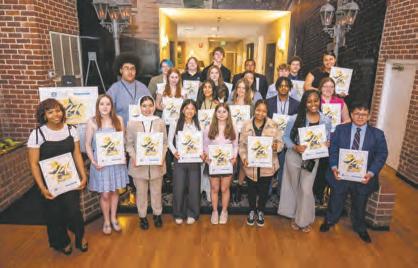
(Grades 9 – 12, selecting one student per school district) • • MBRT Program Participation (Extra Points Awarded) Future Career Interests (STEM – Extra Points Awarded)


• • • • Student Academic Achievement Minimum 2.5 GPA Community Involvement (Hours) School Involvement (Compassionate Leaders)




LA GUÍA DE MARYLAND BUSINESS ROUNDTABLE FOR EDUCATION PARA PREPARARTE PARA LA UNIVERSIDAD Y LA VIDA PROFESIONAL

¡Esta es TU GUÍA para encontrar el camino al éxito profesional! Más información en la página 91
¿Quieres más?
Descubre cómo liderar con MBRT como Estudiante Embajador en la página 87.

Consejos e inspiración sobre carreras de profesionales REALES desde la página 66
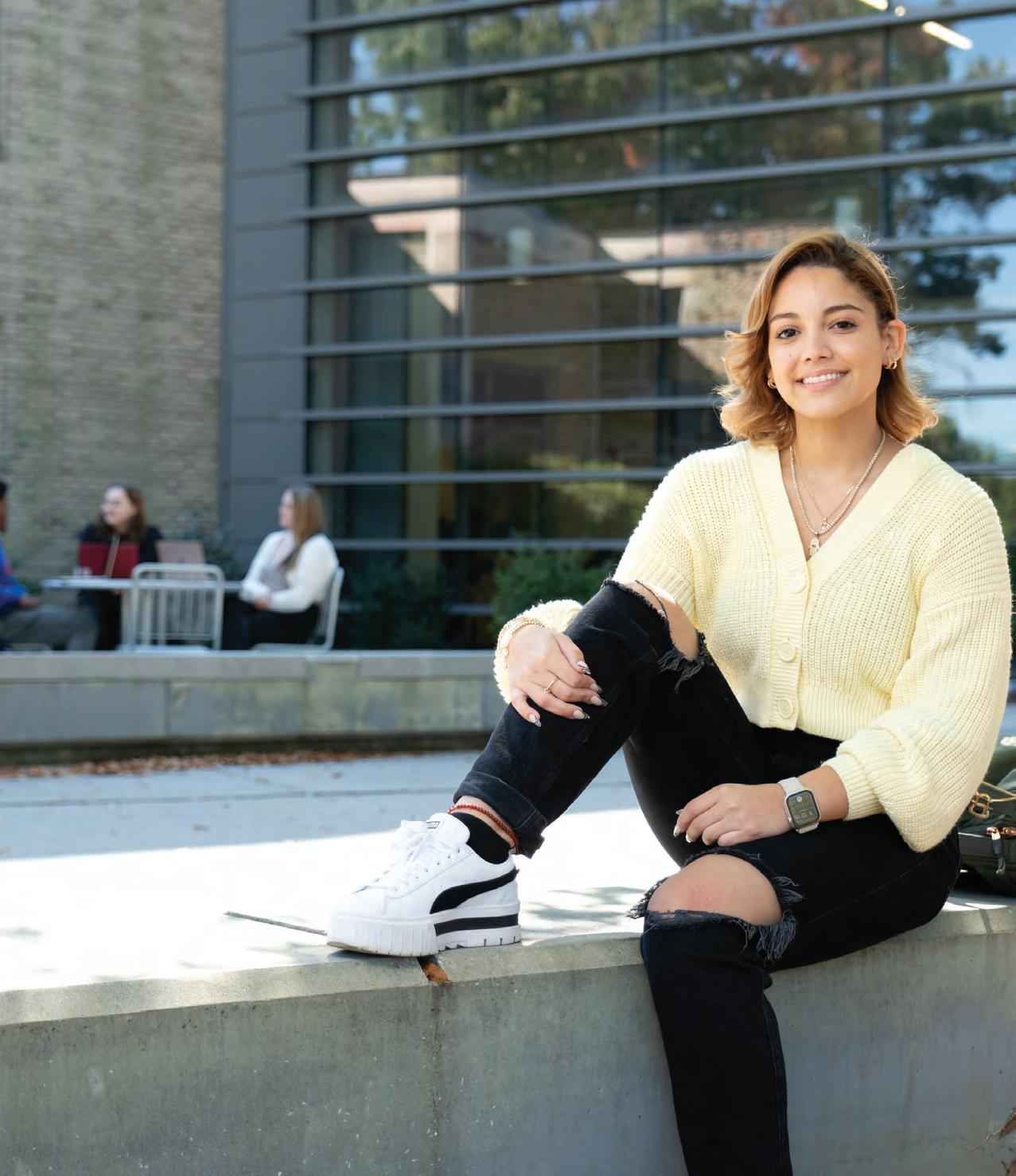
Elige entre cientos de programas de grado disponibles que se transfieren fácilmente a universidades con carreras de cuatro años o entre los más de 130 certificados de educación continua de fuerza laboral que te ayudan a prepararse y a construir habilidades prácticas para que puedas comenzar a trabajar inmediatamente, en mucho menos tiempo.
Además, con 7 ubicaciones y más de 70 programas completamente en línea, CCBC se adapta fácilmente a tu vida.
Programas de Acceso Anticipado a la Universidad
Los estudiantes de escuela secundaria de BCPS, escuelas privadas y educación en el hogar pueden comenzar a adelantar los estudios universitarios gracias al Programa de Acceso Anticipado a la Universidad en CCBC. ccbcmd.edu/earlycollege
Títulos para alcanzar el éxito
Obtén tu título de Associate en CCBC y al mismo tiempo ingresa en una de nuestras ocho instituciones educativas asociadas. Tendrás dos instituciones que apoyarán tu camino al éxito. ccbcmd.edu/degreestosucceed
Honors College
Honors College de CCBC enriquecerá, elevará y mejorará la experiencia académica. ccbcmd.edu/honors
Desarrollo y capacitación de la fuerza laboral
Con más de 130 programas para elegir, lleva tu carrera al siguiente nivel. ccbcmd.edu/work
Envía tu solicitud a ccbcmd.edu/opportunity.

DescúbreTE 97
Camino de las 7E .......................................... 96
¿Cuánto cuesta vivir? .................................... 95
Cuánto pagan algunos trabajos en Maryland ...... 94
Los cuatro años importan 93
Caminos futuros de Maryland .......................91
Vida estudiantil ............................................ 90
Educación técnica y profesional .....................
Sharon Markley Schreiber | Directora ejecutiva
TBA | Jefa de programa
Christopher Thorn | Director de Información y Operaciones
Morgan Cox | Gerente de Eventos y Marketing
Carrie Pannone | Gerente sénior de Programas Estatales
Taylor Hudson | Gerente de Caminos Universitarios con Responsabilidades de NGS, Kent
Leonard Webb | Gerente de NGS, condado de Allegany
Abigail Wittman | Especialista de NGS, condado de Caroline
Voncia Molock | Especialista de NGS, condado de Dorchester
Tashe Williams | Gerente de NGS, condado de Wicomico
Alana Fithian-Wilson | Pasante del Programa de Estudiantes Embajadores
Zy’Aye Bell, Amaya Carroll, Lupe Durante, Khensani Golding, Korbin McKenzie, Odette Pierre, Kayla Ross, Taryn Waters | Pasantes del Programa NGS
Suzanne E. Fischer-Huettner | Directora general
Patrick Brannan | Editor general
Kate Malone | Editora de Productos Especiales
Darice Dixon | Gerente de Desarrollo Comercial
Stella Edwards | Diseñadora de Publicaciones Especiales
Melanie Bingham | Directora de producción de impresión
Maximilian Franz | Fotógrafo colaborador
Comunícate con nosotros en Daily Record
Suscríbete: 877-615-9536
Anuncios: advertising@thedailyrecord.com
Reimpresiones: reprints@thedailyrecord.com
Durante más de 30 años, Maryland Business Roundtable for Education (MBRT) ha mantenido su dedicación a nuestra misión como catalizador para que las empresas, el gobierno y la educación impulsen un alto rendimiento de los estudiantes a fin de garantizar que, en el futuro, el personal sea competitivo y permita alcanzar una economía de primera categoría.
En el corazón de nuestra misión se encuentra la firme determinación de fomentar caminos profesionales y educativos que empoderan a los estudiantes, acortan las brechas de oportunidades y garantizan que todas las personas tengan las herramientas y las oportunidades para prosperar.
La revista Way to Be conecta a miles de estudiantes con recursos e información que les permite identificar y alcanzar sus metas educativas y explorar las diversas universidades y opciones profesionales.

¿Qué sigue?
Tus pasiones.
Tus fortalezas. Tu futuro.

• Echa un vistazo a la página 12 de esta revista para explorar las opciones de educación profesional y técnica (CTE) en tu escuela.
• Echa un vistazo a las diferentes formas de conocer tus intereses en la página 14.
• Prueba una encuesta de carrera, interés o personalidad para descubrir carreras que coincidan CONTIGO. Tu escuela podría usar Naviance u otras herramientas de preparación profesional: ¡pregúntale a tu consejero!
• Habla con tu consejero sobre otros recursos increíbles que ofrece tu escuela.
¿Listo para explorar lo que te hace único y cómo se conecta con tu futura carrera? Vamos a descubrir tus intereses, talentos y sueños para encontrar tu mejor camino.
Pregúntate:
• ¿Cuáles son mis tres materias preferidas en la escuela?
• ¿Qué me gusta hacer cuando no estoy en clase? (Piensa en clubes, pasatiempos, deportes, juegos, música, arte, incluso cosas que hagas en solitario, como leer, hacer senderismo o programar).
• ¿Cuáles son algunas cosas en las que soy naturalmente bueno?
• ¿Cuál es un desafío, algo en lo que me gustaría mejorar?
• ¿Cuál es el trabajo de mis sueños, incluso si parece muy lejano?
Piensa en esto...
• ¿Eres de los que defienden aquello en lo que creen?
• ¿Eres alguien que establece grandes objetivos y los persigue?
• ¿Te gusta ayudar a otros a crecer, a tener éxito o a aprender?
Si todo eso te suena familiar, ¡el liderazgo podría ser una gran parte de tu futuro! Maryland necesita futuros líderes como TÚ, en todas las industrias, en todas las comunidades.
¿Qué campos profesionales te interesan?
Elige tu top 3 de esta lista, ¡aquí no hay respuestas incorrectas!
Artes, medios y comunicación
Administración de empresas y finanzas
Construcción y desarrollo
Servicios al consumidor, hospitalidad y turismo
Recursos ambientales, agrícolas y naturales
El futuro comienza CONTIGO.
Mentalidad de Maryland:
¿Lo sabías?
Los caminos profesionales (Career Pathways) son grupos de trabajos dentro de cada campo profesional (también se llaman “career clusters”). Te ayudan a conocer más sobre tipo de trabajo que puede gustarte: ¡muchos están aquí en Maryland!
Salud y biociencias
Servicios de recursos humanos
Tecnologías de la información
Fabricación, ingeniería y tecnología
Tecnologías del transporte
De la misma forma que la bahía fluye en muchas direcciones, tu futuro también puede hacerlo. Explora todas las opciones: ¡tú haces tu propio camino!
Estrategia programática de MBRT para encarar la preparación para la universidad y la vida profesional
7.º GRADO: EDUCAR



• Introducción al método de MBRT









• Establecer que los cursos importan, las elecciones importan.
• Descubrir oportunidades profesionales
8.º GRADO: EMPODERAR
• Proporcionar opciones para el futuro
• Ofrecer una estrategia para la escuela secundaria
• Demostrar el poder de las conexiones
9.º GRADO: INTERACTUAR




















• Aprovechar las herramientas de intereses y personalidad
• Conocer a profesionales de la industria mediante experiencias prácticas
• Crear una proyección a futuro, comenzando con la planificación en la escuela secundaria
10.º GRADO: EXPLORAR













• Aprender contenido y habilidades mediante el uso en el mundo real
• Desarrollar el conocimiento y las competencias profesionales
• Investigar distintos caminos profesionales y universitarios
• Desarrollar un plan de acción
11.º GRADO: EJECUTAR
• Participar en oportunidades de aprendizaje mediante observación del trabajo
• Visitar instituciones de educación superior y empleadores
• Entrevistar a profesionales de la industria
• Prepararse para el examen SAT/ACT y el proceso de solicitud de ingreso a una universidad
12.º GRADO: ELEVAR
• Completar solicitudes para conseguir ayuda económica, becas e ingreso a una universidad
• Encontrar becas
• Crear un plan para la transición después de la escuela secundaria Después de graduado: ENRIQUECER
• Buscar oportunidades para establecer contactos
• Ganar conexiones y apoyo continuo
• Reinvertir en la comunidad escolar
Mentalidad de Maryland:

Comienza donde estás ahora, sueña en grande y construye a medida que avanzas, como lo hacen los líderes e innovadores de Maryland.
Analicemos los costos de vida en el mundo real en Maryland y cómo puede ayudarte tu futura carrera a alcanzar el estilo de vida que quieres.
-
-
”Esto es lo que ganaste antes de las deducciones”. Es tu paga total para el período basado en las horas trabajadas o el salario, antes de las deducciones.
“¿A dónde fue parte de mi dinero?”
Estos son impuestos y otras retenciones (como el Seguro Social, Medicare y probablemente el seguro de salud).
Todos los empleados lo pagan y se descuenta antes de que recibas tu cheque de pago.
Pago neto
“Esto es lo que realmente llega a tu cuenta bancaria”. También llamado “salario neto”, es lo que queda después de restar todas las deducciones. Este es el número que usarás para presupuestar y gastar.
Sueldo mensual neto de $1,880.40Gastos mensuales totales de $3,800 = $1,919.60 por encima del presupuesto

Mentalidad de Maryland:
Ya sea que estés ahorrando para tickets de O o para un auto, hacer un presupuesto inteligente te dará la libertad para vivir a tu manera.
Ocupación
Cirujano
Ortodoncista
Psiquiatra
Abogado

$349,250$29,104.17$167.91
$315,840$26,320.00$151.85
$260,100$21,675.00$125.05
$143,490$11,957.50$68.98
Doctorado o título profesional
Doctorado o título profesional
Doctorado o título profesional
Doctorado o título profesional
Enfermería especializada*$129,210$10,767.50 N/A Título de Master Actuario*
Analista de Seguridad de la Información*
Científicos de datos*
Ingeniero biomédico
$125,770$10,480.83 N/A Título de Bachelor
$124,910$10,409.17 N/A Título de Bachelor
$112,590$9,382.50 N/A Título de Bachelor
$105,650$8,804.17$50.79Título de Bachelor
Patólogo del habla y del lenguaje$100,560$8,380.00$48.35Título de Master
Veterinario
Analista financiero/de inversiones
Escritor técnico
Ingeniero aeroespacial
Agricultor/Ganadero
Contador/Auditor
Científico ambientalista
$100,370$8,364.17$48.23
Doctorado o título profesional
$98,890$8,240.83$47.54Título de Bachelor
$98,350$8,195.83$47.29Título de Bachelor
$93,010$7,750.83$44.72Título de Associate
$88,770$7,397.50$42.68Título de escuela secundaria
$84,890$7,074.17$40.81Título de Bachelor
$82,100$6,841.67$39.47Título de Bachelor
Técnico en ciencias forenses$78,220$6,518.33$37.60Título de Bachelor
Oficial de policía
Docente (secundaria)
Productor/Director
$77,440$6,453.33$37.23Título de escuela secundaria
$77,030$6,419.17 N/A Título de Bachelor
$75,900$6,325.00$36.49Título de Bachelor
Asistentes de fisioterapeuta*$65,510$5,459.17 N/A Título de Associate
Carpintero
Agente de ventas de bienes raíces
Asistente dental
EMT (Técnico médico de emergencias)
Entrenador físico
Fotógrafo
Camarero
Vendedor
$60,130$5,010.83$28.91Título de escuela secundaria
$49,770$4,147.50$23.93Título de escuela secundaria
$48,280$4,023.33$23.21Certificado
$47,390$3,949.17$22.78Certificado
$45,260$3,771.67$21.76No listado
$44,890$3,740.83$21.58Título de escuela secundaria
$35,140$2,928.33$16.89Título de escuela secundaria
$34,310$2,859.17$16.50Título de escuela secundaria
*¡Uno de los empleos de crecimiento más rápido en Maryland!
La fuerza laboral de Maryland se encuentra entre las más educadas y técnicamente calificadas de Estados Unidos, gracias en parte a su sólido sistema de educación superior. Con 55 casas de estudios y universidades de dos y cuatro años, incluidas instituciones de renombre como la Universidad Johns Hopkins, Morgan State y la Universidad de Maryland en el Condado de Baltimore (UMBC), el estado produce un grupo de talentos altamente calificados.
Aspectos destacados clave de la fuerza laboral en el panorama de la educación superior de Maryland
• Alcance de nivel educativo superior: A partir de 2023, más del 43.7% de los residentes de Maryland de 25 años o más tienen una licenciatura o más, y el 21.3% posee un título de posgrado o profesional, ¡eso es más alto que el promedio nacional!
• Presencia fuerte de STEM: Maryland ocupa el segundo lugar a nivel nacional por su gran porcentaje de trabajadores profesionales y técnicos, y tiene la segunda mayor concentración de científicos e ingenieros con doctorado.
• Instituciones líderes:
• Johns Hopkins University: Reconocido por sus programas de ciencias de la vida e ingeniería, es el principal ganador de premios NIH entre los colegios y universidades de EE. UU.
• Morgan State University: Morgan es la tercera HBCU más grande de los EE. UU. en la acutalidad, y está experimentando un crecimiento récord impulsado por programas de alta demanda, un enfoque en el precio accesible y una sólida reputación de éxito estudiantil.
• UMBC: Conocido por su innovación, es el principal productor de estudiantes universitarios negros que completan un doctorado en ciencias naturales o ingeniería.
• Contribuciones de los institutos superiores comunitarios: Los 16 institutos comunitarios de Maryland ofrecen programas especializados para satisfacer las necesidades del mercado laboral, como la Tecnología de Logística y Producción para Sistemas de Biotecnología y Mantenimiento de Frederick Community College, y el programa de Garantía de Información Forense Digital y Ciberseguridad de Anne Arundel Community College.
• Fuerza laboral federal: En 2021, Maryland tuvo la segunda concentración más alta de trabajadores federales y ocupó el primer lugar en empleos federales per cápita, con 242 empleos federales por cada 10,000 residentes.
* Promedios de Maryland basados en datos ocupacionales y salariales de BLS.
* Proyección de datos para el año 2023.
* Datos de veterinarios de 2022.
Para obtener información de otras ocupaciones, visita https://www.bls.gov/ oes/current/oes_stru.html y haz clic en “Occupational and Wage Data” (Datos de ocupaciones y salarios) o “Projection Data” (Datos de proyecciones)
En Maryland, las habilidades dicen mucho más que los títulos. Apréndelas. Domínalas. ¡Gana dinero!
Tus años de escuela secundaria son más que un momento para obtener créditos: son la base de tu futuro. Cada clase que tomas, cada calificación que obtienes y cada elección que haces, es un paso más en el camino hacia tus sueños. Ya sea que quieras ir a la universidad, aprender un oficio o incorporarte directamente a la fuerza laboral, tu expediente académico cuenta tu historia. Haz que sea una historia de compromiso, crecimiento y ambición.
Legal Name Pat Smith
ID Number 625-559-5799
Birth Date 01/01/200 7
Class of 202 5
Graduation Date 05/27/202 5
Parent/Guardian Patrick and Patricia Smith
SchoolNameCentennial HighSchool
Address 123 SecondStreet City Baltimore State MD Zip Code 21222 Fax 410-555-3131
Phone 410-555-2121 Principal Mary Jackson Counselor Jim Lawrence

Las universidades y los empleadores quieren saber:
¿Irás a clase o a trabajar?
Tener una buena asistencia muestra responsabilidad y dedicación.
¿Puedes afrontar un reto? Elegir cursos avanzados o de honores demuestra tu disposición a esforzarte.
¿Tienes las competencias necesarias para tener éxito? Un buen GPA y un comportamiento positivo reflejan tu disposición para el éxito futuro.
*Industry Recognized Credential (IRC) Completed And/Or **Youth Apprenticeship Completed
June 21, 202
Los grandes cambios empiezan con pequeñas elecciones. Las clases que elijas hoy mañana pueden abrirte oportunidades más grandes que la bahía.
Legal Name Kelly Jones
ID Number 111-22-333
Birth Date 02/02/2005 7
Class of 202 5
Graduation Date 05/27/202 5
Parent/Guardian Kenny and Kim Jones

SchoolNameCentennial HighSchool
Principal Mary Jackson Counselor Jim Lawrence
June 4, 202 5
Sé honesto... ¿A QUIÉN CONTRATARÍAS?
Imagina que eres el empleador. ¿Elegirías a alguien que se levanta tarde, no quiere responsabilidades y evita los desafíos?¿O alguien que es puntual, toma la iniciativa y se esfuerza por la excelencia? Tus acciones de hoy son el currículum que presentarás mañana.


¿Tu futuro? Se construye por elección, día a día, a partir de AHORA.
Responde a este cuestionario rápido para verificar dónde te encuentras y hacia dónde te diriges. Sin presión, solo sé realista.
Coloca una f al lado de todo lo que te resulte familiar:
Me esfuerzo para que me vaya bien en la escuela.
Llego a clases a tiempo, todos los días.
Hago más de lo que se espera de mí en clase.
Planeo tomar cursos de niveles altos de matemáticas y ciencias.
Planeo aprender (o estoy aprendiendo) un idioma extranjero.
Soy o planeo ser activo en actividades extracurriculares (clubes, deportes, artes, etc.).
Soy o planeo ser voluntario/retribuir en mi comunidad.
Pienso bien antes de publicar algo, tengo cuidado con mi huella digital.
Entiendo mis opciones de camino en la escuela secundaria (CTE, inscripción doble, AP, etc.).
Sé lo que quiero hacer después de la escuela secundaria.
TOTAL: _______
Ahora revisa tu puntaje para ver dónde te encuentras
8–10 marcados: ¡Lo estás haciendo genial!
Te estás preparando para el éxito a largo plazo. De hecho, los estudiantes que toman cursos desafiantes, se presentan a tiempo y trabajan en la comunidad a menudo ganan $1 millón MÁS en su vida. ¡Eso equivale a una mansión en Maryland de éxito! ¡Sigue con la misma energía!
5–7 marcados: ¡Casi lo logras! Solo un esfuerzo más. Lo estás haciendo muy bien. Ahora es el momento de subir tu nivel. Únete a un nuevo club, pregúntale a algún profesor sobre el trabajo voluntario o explora clases fuera de tu zona de confort. Cada paso adelante te ayuda a destacar en universidades, empleos y becas.
0–4 marcados: Sé realista — ¡Es momento de avanzar! Este es el momento de tomar el control de tu futuro. Tienes potencial, ahora combínalo con acción.
Establece objetivos
Desarrolla hábitos
Pide ayuda
Habla con tu consejero
Porque... ¿adivina qué? Los estudiantes de Maryland no se relajan en el asiento de atrás, ¡son los que conducen!
Ya sea que estés planeando ir a la universidad, unirte al ejército o comenzar una carrera justo después de graduarte, tu futuro comienza ahora, ¡y tienes opciones! Maryland cree en TI y hay caminos poderosos diseñadas para ayudarte a alcanzar tus metas.
Elige tu camino para tu futuro en Maryland (Todos estos caminos conducen al éxito, ¡solo elige el mejor para TI!)
¿Te interesa una carrera en una universidad de 4 años? ➡️
Ubicación avanzada (AP) o Bachillerato Internacional (IB) ➡️ Impúlsate con clases de nivel universitario mientras aún estás en la escuela secundaria.
¿Te interesa una carrera en una universidad de 2 años y quedarte en tu localidad? ➡️
Matrícula doble o Early College ➡️ Obtén créditos universitarios ahora a través de colegios comunitarios y escuelas asociadas.
¿Te interesa comenzar una carrera profesional después de la escuela secundaria? ➡️ Educación técnica y profesional (CTE) ➡️ Adquiere experiencia práctica y habilidades del mundo real en carreras de alta demanda.
Requisitos de graduación de la escuela secundaria (¡al estilo Maryland!)
Apunta a lograr un GPA de 3.0
¡Escanea el código QR o visita www.mbrt.org para verificar los requisitos de tu distrito local!
Por qué son importantes los caminos futuros de Maryland
Cada paso que das ahora ayuda a construir el futuro que TU deseas. Esto es lo que puedes desbloquear con estos caminos:
1. Becas y subsidios – Ahorra dinero en la universidad
2. Aceptación universitaria y grandes empleos – prepárate para el próximo gran paso
3. Éxito universitario – desenvuélvete en las clases de nivel universitario con confianza
4. Gana más dinero – más habilidades = más poder adquisitivo
Tu futuro = Ilimitado
No importa el camino que elijas, recuerda: Maryland te respalda. Tienes las herramientas, el talento y el apoyo para lograr que suceda.
TÚ eres el futuro de Maryland. ¡Construyámoslo juntos!


Deja tu huella. Genera nuevas relaciones. Encuentra tu próxima aventura.
En la escuela, el liderazgo se presenta de muchas formas y comienza cuando das el primer paso. Ya sea que te apasione marcar la diferencia, hablar por otros u organizar eventos, hay un lugar donde liderar.

• Programa de Estudiantes Embajadores (Ver páginas 14–15)
Conviértete en un modelo a seguir y ayuda a dar la bienvenida, guiar e inspirar a los demás.
• Future Business Leaders of America (FBLA)
Desarrolla habilidades de liderazgo, explora los negocios y el espíritu empresarial y encuentra tu voz.
• Honor Societies
Celebra tus logros y retribuye a través del servicio y la excelencia académica.
• Gobierno estudiantil
Haz un cambio real. Representa a tus compañeros de clase y ayudar a dar forma al futuro de tu escuela.
El deporte es más que competencia, se trata de disciplina, compromiso y crecimiento. Desarrollarás confianza, fuerza y carácter.
• Fútbol
• Atletismo
• Lacrosse
• Porristas
• Natación y buceo
• Softbol

• Fútbol
• Voleibol
• Tenis
Tienes la libertad de explorar tus intereses y tal vez incluso descubrir una pasión que no sabías que tenías. Los clubes son donde las ideas cobran vida, se construyen amistades y despega la creatividad.
• Equipo de debate: defiende tu caso, perfecciona tu voz.
• Clubes STEM (robótica, MESA y más) – Innova, explora y crea.
• World Languages Club – Conéctate a través del idioma y la cultura.
• Simulacro de Juicio – Entra en la sala del tribunal y aprende el arte de argumentar.
• Club de Drama – Sube al escenario y cuenta historias que importan.
• Comité del anuario – Captura los momentos que definen el año.
• Coro – Encuentra la armonía y haz música con los demás.
• ROTC Junior
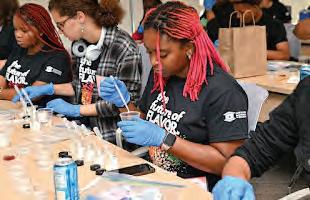
El verdadero aprendizaje ocurre cuando conectas lo que sabes con el mundo. A través del servicio, desarrollarás tus habilidades de liderazgo y empatía, y descubrirás tu poder para generar cambios.

• Ayuda a otro estudiante como tutor
• Entrena a un equipo juvenil en un deporte que te encante
• Organiza una campaña de donación o una recaudación de fondos
• Participa en la limpieza de una escuela o comunidad
• Ofrécete como voluntario en un refugio o banco de alimentos
• Enséñale a adultos mayores a usar la tecnología
Las clases construyen tu futuro. La vida en el campus construye tu historia: Maryland tiene ambas cosas.
¿Quieres un futuro emocionante, bien remunerado y construido sobre algo que te gusta hacer? Los programas de Educación Técnica y Profesional (CTE) de Maryland te ayudan a convertir tus pasiones en una carrera en el mundo real, mientras aún estás en la escuela secundaria.
CTE combina el conocimiento académico con el aprendizaje práctico para que estés listo para una universidad, una carrera profesional o ambas cosas. Ya sea que sueñes con diseñar edificios, salvar vidas, reparar motores, dirigir un negocio o escribir código, hay un programa de CTE que te ayudará a llegar allí.
En Maryland, los programas CTE son tu plataforma de lanzamiento a la oportunidad, y ya están funcionando para los estudiantes de todo el estado.
Maryland ofrece 222 programas de estudio CTE en los 24 sistemas escolares. En total, el 48% de los estudiantes de secundaria participan en la CTE.
133,071
INSCRIPCIÓN EN CTE EN LA ESCUELA SECUNDARIA
• Obtén credenciales reconocidas por la industria
• Obtén créditos universitarios
• Gana experiencia laboral en el mundo real
• Mejora tu rendimiento académico
• Desarrolla habilidades para trabajos de alta demanda y altos salarios
• Gradúate con vantajas para comenzar una universidad o una carrera
Mejoran el rendimiento en matemática y lectura
Tienen más posibilidades de graduarse y de ir a la universidad
Tienen un promedio de ingresos anuales más alto
Fuentes: https://careertech.org/state-profile/maryland/
Mentalidad de Maryland:

43,806
INSCRIPCIÓN EN CTE POSTSECUNDARIO
Los programas CTE se dividen en 10 grupos profesionales diferentes. El Departamento de Educación de Maryland organizó sus programas de CTE secundarios dentro del Marco Nacional de Grupos Profesionales (National Career Clusters Framework).Los grupos de carreras profesionales CTE Career Clusters de Maryland son los siguientes:
CARRERAS PROFESIONALES
Artes, medios y comunicación
POSIBLES TRABAJOS
Gerente de ventas, Especialista en relaciones con los medios, Coordinador de marketing, Asistente editorial, Productor Administración de empresas y finanzas
Construcción y desarrollo
Servicios al consumidor, hospitalidad y turismo
Recursos ambientales, agrícolas y naturales
Salud y biociencias
Servicios de recursos humanos
Tecnologías de la información
Fabricación, ingeniería y tecnología
Tecnologías del transporte
Analista de presupuesto, Gerente financiero, Especialista en impuestos, Asesor de inversiones, Emprendedor
Planificadores urbanos, Administrador de servicios públicos, Trabajador de desarrollo comunitario, Arquitecto
Auxiliar de vuelo, Recepcionista, Organizador de eventos, Agente de viajes, Oficial de transporte
Gestión de recursos naturales, Restauración ecológica, Científico de conservación, Horticultor
Enfermero, Médico, Cirujano, Bioingeniero, Investigador, Técnico radiólogo
Servicios terapéuticos, Servicios de diagnóstico, Informática sanitaria, Servicio de apoyo, Investigación y desarrollo biotecnológico
Especialista en seguridad IT, Programador, Analista de sistemas, Científico de datos
Ingeniero, Gerente de cadena de suministro, Gerente de logística, Control de calidad
Piloto, Tráfico aéreo, Trabajador postal, Mecánico, Gerente de carga
Para más opciones y para obtener más información, escanea:
Aprende. Hazlo. Las industrias de Maryland están contratando empleados con experiencia práctica.
Pasantías, prácticas profesionales y aprendizaje mediante observación:
¿Estás listo para dar los primeros pasos hacia un futuro emocionante y exitoso? Ya sea que sueñes con lanzar tu propio negocio, convertirte en un experto en oficios, diseñar la próxima gran aplicación o cualquier otra cosa, las pasantías, los aprendizajes y el seguimiento u observación del trabajo son tu entrada al backstage para hacerlo realidad.
Estas experiencias del mundo real no solo te ayudan a aprender sobre las carreras, sino que también te ayudan a vivirlas

¿Cuál es la diferencia?
¡Vamos a verlo en detalle para que puedas encontrar la mejor opción para vos!
• Gana experiencia práctica en un lugar de trabajo real, remunerado o no remunerado.
• Ideal para conocer más de un campo, mejorar tu currículum y generar contactos.
• ¡Trabajarás bajo supervisión, aprenderás habilidades valiosas y, a veces, incluso obtendrás créditos escolares!
• Consejo: Comienza lo antes posible y gana confianza para la universidad, para tu carrera profesional y para la vida.
• ¡Gana dinero mientras aprendes!
• Sí, te pagan por entrenar para una carrera.
• Combina la experiencia laboral real con la instrucción en el aula.
• Incluye un mentor que te guiará paso a paso a través de todo lo que necesitas saber.
Cada oportunidad abre una puerta. Ya sea que se trate de una conexión con otro profesional, una nueva habilidad o un aumento de la confianza, tu futuro te está esperando y estas experiencias te ayudan a alcanzarlo.

“No se trata de lo perfecto que puedes ser, ¡se trata de tu impulso y dedicación! Ha sido increíble ser una voz para los estudiantes y crear un espacio seguro para el crecimiento personal, educativo y profesional. ¡Mi pasantía me ha demostrado y enseñado cómo es un equipo y cómo todos somos piezas importantes del rompecabezas!
— Rikia C., pasante de MBRT
¿Listo para sumergirte?

• Al finalizar recibirás una certificación reconocida que puede conducir directamente a un trabajo bien remunerado.
• Pasa un día (o más) siguiendo a un profesional y observa cómo es realmente su trabajo.
• Haz preguntas, explora la carrera profesional y conoce como funciona todo detrás de escena.
• No son programas pagos, pero la experiencia no tiene precio a la hora de planificar tu futuro.
¡Escanea el código QR a continuación para descubrir oportunidades de aprendizaje cerca tuyo!
Los programas de aprendices de Maryland pueden ser el puntapié inicial de carreras de todo tipo, desde la construcción hasta la energía limpia.
El liderazgo no viene después, comienza ahora.
Como estudiante embajador, no solo te estás preparando para tu futuro, sino que estás ayudando a dar forma al futuro de Maryland hoy.
Todos los estudiantes embajadores de los 24 distritos escolares se reúnen para:
• Hablar sobre lo que importa
• Conectarse entre comunidades
• Dirigir proyectos que inspiren el cambio
¿Por qué sumarse?
Tu voz es importante.
Nuestras reuniones están diseñadas para ayudarte a sentirte visto, escuchado y apoyado. Ya sea que estés liderando el cargo o que estés aprendiendo a encontrar tu propia voz, ¡no estás solo!
Conocerás estudiantes como tú
De Julia P. Estudiante Embajadora
“El programa es divertido y sin presiones.Conocí a gente de todo Maryland y me ha ayudado a sentirme más segura. Me gustó mucho la simulación de entrevistas, ¡me dieron un impulso!

Desde las montañas de Garrett hasta las playas de Worcester, este es un espacio para crecer con compañeros de todo Maryland.
Desarrollarás habilidades del mundo real

Entrevistas simuladas





Sesiones de establecimiento de objetivos


Presentación a líderes locales


Oportunidades de Liderazgo
Día de Industrias:
• Explora diferentes trayectorias profesionales
• Establece contacto con profesionales y expande tu red profesional
Día de Congreso Juvenil:
• Fortalece tu comprensión del compromiso cívico
• Podrás debatir sobre cuestiones políticas reales con tus compañeros
NextGen NextLevel:
• Obtén herramientas para el éxito universitario:
• Entra en contacto con profesionales
• Recibe consejos del mundo real de estudiantes universitarios actuales
Mentalidad de Maryland:

¿Listo para liderar?
Si eres curioso, apasionado o simplemente buscas un lugar para crecer, esto es lo que necesitas. ¡Conoce más y aplica hoy!


Al igual que Harriet Tubman y Thurgood Marshall, aquí el liderazgo implica ayudar a los demás a medida que subes.

Christine D. Aspell, Chair - Office Managing Partner, KPMG
Suzanne Fischer-Huettner, Vice Chair - Managing Director, Bridge Tower Media/The Daily Record
Michael Cloyd, Treasurer - SVP, CFO & Treasurer, BGE
Joe Durham, Market President, Fulton Bank
Joan Flynn, Chief External Relations Officer, Loyola University Maryland
Vernon Hurte, Ph.D., Vice President of Student Affairs, Towson University
Sandra Kurtinitis, Ph.D., President, Community College of Baltimore County
Todd Marks, Founder, CEO, & President, Mindgrub
Morgan O’Donnell, SVP, CFO & Treasurer, Pepco Holdings
Jay Patel, Sector Vice President, Engineering and Sciences, Northrop Grumman Mission Systems
Jay Perman, MD, Chancellor, University System of Maryland
Yolanda Wilson, Ed.D., President, College of Southern Maryland
La universidad es un gran paso que eligen dar muchos estudiantes y que puede ser una experiencia de gran impacto. Debes considerar cuidadosamente a qué escuela quieres ir, y también incluir una visita al campus cuando sea posible. Ya sea que estés planeando tu primer recorrido por el campus o pensando con anticipación qué título te abrirá el camino al trabajo de tus sueños, usa esta página como tu hoja de ruta. Úsala para planificar tus visitas, imaginar tu futuro y comprender los diferentes tipos de títulos universitarios que pueden llevarte a llegar a donde quieres ir.
¿Por qué hacer la visita? Porque los sitios web y los folletos solo muestran un poco. Entrar en un campus te ayuda a sentir el ambiente y ver si realmente es para ti.
Consejos y trucos que te ayudarán a la hora de buscar:
¡Intenta hacer tu visita cuando haya clases! De esa manera, podrás ver a los estudiantes en su rutina típica. También es útil para ver cómo se siente verdaderamente el campus.
¡Imagínalo como tu nuevo hogar!
¿Te sentiste emocionado, seguro y cómodo mientras caminabas por el campus o cerca de él? ¿Te imaginas quedarte en el área después de la escuela? Comenzarás a hacer valiosas conexiones profesionales durante la universidad que pueden ayudarte a conseguir una oportunidad local después de la graduación.
Maryland, haz el mapa de tu futuro
Maryland lo tiene todo: universidades urbanas, colegios costeros y campus rurales en las montañas. ¡Visita diferentes regiones, explora las culturas locales y encuentra tu lugar!
• MD Occidental – Aventura al aire libre, campus muy cercanos
• MD Central – Ciudades bulliciosas y las principales universidades de investigación
• Costa Este – Encanto costero y ambiente cercano de comunidad
• MD Sur – Lugares históricos, entornos tranquilos y joyas ocultas
Habla con estudiantes y profesores reales
Pregunta sobre la vida en al campus, la seguridad, el apoyo y las oportunidades disponibles.
¡Pide ayuda! Ten en cuenta que, si necesitas ayuda con alguno de estos temas, puedes comunicarte con el departamento de admisiones.
¿No puedes hacerlo en persona? ¡Algunas universidades tienen visitas o sesiones virtuales!
Considerar
¿Qué te gustó y qué no?
¿Te imaginas viviendo y aprendiendo aquí durante 4 años?
Comparar
Utiliza una hoja de cálculo o un diario para comparar las escuelas con fotos y notas de tu recorrido.
Clasifica según lo que es más importante para ti (estudios, vida en el campus, costo, etc.).
Conectar
Mantente conectado a través de eventos virtuales o redes sociales.
Envía un correo electrónico de agradecimiento al personal de admisiones o a cualquier persona específica que hayas conocido.
Recorre el lugar. Conoce gente. Imagínate tu futuro: los campus de Maryland están listos para darte la bienvenida.
Cada camino lleva a alguna parte: ¡conoce tus opciones!
Grado o nivel Ejemplos de carreras
Certificado Desarrollador web, EMT
Tiempo para obtener el títuloDónde puedes obtenerlo
Unas semanas-2 años
Programas de escuela secundaria, Carreras profesionales, Colegios comunitarios
Associate Higienista dental, enfermero 2 años (60 créditos) Colegios comunitarios
Bachelor Docente, ingeniero
4–5 años (120 créditos) Instituciones de educación superior y universidades
Master Trabajadora social, economista1–2 años (30–60 créditos)Programas de posgrado
Doctorado Investigador, profesor
2–5 años + disertación Universidades
Profesional Médico, abogado, arquitecto 2–5 años + licenciatura Escuelas profesionales
Promedio de ganancias semanales por nivel de estudios alcanzado, 2024
Doctorado
Título profesional
Master
Título profesional Bachelor
Associate
Algunos estudios universitarios, sin título
Diploma de escuela secundaria, sin universidad
Sin diploma de escuela secundaria
$738
Tasa de desempleo por nivel de estudios alcanzado, 2024
Doctorado
Título profesional
Master
Título profesional Bachelor
Associate
Algunos estudios universitarios, sin título
Diploma de escuela secundaria, sin universidad
Sin diploma de escuela secundaria
Nota: Los datos son de mayores de 25 años. Las ganancias son de trabajadores asalariados que se desempeñan a tiempo completo. Fuente: U.S. Bureau of Labor Statistics, Current Population Survey. https://www.bls.gov/emp/ chart-unemployment-earnings-education.htm http://www.bls.gov/emp/chart-unemployment-earnings-education.htm
Prepárate:
Crea tu lista de universidades
Considera factores como ubicación, especializaciones, tamaño del campus y matrícula cuando hagas tu lista de universidades. Envía solicitudes a entre cinco y ocho instituciones para una selección equilibrada.
Crea tu cuenta en Common App
Common App abre en agosto. Regístrate, completa la autorización FERPA y sincroniza la cuenta con Naviance para transferir fácilmente tus documentos.
Reune la documentación:
Transcripciones
Pídele a tu consejero el formulario de entrega del expediente académico y complétalo cuando llegues a tu último año. Presenta el formulario de solicitud del expediente académico para el proceso de ingreso a una universidad mediante Common App al menos dos semanas antes de las fechas límite.
Cartas de recomendación
Pide recomendaciones a los docentes mediante Naviance, lo ideal es tener 2 o 3 cartas. Si puedes, pregúntale a los maestros que dan clases relacionadas con tu especialización prevista o con los que tengas una buena relación. Si quieres hacer que les resulte más fácil escribirte una carta personalizada, envíales tu currículum y recuérdales tus objetivos principales/ futuros.
Conoce las fechas límite

Cuenta tu historia:
Aspectos académicos
Tus calificaciones en los exámenes SAT y ACT son importantes para el ingreso a una universidad y para las becas. Conoce los criterios de cada institución. Resalta tus logros y reconocimientos académicos y subraya los cursos o clases desafiantes que hayas tomado relacionados con tu especialización.
Actividades extraescolares
Las universidades quieren estudiantes activos. Destaca tus actividades para demostrar tus intereses y compromiso.Lo ideal es centrarse en experiencias en las que hayas estado involucrado durante un período más largo y que estén relacionadas con tus objetivos futuros (piensa en la calidad, no en la cantidad).
Ensayo universitario
Tu ensayo es la oportunidad de expresar tu opinión y demostrar tus habilidades de redacción, tu personalidad y las experiencias de vida importantes. ¿Qué quieres que sepa o entienda sobre ti el comité de admisiones? Esto puede ayudarte a destacar; ¡eres más que una simple transcripción o que el puntaje de una prueba! Asegúrate de corregirlo bien antes de enviarlo.
Cada universidad tiene su propio cronograma, por lo que es importante hacer un seguimiento de las fechas clave. Los plazos de acción temprana (Early Action, EA) suelen ser en noviembre y te permiten presentar una solicitud anticipada sin comprometerte. La decisión temprana (Early Decision, ED) también es en noviembre, pero es vinculante; es mejor hacerlo si la escuela es realmente tu mejor opción. Los plazos de decisión regulares generalmente caen en enero o febrero.
Últimos detalles
Antes de presionar enviar, tómate el tiempo para revisar todo cuidadosamente. Revisa toda tu solicitud y tus ensayos, ¡hasta los errores más pequeños pueden llamar la atención! Asegúrate de que las transcripciones, puntajes de exámenes y cartas de recomendación hayan sido solicitadas y enviadas.
Organízate
Mantenerse al tanto del proceso ayuda a que todo se sienta más manejable. Crea una lista de verificación o una hoja de cálculo simple para hacer un seguimiento de las instituciones en las que has presentado la aplicación y qué queda por hacer. La organización te ayudará a cumplir con todas las fechas límite.
Celebra
Cada solicitud que completes es un gran paso hacia tu futuro: ¡tómate un momento para celebrar tus avances! ¡Sigue con la misma energía mientras avanzas con tus solicitudes! ¡Estás construyendo un camino emocionante para tu futuro!
Haz que tu solicitud se destaque como una bandera de nuestro estado entre la multitud: ¡audaz, brillante y fiel a tus sentimientos!


Súmese al panel de oradores de MBRT
Súmese al panel de oradores de MBRT
Inspire a la próxima generación de estudiantes de Maryland como voluntario de Maryland Business Roundtable for Education (MBRT). Como voluntario del panel de oradores (Speakers Bureau) visitará distintas clases para compartir información del mundo real y demostrar cómo aprovechar la educación en la universidad, en la carrera y en la vida.
✔ Conéctese con estudiantes en su comunidad local (¡o en cualquier lugar del estado!)
✔ Elija las fechas más convenientes para usted
✔ Con nuestra plataforma fácil para voluntarios solo tiene que registrarse para comenzar
✔ ¡Empodere a los estudiantes con el mensaje de Way to Be!
Ya sea que usted sea un profesional, un líder comunitario o un exalumno de MBRT, su voz puede tener un impacto duradero.


LA SIGUIENTE TABLA SE BASA EN ESTUDIANTES DE GRADO A TIEMPO COMPLETO (AL MENOS 12 CRÉDITOS) – Residente de Maryland – Otoño de 2025 y primavera de 2026
LA VIVIENDA ES DE OCUPACIÓN DOBLE (nivel medio) e incluye cargos de la habitación SOLAMENTE (sin comidas)

Bowie State University
Bowiehttp://www.bowiestate.edu4,309$9,529.00$7,478.00
Coppin State UniversityBaltimorehttp://www.coppin.edu/1,548 $7,421.00$6,928.00
Frostburg State UniversityFrostburghttp://www.frostburg.edu/2,548$10,464.00$6,532.00
Morgan State UniversityBaltimorehttp://www.morgan.edu/8,376$8,346.00$12,840.00
Salisbury University Salisburyhttp://www.salisbury.edu/5,830$11,306.00$7,976.00
St. Mary’s College of MDSt. Mary’s Cityhttp://www.smcm.edu/1,593$15,692.00$10,086.00
Towson University Towsonhttp://www.towson.edu/14,415$12,186.00$8,672.00
University of BaltimoreBaltimore http://www.ubalt.edu/index.cfm 663$10,600.00 N/A
University of MD – Baltimore CountyCatonsvillehttp://www.umbc.edu/ 9,421$13,689.00$9,065.00
University of MD – College ParkCollege Parkhttp://www.umd.edu/ 29,225$12,290.00$10,074.00
University of MD – Eastern ShorePrincess Annehttps://www.umes.edu/home/2,256 $9,365.00$5,928.00
University of MD – Global CampusAdelphihttp://www.umuc.edu/12,636$3,960.00 N/A
Germantown, Rockville, Silver

*Datos de inscripción proporcionados por Maryland Higher Education Commission (MHEC) - Credit Headcount Fall 2024.
** Tasas y matrícula y precios de vivienda desde sitios webs o contactos directos de las instituciones.
*** Allegany College of Maryland ofrece alojamiento en el campus de Cumberland a $6,800, apartamento de cuatro dormitorios – incluye wifi y lavadora/secadora. Garrett College ofrece alojamiento de rango medio a $ 5,833 por año, para ocupación doble.
• Las estadísticas de algunas instituciones de Maryland muestran tendencias positivas en cuanto a la ayuda financiera que se otorga a los estudiantes:
• Para 2025, se desembolsan $8.8 millones cada año para estudiantes de Wor Wic Community College.
• En Salisbury University, el 92% de los estudiantes ingresantes reciben ayuda financiera, con más de $75 millones otorgados.
• En University of Maryland, el promedio de ayuda que recibieron todos los estudiantes de grado en 2024 fue de $16,438.
• En Loyola University, el 99% de los estudiantes reciben algún tipo de ayuda financiera.
• Según otras estadísticas de ayuda financiera:
• Se estima que el Departamento de Educación de Estados Unidos otorga anualmente unos $46,000 millones en becas.
• Alrededor del 30% de los estudiantes de grado de Maryland reciben becas Pell.
• Un total de 117 graduados de la Clase 2024 de los programas MBRT recibieron $4.3 millones en subvenciones estatales, con un promedio de más de $ 36,750 por estudiante, para asistir a colegios y universidades de Maryland.
Fuentes: https://www.worwic.edu/pay-for-college | https://www.salisbury.edu/admissions/financial-aid/ https://www.usmd.edu/IRIS/?view=UMCP | https://www.loyola.edu/department/financial-aid/ https://educationdata.org/scholarship-statistics | https://nces.ed.gov/ipeds/trendgenerator/app/answer/8/35?ty=2023& f=6%3D24
Hay becas y subvenciones allí afuera. Es como buscar el mejor lugar para comer cangrejos: averigua, consulta e investiga.
Mi futuro. Mi Maryland. Comienza con una planificación financiera inteligente. Usa esta lista de verificación para navegar por los pasos necesarios para financiar tu educación universitaria.
Paso 1: Entender lo que realmente cuesta la universidad
Costos directos
• Matrícula y tarifas
• Alojamiento y comidas
• Planes de comidas
Costos indirectos
• Libros/Suministros
• Transporte
• Gastos personales
• Seguro médico
Paso 2: Conocer tus opciones de ayuda financiera
Tipo de ayudaQué es ¿Se devuelve?
Subvenciones
Dinero gratis basado en la necesidad financiera que se ofrece como ayuda federal o estatal, o por fondos universitarios
No
Becas
Trabajo y estudio
Préstamos
Dinero gratis por logros o talentos a menudo proporcionados por escuelas y organizaciones privadas
Obtén un trabajo a tiempo parcial a través de tu escuela para ganar mientras aprendes
Dinero prestado por el gobierno federal y agencias privadas que hay que devolver más adelante.
Los préstamos subvencionados te permiten gastar menos, ¡no tienen intereses mientras estás en la escuela! Los préstamos no subvencionados son más fáciles de obtener, pero empiezan a cobrar intereses de inmediato. ¡Conoce la diferencia antes de pedir prestado!
No
No
Sí
Consejo profesional: ¡asiste a una noche de ayuda financiera local para recibir ayuda personalizada!
Completa la información requerida en FAFSA: Abre el 1 de octubre de cada año Aplica en fafsa.gov.
Envía la aplicación por MHEC One-App: Para pedir ayuda estatal de Maryland, incluye a los estudiantes indocumentados. Solicitar a través de MDCAPS.
Mentalidad de Maryland:
Invierte en ti mismo: Maryland tiene las herramientas para ayudarte a pagar de forma inteligente y con menos estrés.


¿Lo sabías? La Comisión de Educación Superior de Maryland (Maryland Higher Education Commission, MHEC) administra más de $130 millones cada año que se reparten entre más de 50,000 estudiantes de Maryland que asisten a una institución de educación superior (college) o universidad de Maryland.
Paso 4: Explorar los programas de ayuda del estado de
• Subvención de acceso garantizado (Guaranteed Access Grant): Cubre el 100% de las necesidades financieras hasta $18,000 (año académico 2025 – 2026).
• Subvención de asistencia educativa: Hasta $3,000 anuales.
• Beca Promise de Maryland Community College (Maryland Community College Promise Scholarship) Hasta $5,000 anuales para estudiantes elegibles de una escuela comunitaria. Cubre cualquier matrícula restante después de que se haya aplicado toda la ayuda federal/estatal.
• Subsidio de asistencia educativa basada en el campus (Campus-Based Educational Assistance Grant, CBEAG): Otorga hasta $3,000 al año a estudiantes que cumplan los requisitos que apliquen después de la fecha límite estatal.
• Subvención de asistencia educativa por escasez de mano de obra (Workforce Shortage Student Assistance Grant): Para estudiantes que ingresan a campos de alta demanda como la enseñanza y la enfermería.
Visita el sitio web de la Comisión de Educación Superior de Maryland para obtener más información.
• Aplicación FAFSA y MHEC One-App: Envíar antes del 1 de marzo para su consideración prioritaria.
• Becas senatoriales y delegadas (Delegate & Senatorial Scholarships): Los plazos varían. Póngase en contacto con los representantes locales.
Paso 6: Mantener la elegibilidad
• Rendimiento académico: Cumplir con los requisitos de GPA para la renovación de la ayuda económica.
• Estado de inscripción: Permanecer inscrito en programas elegibles. Aplicar cuando corresponde: Vuelve a solicitar la ayuda cada año. érminos y condiciones: Cumple con los términos que aceptaste al recibir la ayuda.
Empieza a buscar dinero gratis para pagar por la universidad aquí DÓNDE BUSCAR
• Oficina de consejería de la escuela secundaria
• Oficina de ayuda financiera universitaria
• Sitios web de becas: Fastweb.com, BigFuture, Naviance, Scholarships. com
• Grupos comunitarios e iglesias
• Empleadores (tuyos o de tu cuidador)
• Aplicación MHEC One-App: mhec. maryland.gov
QUÉ NECESITARÁS
Ensayo personal
Cartas de recomendación
Currículum vitae o lista de actividades
Transcripción o GPA


¡Los alumnos de 7 .º a 10 .º grado ya pueden precalificar! La precalificación asegura tu elegibilidad para la subvención de acceso garantizado antes de aplicar a la universidad. Encuentra al personal local de MBRT para obtener más información.
Consejo: Crea una carpeta digital para reutilizar materiales en todas las aplicaciones.
QUIÉN ES ELEGIBLE
Existen becas para:
• Estudiantes universitarios de primera generación
• Especialidades u objetivos profesionales específicos
• Líderes y voluntarios
• Artistas, atletas e intérpretes
• Alumnos con discapacidad
• Familias militares
• Rasgos únicos (¡sí, incluso estudiantes zurdos!)
Muchos crecen soñando con practicar deportes en la universidad y a nivel profesional. Sin embargo, de los casi 8 millones de estudiantes que compiten en deportes en la escuela secundaria en Estados Unidos, solo unos 530,000 competirán en escuelas de la NCAA. Y de ese grupo, solo algunos alcanzarán la meta de convertirse en atletas profesionales u olímpicos.
Por otra parte, las experiencias y lecciones de vida que reciben los estudiantes-atletas ayudan a medida que completan sus cursos universitarios y siguen sus carreras. La educación es una parte fundamental de la experiencia deportiva universitaria. Solo alrededor del dos por ciento de los atletas de secundaria reciben becas deportivas para competir durante la universidad. Las escuelas de las Divisiones I y II de la NCAA entregan casi $4 mil millones en becas deportivas al año a más de 196,000 estudiantes-atletas. Las escuelas de la División III no ofrecen becas deportivas; sin embargo, muchos estudiantes reciben ayuda académica y basada en las necesidades económicas según sus necesidades.
• Más de 350 Colegios y universidades de esta membresía
• Casi 197,000 estudiantes-atletas
• Casi 300 colegios y universidades en sus membresías
• Unos 137,000 estudiantesatletas
• Casi 205,000 estudiantesatletas
• 425 colegios y universidades en esta división
(Fuente: Estimated probability of competing in college athletics | NCAA.org - Sitio oficial de la NCAA)
En el gráfico anterior, se muestra la probabilidad de competir en atletismo después de la escuela secundaria, tanto en universidades como a nivel profesional. Los porcentajes se basan en datos estimados.
* https://www.ncaa.org/sports/2014/10/6/scholarships.aspx

El balance entre los libros y el campo de juego
Como estudiante-atleta, equilibrar lo académico y el fútbol requiere de una estricta disciplina. En la Escuela Secundaria Coronel Richardson y ahora en la Universidad de Stevenson, he aprendido que mantenerse organizado es clave. Tengo planificadores y herramientas digitales para gestionar todo, desde las clases y las tareas hasta los días de entrenamiento y los juegos. Tener una rutina ayuda, especialmente cuando el horario se vuelve intenso. Lo que me mantiene firme es mi pasión, tanto por el fútbol como por la ciberseguridad. Mi familia, mis entrenadores y mis mentores me recuerdan constantemente que el trabajo que hago fuera del campo es tan importante como lo que hago en él. Esta mentalidad a largo plazo me mantiene enfocado y motivado.

Jugador de fútbol americano universitario, Stevenson University
Escuela/Año de graduación:
Colonel Richardson High School, 2023
Caroline County
Universidad/Año de graduación:
Stevenson University, 2028
Título: B.S. en Ciberseguridad

Lecciones que nos deja el juego
Consejos para el futuro
Atletas universitarios
Comienza a practicar la gestión del tiempo ahora. La universidad te da más libertad, pero también más responsabilidad. Usa tu voz para hacerte valer en clase y en tu equipo. No dudes a la hora de pedir ayuda. Si eres deportista en la escuela secundaria en Maryland y sueñas con jugar al siguiente nivel, concéntrate, mantente humilde y haz el trabajo extra. Juega por algo más que ser el centro de atención: juega por tu crecimiento. Y recuerda: tu salud mental y física son importantes. No se trata solo del día del juego, se trata de estar ahí para ti mismo todos los días.
El fútbol me ha enseñado más que a jugar: le ha dado forma a quién soy. Aprendí a liderar bajo presión, a recuperarme de los contratiempos y a ser responsable ante mis compañeros de equipo. Ya sea que me esté recuperando de un juego difícil o pasando una semana difícil de clases, aprendí a ser resiliente. El trabajo en equipo lo es todo: entender cómo confiar en los demás y trabajar juntos hacia un objetivo común me servirá mucho después de la universidad. Ser parte de un equipo me ha ayudado a desarrollar mi confianza y me preparó para enfrentarme a los futuros desafíos que vienen. Mi futuro. Mi Maryland.
Me estoy especializando en ciberseguridad y veo una conexión directa entre la mentalidad que he construido en el campo y la carrera para la que me estoy preparando. El fútbol agudizó mi capacidad de pensar con claridad bajo presión: habilidades que me servirán en la defensa de la ciberseguridad, ya sea que esté protegiendo un sistema gubernamental o trabajando en el mundo corporativo. También me atrae el liderazgo. Como estudianteatleta, he tenido que ser responsable, mantenerme enfocado y comunicarme de manera efectiva, cualidades que llevaré conmigo donde quiera que vaya.
Lleva tu juego más allá de la escuela secundaria: Maryland tiene los caminos que te llevarán a tu meta.
Director financiero de un hospital local
$119,000 - $497,000

¿Por qué ser CONTADOR PÚBLICO certificado (CPA)?
CPA
• Obtén tu autorización de CPA para ganar aún más
• Conviértete en el director financiero de una compañía y ¡SÉ EL JEFE!
Gerente de Contabilidad de la Asociación de Tenis de los EE. UU.
$72,050 - $95,700

Deportes
Analista de Cumplimiento Normativo de Epic Games
$66,275 - $87,725
Planificador financiero personal
$100,000
Contador general de Gatorade
$91,025 - $121,275
¿CÓMO ME CONVIERTO EN CONTADOR PÚBLICO CERTIFICADO (CPA)?
• Ten un buen desempeño en tus estudios
• Estudia mucho
• Considera tomar clases optativas sobre negocios
• Planea ir a la universidad
• Gradúate de la escuela secundaria
•Asiste a la universidad
¡Ahora eres CPA!
• Elige una institución educativa con un buen programa de contabilidad
• Únete a un club de contabilidad en el campus
• Obtén una pasantía relacionada con la contabilidad
• Obtén experiencia en el sector que elijas
• Estudia para el examen de CPA y obtén una buena calificación
Este proyecto está 100% financiado federalmente mediante MSDE, Subvención N.º 232095 por la cantidad de $999,850.00 adjudicada a VHITEC, Inc., que opera comercialmente como IAA.



Administra las finanzas de tu equipo favorito, como los Ravens.
Animales
Ayuda a tu refugio local a ganar dinero y rescatar más animales
Atención médica
Ayuda a otras personas trabajando para un hospital o consultorio médico
Educación
Enséñales habilidades contables a otras personas
Arte
Trabaja para una banda de rock, estación de radio, museo o editorial
Videojuegos
Conviértete en el contador de una compañía de juegos como Mojang
Lucha contra delitos
Ayuda a resolver delitos financieros trabajando para abogados o el FBI
Fuente: American Institute of CPAs, Start Here, Go Places® https://www.startheregoplaces.com/ students http://www.startheregoplaces.com/students Administrar dinero =¡GANAR DINERO!
MARYLAND ASSOCIATION OF CPAS ¿Cuál es TU pasión?

Take the next step toward your college and career goals at the College of Southern Maryland.

the QR code to learn
Tu futuro comienza ahora
El éxito no se trata solo de conocer las respuestas, se trata de cómo piensas, cómo te comunicas, cómo te adaptas y cómo lideras. Estas fortalezas personales, llamadas habilidades esenciales, son lo que buscan todos los empleadores de Maryland en estrellas en ascenso como TÚ.
Preparados para el futuro: “El 93% de los empleadores dicen que las habilidades interpersonales tienen un papel fundamental en la decisión sobre a quién quieren contratar”, dijo Ian Siegel, cofundador y CEO de ZipRecruiter, en el reciente informe de la compañía The Job Market Outlook for Grads.
Estas son las habilidades que te diferenciarán en la escuela, el trabajo y la vida:
1. ADAPTABILIDAD
Ser flexible. Estar tranquilo. Involucrarse.
El cambio es constante: la forma en que lo manejas es importante. Los empleadores necesitan personas que puedan enfrentar las dificultades manteniendo un buen desempeño.
“Solía entrar en pánico cuando los planes cambiaban. Ahora pregunto: ‘¿Cuál es el plan B?’ y sigo adelante”. — Estudiante de décimo grado, Baltimore
El trabajo en equipo hace que todo funcione.
Desde proyectos escolares hasta tareas en el trabajo, ser un buen jugador de equipo demuestra que eres confiable y estás listo para contribuir.
Consejo para el futuro: — Practica la colaboración uniéndote a un club o ayudando en un proyecto grupal.
Habilidades para subir tu nivel
Gestión del tiempo
Empatía
Ética laboral
Mentalidad de crecimiento
Liderazgo
Mentalidad de Maryland:
Dilo claramente. Escucha con propósito.
Ya sea escribiendo un correo electrónico, dando un discurso o teniendo una conversación difícil, una buena comunicación te ayuda a destacar.
Prueba esto: Practica tu “discurso de presentación”: una introducción de 30 segundos en la que digas quién eres y qué te apasiona.
No seas solo un espectador, ¡piensa como resolver! Los solucionadores de problemas hacen preguntas, conectan puntos y desafían suposiciones. Eso es lo que hacen los que están preparados para el futuro.
Cambio poderoso: En lugar de preguntar: “¿Cuál es la respuesta?”, pregúntate: “¿Por qué funciona así?”
5. RESOLUCIÓN DE PROBLEMAS
Encontrar soluciones. Actuar. Crecer a partir de los errores. Cada desafío es una oportunidad para mostrar liderazgo y creatividad. No esperes, resuélvelo.
Consejo rápido: Divide los problemas grandes en pasos más pequeños. Celebra las pequeñas victorias.

Cómo comenzar a desarrollar estas habilidades AHORA:
Únete a un club escolar o equipo deportivo
Participa en algún voluntariado en tu comunidad
Escribe un diario o una lista de objetivos diarios
Pide opiniones y comentarios, ¡y úsalos!
Establece un tiempo “sin pantallas” para concentrarte en conversaciones reales
¡Puedes hacerlo! El mundo está cambiando rápidamente y la próxima generación de Maryland está liderando el camino. Comienza a desarrollar tus habilidades esenciales hoy mismo y estarás listo para lo que sea que te depare el futuro.
Muéstrale al mundo lo que TÚ tienes para ofrecer.
En Maryland, nos destacamos estando siempre listos: ya sea que estés buscando tu primer trabajo, pasantía o programa universitario, tu currículum es tu marca. Cuenta tu historia, tu esfuerzo y tus objetivos futuros. Usa esta hoja de trabajo para comenzar a crear un currículum que se destaque.
PASO A PASO PARA PRINCIPIANTES:
1. Elige una herramienta para generar tu currículum: Google Docs, Naviance, Canva Resume Templates, etc.
2. Elige un formato simple (1 página, encabezados en negrita, fácil de leer)
3. Completa la siguiente tabla: ¿no tienes experiencia? ¡Concéntrate en la escuela, actividades y clases!
4. Resalta tus habilidades, capacitación e historias únicas
5. Pídele a un maestro, mentor o miembro de la familia que revise tu texto
COMPLETA CON TU INFORMACIÓN Y DEJA TU MARCA
DATOS DE CONTACTO/OBJETIVO:
Nombre: _____________________________________________________________________________
Teléfono: _________________________________
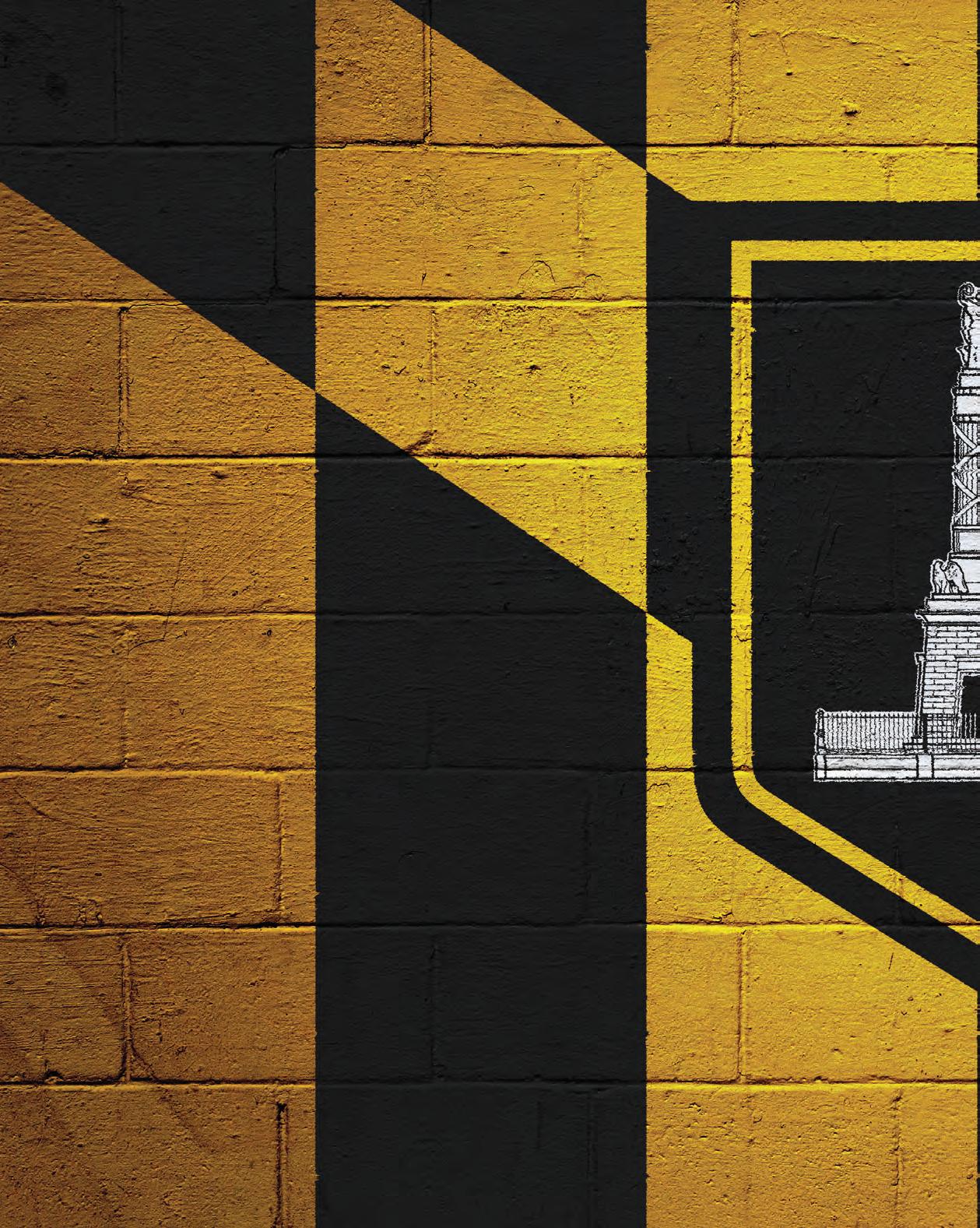
Correo electrónico profesional:
Objetivo profesional u objetivo del currículum:
Ejemplo: “Conseguir un trabajo a tiempo parcial que me ayude a desarrollar mis habilidades en tecnología y servicio al cliente”.
EXPERIENCIA LABORAL/HABILIDADES
Empresa y cargo (1):
Fechas (Inicio – Fin): _____________________________________________________________________________________________________________
Tareas (3 a 5 puntos):
•
•
•
Habilidades y capacitación especial:
Empresa y cargo (2):
Fechas (Inicio – Fin): _____________________________________________________________________________________________________________
Tareas (3 a 5 puntos):
•
•
•
Habilidades y capacitación especial:
EDUCACIÓN
Nombre de la escuela: ________________________________________________________ Fecha graduación (real o prevista): __________________
Cursos relevantes (AP, Honores, Universidad):
GPA (solo si es de 2.5 o más): __________ Certificados/Licencias:
ACTIVIDADES EXTRACURRICULARES Y PARTICIPACIÓN (Enumera el grupo/rol/años de participación. Marca todas las que correspondan).
• Deportes: ____________________________________________
• Grupos académicos: __________________________________
• Clubes de idiomas extranjeros: _________________________
• Grupos de música/talento: _____________________________
• Programas de capacitación profesional: _________________
• Servicio comunitario: __________________________________
• Participación basada en la fe: __________________________
• Pasatiempos (relacionadas con el trabajo): _______________ LOGROS/PREMIOS/RECONOCIMIENTOS (¡Enumera hasta 3 ejemplos sólidos que te destaquen!)
• • • Mentalidad de Maryland:
Tu currículum es más que palabras: es tu impacto, tu potencial y tu futuro. Comienza con fuerza, sé honesto y muéstrate listo para comenzar.
Tu currículum es más que solo un papel: es tu cartel publicitario personal que le dice a las escuelas, empleos y programas de pasantías exactamente quién eres y qué ofreces. Ya sea que te postules a la universidad, a tu primer trabajo o a un programa de liderazgo, esta es la forma en que actúas para tu futuro.
9 Sé sincero: toda la información debe ser verdadera y completa
9 Mantén un diseño coherente, ordenado y fácil de entender en una sola mirada
9 ¡Revisa y corrige! Errores ortográficos y gramaticales
CORREO ELECTRÓNICO
¿Tu correo electrónico es profesional? Evita los apodos o las bromas.
Prueba: nombre.apellido@gmail.com

ACTIVIDADES/RECONOCIMIENTOS
¿Practicaste deportes, participaste en algún club o ganaste un premio? Menciona tus roles de liderazgo y qué aprendiste.
VOLUNTARIADO
¿Ayudaste en tu iglesia, escuela o centro comunitario local? ¡Inclúyelo! Explica tu rol y las habilidades que adquiriste.
COMPETENCIAS HABILIDADES CLAVE
A los empleadores les encanta ver habilidades de la vida real como: Responsabilidad, administración del tiempo, trabajo en equipo, liderazgo, creatividad, habilidad de hacer varias tareas
INTERESES
Suma intereses que coincidan con el campo laboral o profesional. ¿Quieres trabajar en una clínica veterinaria? Menciona tu pasión por los animales.
444 Main Street Ellicott City, MD 21042 (410)-555-6789 jane.eyre@gmail.com
Education
CentralHighSchool
Perfect Attendance during first semester
CTE Nursing Program
Expectedgraduation: May 2025
Employment
Ellicott City Community Pool, Lifeguard
16 hours of work every weekend
Trained in CPR and First Aid
Maintained pool cleanliness and safety
Activities
Pending 2026
EDUCACIÓN +
GPA
Solo incluye el GPA si es de 2.5 o más. Destaca CTE, Honores, AP o Cursos de Nivel Universitario relevantes para el trabajo o programa.
EXPERIENCIA LABORAL
Summer 2024
¿Todavía no tienes mucha experiencia? No pasa nada. Concéntrate en tus habilidades, roles de voluntario y logros.
J.V. Soccer, Team Captain 2022-2023
8 hours of practice and two games every week
Led team to 14-2 record
Highest goal percentage on team
Won Spirit Award at end-of-year banquet
Helping Hand Nursing Center, Volunteer 2021-2022
4 hours of volunteer work twice a month
Talked to residents, designedactivities and assisted nurses
Recruited two more volunteers
Skills
Bilingual: Spanish and English
Basic computer skills, including Microsoft Word and PowerPoint
Organizational skills learned through balancing school, sports and family obligations
Dedication and hard work proven through athletic success.
Interests
Reading
Photography
Spending time with family
LAS FECHAS IMPORTAN
Incluye siempre las fechas de inicio y finalización. Muestra consistencia y compromiso.
Desde Annapolis hasta Hagerstown, los adolescentes de todo el estado están construyendo futuros llenos de desafíos. No tienes que esperar para empezar, tu marca ya está en avanzando.
Hoja de trabajo de preparación para entrevistas – Preséntate. Habla. Destácate.
Desde Ocean City hasta Baltimore, los estudiantes de Maryland están destacándose. Las entrevistas son tu oportunidad de demostrar que eres uno de ellos. Preparación = Fuerza. ¿Quieres causar una gran impresión en la sala? Comienza aquí.
“No planear = Fallar”- Usa estos 4 movimientos poderosos para prepararte como un profesional:
INVESTIGACIÓN – ¿de qué se trata la empresa/organización?
RESPUESTAS – piensa en las preguntas comunes y adapta tus respuestas al trabajo.
EJEMPLOS – usa historias de la vida real para demostrar tus habilidades
PRACTICA – ensaya con un amigo o un familiar, ¡o grábate!
COMPLETA TU INFORMACIÓN Y SÉ EL PROTAGONISTA DE TU HISTORIA
1. Preséntate:
¿Quién eres y cuáles son uno o dos aspectos destacados que muestran que estás listo para este puesto?
2. ¿Cuáles son tus metas a futuro? (¿Universidad, carrera, nuevas habilidades o trabajo justo después de la graduación?)
3. ¿Por qué deberían contratarte? (¿Qué hizo que te interese este puesto y qué tienes para ofrecer?)
4. ¿Cuáles son tus puntos fuertes? (Fortalezas reales: con una historia o logro que lo respalde).

6. Comparte un ejemplo de trabajo en equipo o liderazgo: (Piensa en proyectos grupales, clubes, deportes o trabajo voluntario).
5. ¿En qué punto débil estás trabajando? (Sé honesto: demuestra crecimiento, no perfección).

7. ¿Cómo manejaste una situación difícil? (La resolución de problemas es una habilidad, demuestra que la tienes).
8. ¿Qué pasatiempos se relacionan con el trabajo? (Aquí es donde la natación, la codificación, la escritura o la música podrían ayudarte a brillar).
9. Cosas que TÚ quieras preguntar: (Sé curioso. Demuestra que hablas en serio).
Mentalidad de Maryland:
No esperes a que la puerta se abra sola, ¡llama a la puerta! Luego entra listo y preparado.
Tu voz, Tu futuro, Tu Momento de Brillar
Desde Baltimore, Prince George’s o Eastern Shore, es hora de que tomes las riendas de tu momento. Aquí tienes la información que necesitas para dar lo mejor de ti en cualquier entrevista, pasantía o reunión universitaria.
PASO 1: INFLUENCIAR A LA SALA
Tu presencia es tu poder. Logra que lo sepan incluso antes que hables.
• Vístete para el puesto. Limpio, prolijo y seguro. Demuestra que hablas en serio.
• Toma notas. Lleva un cuaderno y un lápiz para demostrar que estás prestando atención.

• Comienza con energía. Preséntate con un apretón de manos firme (si es en persona) o haz contacto visual a través de la cámara web. ¡Las primeras impresiones dejan su huella!

PASO 2: EL MOMENTO DE SALIR A ESCENA
Este es tu momento: vende tu historia como un profesional.
• Haz la tarea. Investiga la empresa o la escuela. ¿Qué representan? ¿Cómo encajas tu en ese lugar?
• Lleva tu currículum. Incluso si ya lo tienen, lleva uno para entregar.
• Prepara tus respuestas. ¡Anticípate! Practica responder preguntas comunes de una entrevista con confianza.
¿Necesitas ideas? Más información en la página 30.

3: VIRALÍZATE (¡de la manera correcta!)
¡Mantiene la energía después de la entrevista!
• Agradece. Siempre agradece al entrevistador antes de irte. Gratitud = profesionalismo.
• Haz un seguimiento enseguida. Envía un correo electrónico o una nota de agradecimiento en un plazo de 24 horas. Menciona algo de lo que hablaste para hacerlo más personal. Prepárate. ¡Hazles saber que estás emocionado y listo para seguir adelante!
Mentalidad de Maryland:
Desde Thurgood Marshall hasta Jada Pinkett Smith, los habitantes de Maryland son conocidos por presentarse y destacarse. Usa tu voz. Sé el dueño de tu poder. Y nunca subestimes el impacto de estar preparado.
Cuando me aceptaron en la Universidad de Maryland, mi mamá dijo, “Te lo dije, te dije que ibas a entrar,” como si siempre lo hubiera sabido. Pero detrás de su voz calmada, pude sentir algo más profundo — miedo, orgullo, quizá incluso tristeza. Ese momento no fue ruidoso ni dramático, pero se quedó conmigo. Fue la primera vez que realmente me detuve y entendí lo que esto significaba, para las dos.



No estaba segura de que iba a entrar porque nadie a mi alrededor lo había hecho antes. La universidad siempre se sintió como algo tan lejano que no parecía real, como si estuviera tratando de abrir una puerta sin saber si siquiera tenía la llave correcta.
Mi mamá no se involucró mucho en las compras ni en la preparación para la mudanza. Sentí que estaba evitando la realidad de que me estaba yendo. Tal vez no estaba lista. En casa, como hija mayor, siempre he sido la persona a quien todos recurren para todo: traducir llamadas, ayudar con papeles, atender citas. Irme significaba alejarme de todo eso, y sentí que estaba dejando atrás quién siempre había sido, aunque también sabía que estaba dando un paso hacia quién estoy destinada a ser.
El día de la mudanza pasó en un abrir y cerrar de ojos. Cuando mi familia se fue y la habitación quedó en silencio, me senté al borde de la cama y lloré, lloré mucho. El peso de todo por fin me cayó encima: la distancia de casa, la responsabilidad, lo desconocido. El silencio no me daba paz. Era pesado.
Mi mamá siempre decía, “A veces tienes que dar un paso atrás y dejarlos volar.” No lo entendí hasta que me fui, pero eso era justo lo que ella estaba haciendo.
Ser la primera generación significa cargar más que tus propios sueños. Significa sostener los sacrificios, esperanzas y miedos silenciosos de las personas que te trajeron hasta aquí. Significa ser la primera en hablar cuando otros no pueden. Hay mucho orgullo en eso, pero también significa construir algo nuevo.
No hay muchas personas que se parezcan a nosotros en las clases. Pero por eso es que estamos aquí. La educación no es solo sobre títulos; es sobre poder, conciencia y transformación. Es cómo rompemos ciclos. Es cómo cambiamos la historia.
Sí, este camino es difícil. Y sí, a veces se siente solitario.
Pero no lo camino sola. Llevo la fortaleza de mi madre, la resiliencia de mi familia y mi propia fe en mí misma. Cada paso que doy, cada clase que apruebo, cada puerta que abro, es para todos nosotros.
Si vienes de una historia como la mía, recuerda esto: tu presencia en estos espacios ya es una forma de resistencia.
Tu educación no es solo para ti; es para quienes vinieron antes y para quienes vendrán después. Tu voz importa. Tus sueños importan. Tú perteneces aquí.




Como centro de defensa nacional, innovación médica, ciberseguridad y tecnología aeroespacial, Maryland desempeña un papel de liderazgo en la protección y el avance de nuestro país. Desde Fort Meade hasta Aberdeen Proving Ground, los estudiantes de todas las regiones de Maryland han dado un paso adelante para servir, y tu también puedes hacerlo.
Miles de estadounidenses eligen servir, y esa elección les ha abierto las puertas a educación, viajes, crecimiento personal y carreras gratificantes en una amplia gama de campos. ¿Crees que tu camino al éxito puede incluir un uniforme? Vamos a averiguarlo.
Debes ser ciudadano estadounidense para unirte, o ser residente permanente legal con una tarjeta verde válida. Puedes alistarte desde los 17 años con el consentimiento de tus padres o desde los 18 sin consentimiento, y tienes que tener un diploma de escuela secundaria o GED.
Unirse a las fuerzas armadas ofrece la oportunidad de contribuir a misiones vitales como desarrollar equipos de defensa innovadores, ayudar a los sistemas de salud, proteger alimentos y medicinas y rastrear patrones del cambio climático.
El servicio militar puede ayudarte en tu carrera profesional además de impulsar tu educación. El ejército ofrece muchos beneficios educativos, desde ayuda financiera hasta programas de pago de préstamos. El despliegue es un GRAN factor en este tipo de carrera, ¡varias secciones envían personas a diferentes áreas desde Alemania hasta Japón!
• Fort Meade: Inteligencia y ciberseguridad
• Aberdeen Proving Ground: Desarrollo e investigación
• Naval Academy (Annapolis): Educación y liderazgo

Hay varias secciones diferentes
Fuerza Aérea
(https://www.airforce.com/find-a-recruiter)
Fuerzas Armadas (https://www.goarmy.com/locate-arecruiter.html)
Guardia Costera
(https://www.gocoastguard.com/Careers)
Cuerpo de Marines (https://www.marines.com)
Fuerza Naval (https://www.navy.com/local)
Fuerza Espacial (https://www.spaceforce.com/how-to-join/ enlisted-guardians)
Paso 1: Realiza la Prueba de Aptitud Vocacional de las Fuerzas Armadas (ASVAB) para determinar tus calificaciones.
Paso 2: Aprueba el examen físico.
Paso 3: Reúnete con un consejero y elige una carrera.
Paso 4: Haz el juramento de alistamiento.
Paso 5: Recibe órdenes de entrenamiento básico y comienza tu camino hacia el nuevo capítulo de tu vida.


Marco A. Vicepresidente, p.65

Vernesha M. Médica p.64

Travis and Yussy M. Propietarios p.63

Sam S. Cofundador y socio p.61

Alexcia R. Maestra de cuarto grado p.60

William E. Director, Asuntos Gubernamentales y Externos p.59

Patricia F. Directora Financiera p.58

Jesus C. Asociado Senior de Marketing p.57

Bobbie D. Ingeniera mecánica p.56

Cyrus E.-M. Fundador y Presidente p.55

Julie C. Fundadora/ Directora Ejecutiva p.54

Cliff P. Administrador de guardaparques p.53


¿Cómo influyó vivir y trabajar en Maryland en su trayectoria personal o profesional?
Vivir y trabajar en Maryland ha sido una experiencia increíble. Me mudé del norte de New Jersey y trabajé en Nueva York, me mudé a Maryland en 2005 para trabajar en grandes megaproyectos de infraestructura. El primer megaproyecto fueron los carriles del peaje exprés de la I-95 en la zona de White Marsh. Desde entonces, he tenido la suerte de trabajar en casi todos los MEGA proyectos de infraestructura en Maryland.
Presidente y CEO, Cámara de Comercio Hispana de Maryland
Ciudad de Baltimore

¿Qué desafíos tuvo que enfrentar en la escuela secundaria?
¿Superarlos lo ayudó a crecer más fuerte o con más confianza?
En la escuela secundaria, no tenía a nadie que me guiara o me orientara. Cuando fui a la universidad, tuve que hacerlo todo yo solo. Tener mentores es muy importante, y eso es algo que nosotros, como profesionales, debemos estar disponibles para hacer, y así mostrarles a los estudiantes las oportunidades disponibles.
¿Qué oportunidades le ayudaron a llegar a donde está hoy?
Es importante ser mentor e involucrarse en las pasantías. No tuve esas oportunidades y tuve que aprender en el camino, a medida que avanzaba.
Si pudiera dar a los estudiantes un consejo para ayudarlos a ser dueños de su futuro, ¿cuál sería?
Para encontrar un mentor, hay que buscar una pasantía y participar en las ramas estudiantiles de las asociaciones profesionales. Voluntariado. El voluntariado abre puertas y ayuda a conocer a personas que pueden ser influyentes en futuras oportunidades y carreras. ¡¡¡EL QUE PERSEVERA TRIUNFA!!!


¿Cómo es un día de trabajo típico para usted?
Mi trabajo no es típico. Como ingeniero, trabajo como Gerente de Programas en proyectos de infraestructura que incluyen reuniones, coordinación de tareas, coordinación de subconsultores y redacción de propuestas. También dedico tiempo al trabajo voluntario, incluyendo liderar la Cámara de Comercio Hispana de Maryland, servir en siete juntas y coordinar el programa de la Semana de Ingenieros para la Sociedad de Ingeniería de Baltimore.
¿Qué habilidades, hábitos o formas de pensar le ayudaron a tener éxito? ¿Qué pueden hacer los estudiantes para comenzar a construirlos desde ahora?
Habilidades interpersonales, buena escucha y aprender, aprender, aprender.


¿Cuál era su materia favorita en la escuela? ¿Qué le gustaba de ella?
Sabía que quería ser médica desde los 9 años. ¡Me gustaban especialmente la química y la biología!
¿Cómo influyó vivir y trabajar en Maryland en su trayectoria personal o profesional?
La asignación militar de mi esposo nos trajo a Maryland, pero realmente se ha convertido en un hogar. Trabajo para una organización maravillosa cuyo enfoque principal es la prevención en la salud y ayudar a los pacientes a vivir más tiempo y de manera más saludable Por supuesto, somos lo suficientemente afortunados como para vivir cerca de DC y tener grandes museos, comida, música y cultura, ¡una gran ventaja! Me encanta vivir en la misma comunidad que muchos de mis pacientes. ¡Los veo en el gimnasio o en la iglesia!

¿Qué desafíos tuvo que enfrentar en la escuela secundaria?
¿Superarlos le ayudó a crecer más fuerte o con más confianza?
Vivía en el lado oeste del centro de la ciudad de Chicago, una zona afectada por la pobreza y la violencia de las pandillas. Afortunadamente, mi camino académico me permitió ir a una escuela secundaria de enfoque especializado en el lado norte de la ciudad. Tenía que viajar 45 minutos de ida y 45 minutos de vuelta en los buses de la ciudad para llegar. Hice la transición de una pequeña escuela privada de 200 estudiantes a una escuela secundaria de 4,000 estudiantes de distintos orígenes. Me mantuve ocupada participando en actividades extracurriculares como el grupo de baile de pompones, el coro de gospel, el sindicato de estudiantes negros, el club de premedicina, el club de lenguaje de señas y trabajando después de la escuela en Champs Sports. Estaba agradecida de tener un fuerte sistema de apoyo familiar. ¡Estar ocupada me mantuvo alejada de problemas!
¿Qué oportunidades le ayudaron a llegar a donde está hoy?
Nuestra escuela secundaria tenía un club de premedicina que nos daba acceso a profesionales médicos que solían venir y hablarnos sobre su trayectoria en medicina. En la universidad, trabajé como ayudante de salud estudiantil en los dormitorios, ayudante de enfermera en la enfermería estudiantil y como voluntaria en los hospitales del vecindario. Aproveché cualquier oportunidad para estar cerca de profesionales médicos.
Si pudiera darles a los estudiantes un consejo para ayudarlos a ser dueños de su futuro, ¿cuál sería?
Hagan lo que hagan en la vida, no dejen de aprender. El mundo evoluciona y la tecnología cambia. Sean curiosos y nunca dejen de hacer preguntas.
¿Cómo es un día de trabajo típico para usted?
Cuatro días a la semana, estoy en la clínica viendo a unos 19 pacientes al día en los consultorios ambulatorios. Como médica de medicina familiar, veo niños y adultos. En una sala de examen puede haber un bebé recién nacido para un examen de rutina y en la siguiente sala de examen puede tocarme un paciente de 90 años con demencia. Aunque mi horario de atención habitual es de 8 a 5 p.m., mis días se pueden completar respondiendo a los mensajes de pacientes, prescribiendo reposiciones de medicamento, revisando las notas de los especialistas o leyendo un artículo sobre un nuevo tratamiento médico.

¿Cuáles son las habilidades más importantes que utiliza en el trabajo?
La escucha activa, el pensamiento crítico, una buena comunicación y la gestión del tiempo.
¿Qué habilidades, hábitos o formas de pensar le han ayudado a tener éxito? ¿Qué pueden hacer los estudiantes para comenzar a construirlos desde ahora?
Hay una gran cantidad de información para aprender en medicina. Es realmente una carrera que implica el aprendizaje permanente. Tomen notas eficientes, revisen el material nuevo y hagan la tarea el mismo día que se les asigne. Dividan las tareas grandes en tareas más pequeñas. ¡Mantengan la curiosidad! Recuerden la importancia de cuidarse física, mental y espiritualmente.


¿Cuáles fueron sus asignaturas favoritas en la escuela? ¿Qué les gustaba de ellas?
Travis (T): Historia y geografía por mi fascinación con la tierra, la historia y la ubicación.
Yussy (Y): Arte, creación de piezas multimedia y libertad creativa de expresión.
¿Cómo influyó vivir y trabajar en Maryland en su trayectoria personal o profesional?
Vivir y trabajar en Maryland después de comenzar nuestro negocio en Texas nos ha enseñado a afinar nuestros objetivos profesionales, ya que el negocio es muy competitivo. Comprendan sus valores fundamentales y manténgase fieles a su misión.
¿Qué desafíos tuvieron que enfrentar en la escuela secundaria?
¿Superarlos los ayudó a crecer más fuertes o con más confianza?
T: Tratar de encajar, encontrar el camino y ganar confianza para ser uno mismo. Mantenerme fiel a mis valores fundamentales me ayudó a encontrarme a mí mismo.
Y: Mantener la concentración durante la escuela secundaria. Los superé empezando la universidad temprano. ¡Todo el mundo tiene un camino diferente!
¿Qué oportunidades les ayudaron a llegar a donde están hoy?
T: El deporte fue una gran influencia en mi naturaleza competitiva y mi conciencia social, el trabajo en equipo, las habilidades de comunicación y la confiabilidad.
Y: comenzar mi carrera en diseño de interiores; en alpacas y agricultura, otras granjas nos han apoyado increíblemente para ayudarnos a crecer y aprender más sobre nuestra industria.
Si pudieran darles a los estudiantes un consejo para ayudarlos a ser dueños de su futuro, ¿cuál sería?
T: ¡Confiar en los instintos y en la intuición!
Y: Dejen que la palabra “no” los motive todavía más. ¡Sean disruptivos!
¿Cómo es un día de trabajo típico para ustedes?
¡Nuestro día a día varía! Por lo general, comienza con la alimentación de las alpacas, siempre observando sus comportamientos para garantizar que todas estén felices y saludables. Luego, recoger y limpiar estiércol, hospedar y educar a los visitantes a través de nuestro
Black Barn Alpacas
Condado de Carroll
agroturismo, redes, compras, comercialización, operaciones minoristas y reuniones de negocios para mantener a nuestro equipo encaminado y enfocado en el crecimiento y la mejora todos los días.
¿Cuáles son las habilidades más importantes que utilizan en el trabajo?
T: Matemáticas, comunicación y conciencia del entorno.
Y: Creatividad, comunicación y motivación.
¿Qué habilidades, hábitos o mentalidad les ayudaron a tener éxito? ¿Qué pueden hacer los estudiantes para comenzar a construirlos desde ahora?
T: ¡Manténgase informados! Duden de la información que escuchan y aprendan por ustedes mismos.
Y: Consistencia. Presentarse todos los días y estar ahí para nuestro negocio y nuestros empleados, siendo positivos y motivadores para impulsar a nuestro equipo.





¿Qué pasa con las alpacas? ¡Conoce el programa de cría de Black Barn!
En Black Barn Alpacas, criamos alpacas negras y grises felices y saludables a través de una reproducción amable e inteligente. Nuestro objetivo es ayudar a las alpacas con lana suave, utilizando prácticas agrícolas sostenibles que cuiden a los animales y al planeta.
Dato curioso: Las alpacas murmullan para comunicarse entre sí, ¡especialmente cuando están felices o curiosas!


¿Cuál era su materia favorita en la escuela?
¿Qué le gustaba de ella?
Historia. Me encantó aprender sobre diferentes culturas y sus interacciones entre sí a lo largo de la historia. Fue un buen recordatorio de lo grande y diverso que es el mundo, una perspectiva que fue importante para mí, dado que crecí en uno de los condados menos poblados de Maryland: el condado de Talbot.
¿Cómo influyó vivir y trabajar en Maryland en su trayectoria personal o profesional?

Maryland tiene diversidad en todo. Hay algo para todos en este estado, por lo que es fácil encontrar EL lugar para cada uno. Maryland tiene muchas oportunidades que aprovechar para encontrar el éxito. El estado es lo suficientemente grande como para que haya muchas posibilidades para crecer para los aspirantes a CEO. Pero la política del estado es refrescantemente accesible, de modo que a los que tienen aspiraciones políticas les resultará fácil lanzarse al ring e involucrarse.

¿Qué desafíos tuvo que enfrentar en la escuela secundaria? ¿Superarlos lo ayudó a crecer más fuerte o con más confianza?

No era muy bueno para tomar exámenes estandarizados en la escuela, por lo que mi puntaje en el SAT fue mucho más bajo de lo que esperaba y más bajo que el de la mayoría de mis amigos. Pensé que era inferior académicamente y esto me afectaba mucho psicológicamente. Pero mis puntajes fueron lo suficientemente buenos para poder ir a la universidad que era mi primera opción y tuve un buen desempeño cuando me inscribí. Tanto es así que era un estudiante A/B en la universidad y me gradué con un GPA más alto que la mayoría de los mismos amigos con los que me gradué de la escuela secundaria, que tenían puntajes SAT más altos. En ese momento no sabía que las pruebas estandarizadas como el SAT y el ACT por sí solos no sirven como indicadores de cómo le irá a uno en la universidad. Lo que es más importante es la determinación y el enfoque. Cuando las clases se volvieron desafiantes (¡como la física!), no bajé la cabeza y abandoné la clase como el 50% de mis compañeros de clase. Acepté el reto sin quejarme y estudié mucho. Los resultados de mi primer examen en la clase fueron de un 32%. Me fue genial en el final y terminé la clase con una calificación general de B menos. Después de haber hecho lo que pensaba que era imposible en ese momento, tengo confianza cada vez que me encuentro en una situación difícil.
¿Qué oportunidades lo ayudaron a llegar a donde está hoy? Estoy muy agradecido con mi consejera de carrera en la escuela secundaria que me dijo: “Te iría muy bien en Elon University”. Nunca había oído hablar de la escuela hasta que ella la mencionó, así que la investigué y fuimos a visitarla con mi familia. Ella tenía razón y me fue muy bien allí. Tanto es así que atribuyo gran parte de lo que he logrado a mi tiempo en Elon University. Sin esa recomendación oportuna y bien dirigida de alguien en quien confiaba, mi vida probablemente se vería bastante diferente. Escuchen a las personas más cercanas; es probable que sepan cosas sobre ustedes que ustedes mismo no notaron.
Si pudiera darles a los estudiantes un consejo para ayudarlos a ser dueños de su futuro, ¿cuál sería?
La vida no es una progresión lineal. Habrá dificultades, adversidades y contratiempos. Una vez que entiendan esto y aprendan a «surfear la ola» sin dejar de ser agradecidos, humildes, pero decididos, encontrarán que la vida es un viaje emocionante. Disfruten del viaje.
¿Cómo es un día de trabajo típico?
Mi trabajo consiste en ayudar a empresas y organizaciones a resolver problemas complejos. Mis días consisten en investigar los problemas y las soluciones correspondientes, interactuar con los clientes para garantizar que puedan implementar soluciones y luego promover los éxitos de los clientes como estudios de casos en los sitios de redes sociales y la prensa.
¿Qué habilidades, hábitos o formas de pensar le ayudaron a tener éxito?
¿Qué pueden hacer los estudiantes para comenzar a construirlos desde ahora?
La curiosidad ha sido una habilidad, hábito y forma de pensar que me ha impulsado hasta ahora. La curiosidad me obliga a investigar y aprender cosas nuevas. A través del acto de aprender, después quiero implementar, por lo que la acción de seguimiento que tomo viene en forma de experimentación o probando lo que estudié. De esto surgen nuevas habilidades o ideas, que luego pueden conducir a un nuevo pasatiempo o proyecto empresarial. La curiosidad me llevó a iniciar tres empresas comerciales y ahora estoy lanzando una organización sin fines de lucro. También encontré varios pasatiempos nuevos que disfruté inmensamente. Nunca se estanquen, siempre prueben cosas nuevas.


¿Cuál era su materia favorita en la escuela? ¿Qué le gustaba de ella?
Me encantaba la ciencia porque cada clase se sentía como entrar en un nuevo misterio que necesitaba ser resuelto. El aspecto colaborativo, donde mis compañeros de clase y yo investigábamos, planteábamos hipótesis y juntábamos pistas, hizo que el proceso de comprender cómo funciona el mundo fuera aún más emocionante. No se trataba solo de aprender hechos; se trataba de la emoción compartida del descubrimiento al alcance de la mano y la emoción de descubrir las respuestas.
¿Cómo influyó vivir y trabajar en Maryland en su trayectoria personal o profesional?
Vivir y trabajar en Maryland ha dado forma en gran medida mi trayectoria profesional debido a los increíbles maestros que tuve aquí. Desde la escuela primaria hasta la universidad, ciertos educadores realmente se quedaron en mí, despertando mi curiosidad y mostrándome el increíble impacto que puede tener un maestro dedicado. Su pasión y su genuino cuidado por los estudiantes fueron tan inspiradores que un día decidí: “Quiero hacer lo que ellos hacen”. Fue una sensación increíble crecer con tanta orientación y pertenencia de los maestros en la escuela. Sabía que quería convertirme en el tipo de maestra que los estudiantes recuerden y digan: “Me encantó su clase”. Los educadores de Maryland realmente me pusieron en este camino.
Públicas del Condado de Washington
Condado de Washington

grado. Cada miembro de ese equipo desempeñó un papel clave en lo que soy hoy como educadora.
¿Qué desafíos tuvo que enfrentar en la escuela secundaria? ¿Superarlos le ayudó a crecer más fuerte o con más confianza?
La escuela secundaria fue un período de verdadera incertidumbre e indecisión para mí; simplemente no sabía lo que quería hacer después de la graduación, y sentía que todos los demás tenían su futuro resuelto. No fue hasta mi último año que finalmente decidí explorar la educación, uniéndome a un programa en la escuela a pesar de que era demasiado tarde para obtener crédito. Esa decisión fue un punto de inflexión, ya que entrar en el aula y trabajar con maestros y estudiantes hizo que algo simplemente hiciera clic. Esta experiencia inicial despertó una pasión que continué persiguiendo a través de la universidad, y cada vez que estaba enseñando, me sentía realmente brillante, sabiendo que estaba donde estaba destinada a estar. Superar esa indecisión temprana y arriesgarme con algo nuevo, incluso cuando parecía que era tarde, finalmente me ayudó a descubrir un profundo sentido de propósito y aumentó significativamente mi confianza en la dirección elegida. ¿Qué oportunidades le ayudaron a llegar a donde está hoy?
Tuve el placer de trabajar junto a varios profesores increíbles a través de pasantías. Estas experiencias me permitieron aprender mucho sobre el “detrás de escena” de la enseñanza en varios niveles de grado. Estas oportunidades también me permitieron identificar dónde sentía que pertenecía como educadora. Tuve la posibilidad de trabajar con estudiantes desde el kinder hasta 5to grado antes de decidir dónde sentía que podía tener el mayor impacto. Cuando comencé a solicitar trabajos, me acerqué a muchos educadores con los que trabajé para hablarles de mi carrera. Sentí que tenía un equipo dentro de la enseñanza y que se ramificaba más allá de una escuela o un nivel de
¿Cómo es un día de trabajo típico?
Mi día escolar comienza con la alarma a las 5:30 a.m., y arranca a las 7:00 a.m. Inmediatamente nos sumergimos en las habilidades ELA, diseccionando historias y elaborando argumentos. A media mañana, me encanta ver a los estudiantes jugar en el recreo y ganarles en las carreras. Después, podemos tener una misteriosa lección de ciencia o viajar en el tiempo para aprender historia, dándole vida a las lecciones. Cuando envío a los estudiantes a Encore, es mi momento de concentración para completar cualquier trabajo necesario en el aula. Después de un breve descanso para almorzar, el día termina con matemáticas, abordando problemas y desarrollando nuestras habilidades.
¿Qué habilidades, hábitos o forma de pensar le ayudaron a tener éxito? ¿Qué pueden hacer los estudiantes para comenzar a construirlos desde ahora?
La habilidad más importante que me ha ayudado a tener éxito es la adaptabilidad. En la enseñanza, no hay dos días iguales; siempre hay giros inesperados. En lugar de rendirme por tener un «mal día» o enfrentar desafíos, he aprendido a verlos como oportunidades para ser creativa y encontrar nuevas soluciones. Esta forma de pensar me permite abrazar la flexibilidad, viendo los giros inesperados no como obstáculos, sino como caminos diferentes para intentarlo. Los estudiantes pueden comenzar a desarrollar esto ahora adoptando una “mentalidad de crecimiento”. Entendiendo que aprendemos de los errores y viendo los desafíos como oportunidades para crecer, en lugar de limitaciones y contratiempos. No tengan miedo de probar nuevos enfoques cuando algo no funciona y recuerden que cada «mal día» es solo una oportunidad para aprender y tener un mejor mañana.


¿Cuáles fueron sus asignaturas favoritas en la escuela? ¿Qué le gustaba de ellas?
Cálculo e informática porque podía resolver problemas complejos.
¿Cómo influyó vivir y trabajar en Maryland en su trayectoria personal o profesional?
He estado viviendo y trabajando en Maryland toda mi carrera. Ha sido una bendición poder trabajar, vivir y servir en una comunidad tan diversa y en crecimiento que se compromete a empoderar a nuestros jóvenes.
¿Qué desafíos tuvo que enfrentar en la escuela secundaria? ¿Superarlos le ayudó a crecer más fuerte o con más confianza?



Mi mayor desafío fue poder concentrarme en el éxito a largo plazo y no en la satisfacción a corto plazo. Pude hacer esto concentrándome en crear un plan de cinco años y seguir preguntándome: ¿Esto me ayuda a acercarme a esos objetivos? Tener autodisciplina ayuda a mantenerse en el buen camino, incluso en los días en que falta motivación para hacerlo.
¿Qué oportunidades le ayudaron a llegar a donde está hoy?
Tener mentores que siempre quisieron más para mí que lo querían para sí mismos me ayudó enormemente, y acceder a la financiación a través de becas debido a las cargas financieras que mi familia enfrentó.
Si pudiera darles a los estudiantes un consejo para ayudarlos a ser dueños de su futuro, ¿cuál sería?
Usaré el baloncesto como mi analogía para esta pregunta.
Fallarán el 100% de los tiros que no intenten. Así que… no tengas miedo de lanzar. Y aún más importante, solo se arrepentirán y recordarán los tiros que no hicieron, no los riesgos que tomaron o los tiros que fallaron, porque incluso cuando fallamos, nos acercamos a nuestro objetivo.
¿Cómo es un día de trabajo típico?
Me encanta mi trabajo. Todos los días, me esfuerzo por ayudar a mi comunidad, a mis clientes y a quienes viven en la región del DMV a usar la energía de manera más eficiente y limpia cada día. Trabajo con funcionarios electos locales y estatales para crear una legislación significativa que ayude al Estado de Maryland a reducir su huella de carbono, ser más sostenible y crear una economía de energía limpia.
¿Cuáles son las habilidades más importantes que utiliza en el trabajo?
Tres habilidades que me encantan, que no requieren talento ni habilidades especiales, pero que marcarán la diferencia en la forma en que hacen que alguien se destaque de sus compañeros: el esfuerzo, la actitud y la puntualidad.


¿Cuáles fueron sus asignaturas favoritas en la escuela?
¿Qué es lo que más le gustó de ellas?
Negocios y Álgebra. Me encantaba resolver ecuaciones y era miembro del Exploratory Business Careers Club (EBCC). El EBCC nos ayudó a explorar carreras de negocios. Aprendí sobre vestimenta de negocios, redacción de currículums y adquirí experiencia laboral real como pasante en IBM durante mis años junior y senior de secundaria.
¿Cómo influyó vivir y trabajar en Maryland en su trayectoria personal o profesional?
Maryland Public Television
Condado/Ciudad de Baltimore

Vivir en Maryland me ofreció numerosas oportunidades después de graduarme de la universidad. El costo de vida era más bajo en Maryland en comparación con Nueva York. Decidí vivir aquí porque el panorama profesional ofrecía la oportunidad de seguir múltiples carreras profesionales en el sector financiero, incluyendo la industria privada, la banca, el gobierno y hasta emprendimientos, por nombrar algunos. También me iba a permitir perseguir mis aspiraciones vocacionales haciendo voluntariado en la comunidad local y los hospitales mientras cumplía mi pasión de ayudar a las personas.
¿Qué oportunidades le ayudaron a llegar a donde está hoy?
Yo era una estudiante promedio en la escuela secundaria. Vengo de una familia de clase trabajadora y la máxima prioridad no era la educación postsecundaria. No me gradué de la escuela secundaria con acceso a un fideicomiso prepago o a un fondo universitario. La universidad comunitaria no era la ruta más popular para obtener una educación universitaria y estaba mal vista. Pude obtener una pequeña beca que pagó 1,5 años de universidad comunitaria. Cuando se agotó la beca, tuve que ir a trabajar. Mi impulso y mi pasión siempre fueron completar un título de cuatro años para perseguir mis sueños y asegurar mi futuro. Me fui de mi primer trabajo para seguir mis objetivos educativos. Di el salto y me mudé a Maryland para obtener una licenciatura en contabilidad en la Morgan State University. Si pudiera darles a los estudiantes un consejo para ayudarlos a ser dueños de su futuro, ¿cuál sería?

La suma de mis experiencias de vida me ha ayudado a llegar a donde estoy hoy. Me beneficié enormemente de mi pasantía en la escuela secundaria en IBM, ser voluntaria el fin de semana en nuestro hospital local y hogar de ancianos, estar conectada en mi comunidad de fe y aprovechar esas relaciones para encontrar oportunidades de aprendizaje durante las vacaciones
de verano y primavera. También aproveché la capacitación gratuita en las bibliotecas y encontré oportunidades en la comunidad para ser voluntaria como presidenta de la asociación comunitaria, coordinar las actividades de limpieza de la comunidad y alimentar a las personas sin hogar, por nombrar algunas. El voluntariado siempre me mantuvo conectada y humilde.
¿Cuáles son las habilidades más importantes que utiliza en el trabajo?
Mi día empieza estableciendo intenciones y escribiendo metas para el día en mi diario, a menudo durante la reflexión matutina. Colaboro con los vicepresidentes de departamento y los enlaces fiscales en pronósticos, presupuestos, gastos y actividades generadoras de ingresos. Durante la sesión legislativa, represento a MPT en las audiencias presupuestarias de la Asamblea General. También capacito activamente y animo a mi equipo a buscar oportunidades de crecimiento profesional y personal.
¿Qué habilidades, hábitos o formas de pensar le han ayudado a tener éxito?¿Qué pueden hacer los estudiantes para comenzar a construirlos desde ahora?
• Leo y escucho audiolibros regularmente para mejorar mis habilidades.
• La gestión eficaz del tiempo es clave para aprovechar al máximo cada día.
• Identifiquen sus fortalezas y busquen activamente formas de desarrollarlas.
• Veo cada resultado, positivo o negativo, como una oportunidad de aprendizaje.
• Valoro las pequeñas alegrías de la vida; la gratitud y el descanso son esenciales para el crecimiento.
• Todo lo que necesitan ya está dentro de ustedes, como una semilla, solo necesita el entorno adecuado para prosperar.


¿Cuáles fueron sus asignaturas favoritas en la escuela?
¿Qué le gustaba de ellas?
Las matemáticas y la tecnología eran mis clases favoritas en la escuela. Me gustó cómo me desafiaron a pensar en los problemas y encontrar soluciones. Siempre me ha gustado ese tipo de resolución de problemas.
¿Cómo influyó vivir y trabajar en Maryland en su trayectoria personal o profesional?
Desde la vida en la ciudad hasta las tierras de cultivo rurales y mi hogar en la costa este, Maryland me ha presentado a diversas personas, culturas y formas de vida. Esta diversidad me ha moldeado, enseñándome a ser adaptable y respetuoso con las perspectivas de los demás. Maryland me ha ayudado a crecer personal y profesionalmente y me enorgullece ser parte de un estado tan dinámico.
The Insurance Market
Condado de Wicomico

que mis dos hijos pueden admirar un día, al igual que yo lo admiro a él.
¿Qué desafíos tuvo que enfrentar en la escuela secundaria? ¿Superarlos le ayudó a crecer más fuerte o con más confianza?

Al entrar en la escuela secundaria, tenía un objetivo claro: ser el primero de mi familia en ir a la universidad y graduarme. Ese objetivo vino con mucha presión, pero también sabía que tenía personas que me apoyaban. Tomé las cosas un día a la vez, me mantuve enfocado e hice todo lo posible para seguir adelante. Ese viaje me ayudó a construir verdadera confianza. Me probé a mí mismo que no me rendiría, sin importar lo difícil que fuera. Todavía tengo esa mentalidad hoy en día, siempre esforzándome para crecer tanto en mi vida personal como en mi carrera.
¿Qué oportunidades le ayudaron a llegar a donde está hoy?
Mi mayor mentor siempre ha sido mi abuelo, Edward Cruz. Creció con muy poco, pero nunca dejó que eso lo detuviera. Trabajó durante más de 40 años como ingeniero en la NASA, se mantuvo comprometido con su familia y siempre encontró formas de ayudar a los demás. De él aprendí el valor de ser desinteresado, respetuoso y fuerte. Su ejemplo me inspira a mantenerme activo en mi comunidad y retribuir a través de mi trabajo siempre que pueda. Más que nada, me motiva a ser el tipo de persona
Si pudiera darles a los estudiantes un consejo para ayudarlos a ser dueños de su futuro, ¿cuál sería?
San fieles con ustedes mismos y aprovechen el impulso interno que los motiva a convertirse en las personas que siempre han soñado ser.
¿Cómo es un día de trabajo típico?
La mejor parte de mi trabajo es que no hay dos días iguales. Un día, puedo estar trabajando en la cobertura para el propietario de una granja local, al siguiente puedo estar manejando un seguro para un negocio de HVAC, y unos días más tarde, estar enfocándome en un campo de golf junto al agua. Colaboro estrechamente con mi equipo de ventas y nuestros suscriptores de transportistas asociados para crear pólizas de seguro personalizadas y soluciones de riesgo que garanticen que los negocios de nuestros clientes estén completamente protegidos. ¿Cuáles son las habilidades más importantes que usa en el trabajo y cómo pueden hacer los estudiantes para comenzar a desarrollarlas ahora?
La resolución de problemas, la colaboración y la adaptabilidad son esenciales en mi función. Personalizar las pólizas de seguro para diferentes empresas implica pensar creativamente para satisfacer necesidades únicas, trabajar en estrecha colaboración con mis compañeros de equipo y adaptarse rápidamente a los nuevos desafíos. Estas habilidades, junto con la resiliencia, han sido clave para mi éxito. También he aprendido que los errores son parte del viaje, siempre y cuando aprendas de ellos y sigas creciendo. Los estudiantes pueden desarrollar estas habilidades ahora abordando proyectos que requieren pensamiento crítico, estando comprometidos incluso frente a contratiempos y saliendo de sus zonas de confort a través de nuevas actividades o trabajo voluntario, a través de diferentes materias, actividades o voluntariado.


¿Cuáles fueron sus asignaturas favoritas en la escuela? ¿Qué le gustaba de ellas?
Todas las ciencias, especialmente la biología. Disfruté de cómo lo que aprendí en clases me ayudó a comprender mejor cómo funciona el mundo a mi alrededor.
¿Cómo influyó vivir y trabajar en Maryland en su trayectoria personal o profesional?
¡Influyó muchísimo! La Base Aérea Naval de Patuxent River, ubicada en el sur de Maryland, creó un programa llamado Programa Pathways para emplear ingenieros del área del sur de Maryland para aumentar la retención de ingenieros más jóvenes. Al asistir a College of Southern Maryland, me enteré de este programa con el que la Marina de los EE. UU. pagaría mis últimos 2 años de universidad, me daría un trabajo cooperativo como pasante de ingeniería durante las vacaciones escolares y un puesto de trabajo de ingeniería garantizado después de la graduación si obtenía un título en ingeniería mecánica. Probablemente no hubiera sido ingeniera mecánica si no hubiera crecido en Maryland, específicamente en el sur de Maryland, y si no hubiera tenido esta oportunidad de NAWCAD PAX River.
¿Qué desafíos tuvo que enfrentar en la escuela secundaria?
¿Superarlos le ayudó a crecer más fuerte o con más confianza?

sus habilidades con las de sus compañeros. Si están presentes y hacen su mejor esfuerzo, estarán haciendo un gran trabajo y tendrán éxito. Tienen habilidades y experiencias que nadie más tiene; apóyense en ellas.
Tuve problemas para sentirme segura de mis habilidades matemáticas durante la escuela secundaria y los primeros años de la universidad. Superé esto entendiendo que podría tener que trabajar un poco más duro que algunos de mis compañeros y decidí no compararme con los demás. Decidí “correr mi propia carrera”, que en la práctica significaba trabajar para entender de qué forma aprendía mejor y aplicaba esos métodos a mí misma, incluso si eran distintos que los de los demás.
¿Qué oportunidades le ayudaron a llegar a donde está hoy?
El Programa Patuxent River Pathways de la Base Aérea Naval Patuxent River me dio tres cosas:
1. Clases universitarias impartidas por ingenieros en ejercicio de la Base Aérea Naval de PAX River, por lo que aprendí los principios de ingeniería a través de ejemplos del mundo real que todavía aplico hoy.
2. La oportunidad de trabajar como pasante de ingeniería en mis vacaciones escolares con el mismo grupo de ingeniería con el que trabajo hoy, así que comencé a trabajar cuando me convertí en ingeniera a tiempo completo.
3. Todo un equipo de personas que se dedicaron a ayudarme a tener éxito, desde consejeros de ingeniería hasta profesores que me dieron consejos, hasta las personas que se aseguraron de que el papeleo estuviera en orden cada semestre.
Si pudiera darles a los estudiantes un consejo para ayudarlos a ser dueños de su futuro, ¿cuál sería?
Corran su propia carrera. No se comparen ni comparen
¿Cómo es un día de trabajo típico?
Vengo a mi laboratorio, voy a mi escritorio y reviso mi correo electrónico. Si hay una solicitud de inspección para un avión, recopilo información sobre el material y la geometría, decido el método de inspección apropiado y voy al hangar para realizar la inspección. Asisto a reuniones a lo largo del día con contratistas principales, subcontratistas, líderes de programas y depósitos de mantenimiento para resolver problemas de inspección a lo largo del ciclo de vida de la aeronave. Si hay piezas o paneles en el laboratorio para inspeccionar, puedo realizar esas inspecciones con equipos de inspección más avanzados ubicados en mi laboratorio. En cada momento de mi día, me comunico con los demás para coordinar, orientar, hacer preguntas y transmitir información.

¿Qué habilidades, hábitos o formas de pensar le ayudaron a tener éxito? ¿Qué pueden hacer los estudiantes para comenzar a construirlos desde ahora?
Escucha activa: muchos problemas derivan de la falta de comunicación. Aprendan a sentarse y escuchar, escuchen ambos lados de la discusión. Practiquen identificar dónde está el problema de la comunicación y cómo pueden aclarar ese problema específico. Si pueden hacer eso, se ahorrarán a ustedes mismos y a su futuro empleador mucho tiempo y energía. Priorización: decidan qué es lo más importante en lo que debe trabajar hoy, porque siempre habrá varios elementos que deben hacerse y somos solo una persona. Comiencen a practicar esto ahora con sus cursos.


¿Cuáles fueron sus asignaturas favoritas en la escuela? ¿Qué le gustaba de ellas?
Matemáticas y física. Ambas eran divertidas e interesantes.
¿Cómo influyó vivir y trabajar en Maryland en su trayectoria personal o profesional?
Nunca he vivido en ningún lugar durante más de unos pocos años seguidos. Maryland es mi hogar. Es un estado hermoso con gente amable y una gran concentración de tecnología e investigación. El estado también tiene un gran sistema de escuelas públicas y un gran número de grandes universidades.
Rapid Prototyping & Manufacturing Technologies, LLC (RPM Tech) Condado de Garrett

¿Qué desafíos tuvo que enfrentar en la escuela secundaria?
¿Superarlos le ayudó a ser más fuerte o a tener más confianza?
Ser antipático. Los superé con curiosidad e interés por la tecnología y las matemáticas, junto con el apoyo de amigos.
¿Qué oportunidades le ayudaron a llegar a donde está hoy?
Muy pocas hasta mi primer trabajo, cuando fui

asesorado por un grupo de individuos brillantes y generosos.
Si pudiera darles a los estudiantes un consejo para ayudarlos a ser dueños de su futuro, ¿cuál sería?
Sean una esponja para el resto de su vida: aprendan de todos y de todo, incluso si no parece relevante o complejo, y conéctense, conéctense, conéctense. Estén en contacto con todos... nunca se sabe.

¿Cómo es un día de trabajo típico?
Innovo y resuelvo problemas, algunos simples y otros muy complejos. Diseño soluciones, creo diseños y prototipos. Cuando termino con un diseño, lo paso a producción.
¿Cuáles son las habilidades más importantes que utiliza en el trabajo?
Resolver problemas, escuchar, analizar y cuestionar todos los datos e información.
¿Qué habilidades, hábitos o formas de pensar le ayudaron a tener éxito? ¿Qué pueden hacer los estudiantes para comenzar a construirlos desde ahora?
Tengan la mente abierta, estén dispuestos a escuchar una opinión diferente, intenten cosas difíciles, no tengan miedo al fracaso y no se rindan. Siempre revisen los datos, piénsenlo dos veces antes de tomar decisiones, hagan preguntas y tengan la confianza de estar en desacuerdo con las personas más experimentadas cuando sientan que están equivocadas.


¿Cómo influyó vivir y trabajar en Maryland en su trayectoria personal o profesional?
He vivido en Maryland toda mi vida. Nací en Annapolis y crecí en Glen Burnie. Me mudé a la costa este a los 20 años. Tengo la experiencia completa de lo que es vivir en Maryland. Criar a mi familia en la costa este fue una experiencia diferente a la forma en la que yo crecí. Tuve la experiencia de tener muchos recursos en Glen Burnie y menos en la costa este. Esto me hizo darme cuenta de la necesidad de tener más recursos disponibles en las zonas rurales.
¿Qué desafíos tuvo que enfrentar en la escuela secundaria? ¿Superarlos le ayudó a crecer más fuerte o con más confianza?
Un desafío que tuve en la escuela secundaria fue uno que no superé hasta más tarde en la vida. Mis padres se divorciaron cuando yo tenía 16 años y eso afectó mis estudios. Tenía el deseo de ir a la universidad, pero me dijeron que no podíamos pagarlo. Este fue un sueño que dejé en suspenso hasta que tuve 40 años. Mi consejo sería que investiguen sus oportunidades y no solo confíen en la palabra de otra persona. Si quieren hacer algo y lo desean realmente, encontrarán la manera.
¿Qué oportunidades le ayudaron a llegar a donde está hoy?
Harriett’s House Inc.
Condado de Dorchester

Mientras obtenía mi título, hice una pasantía en un centro de salud mental donde pude obtener mucha experiencia en muchos puestos diferentes. Finalmente, obtuve un trabajo allí como Defensora de Víctimas. Esta experiencia me ayudó a identificar el área en la que quería centrarme para mi carrera. Más tarde, me invitaron a participar en un programa de mentoría y capacitación que me permitió aprender lo que necesitaba para abrir un Programa Residencial para sobrevivientes de trata de personas. Si pudiera darles a los estudiantes un consejo para ayudarlos a ser dueños de su futuro, ¿cuál sería?

Exploren diferentes oportunidades. Sigan sus pasiones y descubran a dónde los lleva su corazón. No permitan que otra persona les diga lo que deben hacer con su vida. Los intereses cambiarán a medida que crezcan. Permítanse estar abiertos a las posibilidades.
¿Cómo es un día de trabajo típico? Mis días cambian de uno a otro.
Algunos días, estoy trabajando con las mujeres en nuestro programa para enseñar habilidades, hacer mentorías y construir relaciones. Otros días, estoy trabajando con clientes en nuestro centro de atención directa o creando productos para el departamento de ventas al por menor de la organización. Otros días, gestiono empleados, trabajo en nuestro sitio web, creo nuestro boletín informativo, asisto a charlas o recaudo dinero. Muchos aspectos diferentes de mi trabajo lo hacen seguir siendo interesante.
¿Qué habilidades, hábitos o formas de pensar le ayudaron a tener éxito? ¿Qué pueden hacer los estudiantes para comenzar a construirlos desde ahora?
Ser fieles a sí mismos. No intenten adaptarse al molde de otra persona. Hagan una lista diaria de las cosas que quieren lograr y trabajen para lograrlas. Sean honestos: la integridad es crucial. Hagan todo con excelencia, no tomen atajos ni se conformen con menos de lo mejor. Su reputación e integridad lo son todo.


¿Cuál era su materia favorita en la escuela? ¿Qué le gustaba de ella?
Ciencias Ambientales, nuestro maestro tuvo un enfoque práctico con la clase, incluidas varias excursiones para explorar lo que estábamos discutiendo.
¿Cómo ha influido la vida en Maryland en su trayectoria personal o profesional?
Al crecer en Maryland, mi familia a menudo se recreaba al aire libre. Hacíamos senderismo, acampábamos y pescábamos en muchos de los parques estatales del oeste de Maryland. Sin siquiera darme cuenta, creo que me ayudó a ponerme en el camino que me llevó a convertirme en Park Ranger. La cantidad de oportunidades al aire libre siempre me atrajo cuando era niño.
¿Qué oportunidades le ayudaron a llegar a donde está hoy?

Maryland Park Services, Parque Estatal Rocky Gap
Condado de Allegany

¿Cómo es un día de trabajo típico?
Durante mi pasantía en Rocky Gap State Park en la universidad, mi supervisor del sitio desempeñó un papel crucial en la consolidación de mi elección de carrera. Sin su guía y las valiosas experiencias que adquirí durante ese tiempo, no estoy seguro de si estaría donde estoy hoy.
Si pudiera darles a los estudiantes un consejo para ayudarlos a ser dueños de su futuro, ¿cuál sería?
Si hay algo que les apasiona o un campo que les interesa, busquen todas las oportunidades para explorar esos campos o pasiones. Busquen un empleo de verano o incluso oportunidades de voluntariado. Siempre estén dispuestos a aprender y no tengan miedo de fallar.

A menudo le decimos a la gente que no hay días típicos para un guardaparques. Sin embargo, hay algunas tareas que se repiten siempre, como contar y verificar el dinero al comienzo o al final de su turno. La limpieza de baños o campings también es necesaria para apoyar al resto del personal. Además, se responden las preguntas de los clientes o se ayuda a encontrar la información que necesitan. Dependiendo del turno, es posible que también haya que abrir o cerrar las puertas de varias áreas. La flexibilidad es clave, ya que surgirán situaciones inesperadas que requerirán adaptarse y superar desafíos. ¿Cuáles son las habilidades más importantes que utiliza en el trabajo?
Comunicación, tanto verbal como escrita. Habilidades interpersonales, la capacidad de hablar y escuchar a las personas para entender cuáles son realmente sus necesidades. Siempre sea flexible; las cosas van a cambiar y deben poder cambiar con ellas. ¿Qué habilidades, hábitos o formas de pensar le han ayudado a tener éxito? ¿Qué pueden hacer los estudiantes para comenzar a construirlos desde ahora?
Hablar en público y redacción técnica. Tomen todas las clases que puedan que mejoren su capacidad para escribir y hablar. Eviten el uso de términos informales y sean siempre honestos al comunicarse con las personas. Recuerden respirar y siempre recuerden que trabajan al aire libre en algunos de los lugares más hermosos que Maryland tiene para ofrecer. A los guardaparques se les paga con vistas excepcionales y puestas de sol increíbles.









Ciara Ross
Fort Hill High School, Condado de Allegany
Saniyah Grimes
Baltimore City College, Ciudad de Baltimore
Brett Sheranko
Patuxent High School, Condado de Calvert
Emily Hornberger
Rising Sun High School, Condado de Cecil
Fredimanuel Seshie
Oakdale High School, Condado de Frederick
Sakshi Tirodkar
Long Reach High School, Condado de Howard
Mueez Peleowo
Oxon Hill High School, Condado de Prince George







Ava Cotroneo
Leonardtown High School, Condado de St. Mary
Haven Rodriguez
Wicomico High School, Condado de Wicomico
Kayla Morrison
Meade High School, Condado de Anne Arundel
Tremen McBride
Owings Mills High School, Condado de Baltimore
Kelly Harding
Colonel Richardson High School, Condado de Caroline
Kennady Hawkins
Thomas Stone High School, Condado de Charles
Madeline Levering Smith
Northern Garrett High School, Condado de Garrett
Daniel Harris III
Kent County High School, Condado de Kent
Destiny Falodun
Queen Anne’s County High School, Condado de Queen Anne








Gavyn Stebbins
Easton High School, Condado de Talbot
Julia Park
Stephen Decatur High School, Condado de Worcester

Michael Eakins
Century High School, Condado de Carroll
Tyler Sears
Cambridge-South Dorchester High School, Condado de Dorchester
Matthew Rudzinski
Edgewood High School, Condado de Harford
Ruhi Nair
Winston Churchill High School, Condado de Montgomery
Kamryn Noble
Washington Academy & High School, Condado de Somerset
Ilbe De La Paz Alvarez
Boonsboro High School, Condado de Washington




EN ASOCIACIÓN CON EN ASOCIACIÓN CON THE DAILY RECORD THE DAILY RECORD
EEste premio reconoce a los líderes ste premio reconoce a los líderes estudiantiles de todo Maryland por sus estudiantiles de todo Maryland por sus logros académicos, su participación en logros académicos, su participación en la comunidad y la escuela y su presencia la comunidad y la escuela y su presencia en los programas de preparación en los programas de preparación universitaria y profesional de MBRT. universitaria y profesional de MBRT.
QUIÉNES: QUIÉNES:
QUÉ: QUÉ:


ESTUDIANTES DE SECUNDARIA DE ESTUDIANTES DE SECUNDARIA DE MARYLAND MARYLAND
(Grados 9 a 12, seleccionando un (Grados 9 a 12, seleccionando un estudiante por distrito escolar) estudiante por distrito escolar)



RECONOCIMIENTO ESTATAL del rendimiento académico del estudiante académico del estudiante
RECONOCIMIENTO ESTATAL del rendimiento

••
CUÁNDO: CUÁNDO:
••
DÓNDE: DÓNDE:
GPA mínimo de 2.5
GPA mínimo de 2.5
Participación en la comunidad (horas)
Participación en la comunidad (horas)
Participación escolar (Compassionate Leaders)
Participación escolar (Compassionate Leaders)
Fecha límite para aplicar: Fecha límite para aplicar:
1 de noviembre de 2025 1 de noviembre de 2025
Revisión de aplicaciones: Revisión de aplicaciones:
Del 3 al 26 de noviembre de 2025
Del 3 al 26 de noviembre de 2025
•• Participación en el programa MBRT
Participación en el programa MBRT (puntos adicionales otorgados) (puntos adicionales otorgados)
Intereses profesionales futuros
Intereses profesionales futuros (STEM – Puntos adicionales otorgados) (STEM – Puntos adicionales otorgados)
Notificación a los ganadores: Notificación a los ganadores: 3 de diciembre de 2025
3 de diciembre de 2025
Evento de reconocimiento: Evento de reconocimiento: 24 de febrero de 2026 24 de febrero de 2026
EVENTO DEL DÍA DEL CONGRESO DE LA JUVENTUD DE MBRT (ANNAPOLIS, MD)
EVENTO DEL DÍA DEL CONGRESO DE LA JUVENTUD DE MBRT (ANNAPOLIS, MD)